
Confronting interconnected crises
Conflicts, climate and declining development are among the areas in sharp focus
Protecting democracy


Confronting interconnected crises
Conflicts, climate and declining development are among the areas in sharp focus
Protecting democracy







Produced and distributed by The Global Governance Project, a joint initiative between GT Media Group Ltd, a publishing company based in London, UK, and the G7 Research Group based at the University of Toronto. www.g7.utoronto.ca
The Global Governance Project provides a vital function for private- and public-sector organisations in support of their governance responsibilities. To carry out executive duties effectively, we must have access to unbiased, objective and independent opinion, based on actual policy set at and influenced by the G7 summits and their leadership.
Published by
GT Media Group Ltd.
CEO & Publisher: Khaled Algaay
Managing Director: Tom Kennedy
Co-Editor: John Kirton
Co-Editor: Madeline Koch
Guest Editor: Chiara Oldani
Managing Editor: Emily Eastman
Art Director: Michele Castelluccia
Contact:
GT Media Group Ltd
White Collar Factory, 1 Old Street Yard, London EC1Y 8AF
United Kingdom Tel: +44 207 6085137
Email:
Connect@globalgovernanceproject.org @GloGovProj www.globalgovernanceproject.org
G7 Research Group
Contributors:
Ambra Bisagni
Sonja Dobson
Hélène Emorine
Samraggi Hazra
Hiromitsu Higashi
Ella Kokotsis
Julia Kulik
Jessica Rapson
Denisse Rudich
Alissa Wang
Brittaney Warren
Maria Zelenova
© 2024. The entire contents of this publication are protected by copyright. All rights reserved. No part of this publication may be reproduced, stored in a retrieval system, or transmitted in any form or by any means: electronic, mechanical, photocopying, recording or otherwise, without the prior permission of the publisher. The views and opinions expressed by independent authors and contributors in this publication are provided in the writers’ personal capacities and are their sole responsibility.
Their publication does not imply that they represent the views or opinions of the G7 Research Group, University of Toronto or GT Media Group Ltd and must neither be regarded as constituting advice on any matter whatsoever, nor be interpreted as such. The reproduction of advertisements in this publication does not in any way imply endorsement by the G7 Research Group or GT Media Group Ltd of products or services referred to therein.

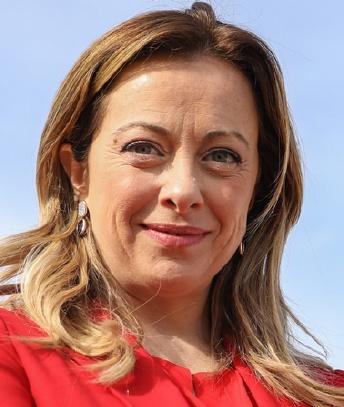
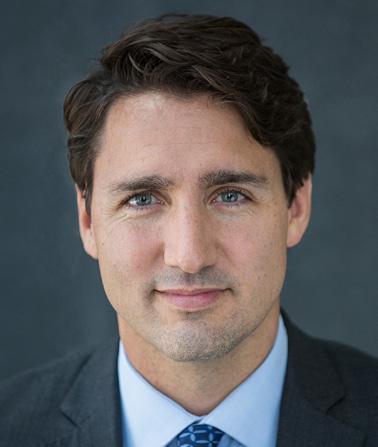
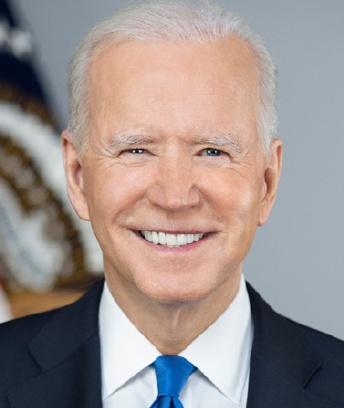
FOCUSES OF THE ITALIAN PRESIDENCY
Giorgia Meloni, prime minister, Italy
Justin Trudeau, prime minister, Canada
FUTURE FOR ALL Joe Biden, president, United States

24
John Kirton, director, G7 Research Group WELCOME MESSAGE
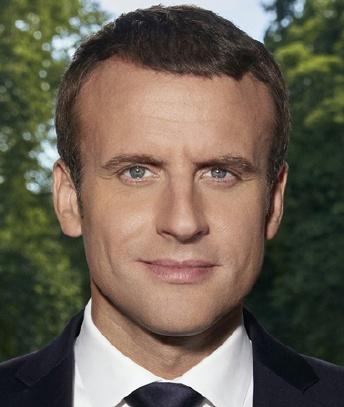
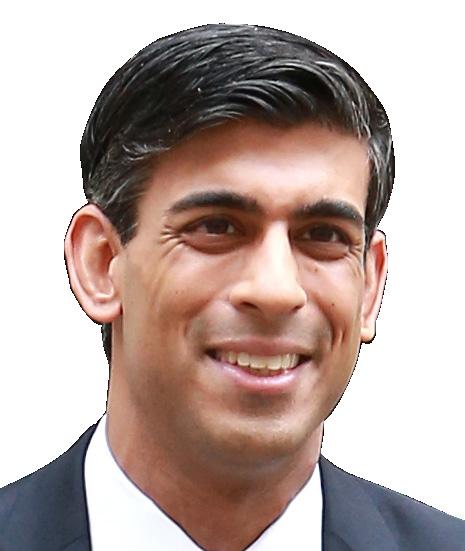
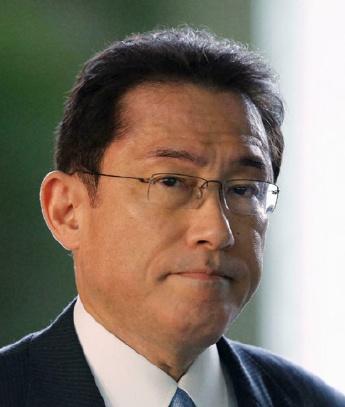
Emmanuel Macron, president, France
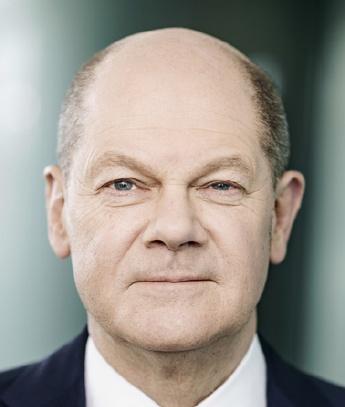
Rishi Sunak, prime minister, United Kingdom
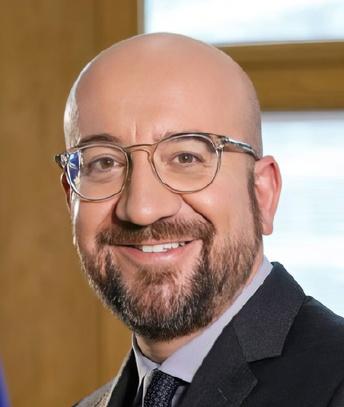
Olaf Scholz, chancellor, Germany
Charles Michel, president, European Council
THE FUTURE: OUR GLOBAL PARTNERSHIP
Fumio Kishida, prime minister, Japan
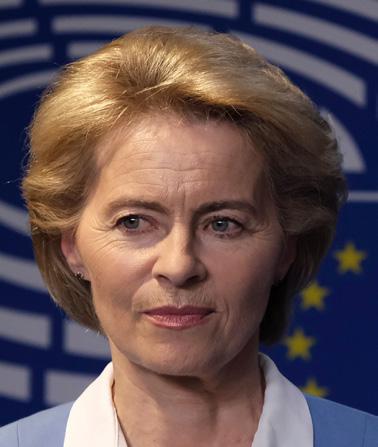
Ursula von der Leyen, president, European Commission
PROMISING PROSPECTS FOR THE G7’S APULIA SUMMIT
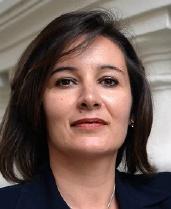
ACHIEVING ALIGNMENT
Chiara Oldani, professor of monetary economics, University of Viterbo ‘La Tuscia’

Jens Stoltenberg, secretarygeneral,
MOMENTUM

Rafael Mariano Grossi, director-general, International Atomic Energy Agency

PRESENTING A UNITED FRONT Ettore Greco, executive vice president, Istituto Affari Internazionale MIDDLE EAST AND GULF
LEADERSHIP AND MORAL COURAGE

Interview with Sanam Vakil, director, Middle East and North Africa Programme, Chatham House
G7 PERFORMANCE ON DEVELOPMENT

Sonja Dobson, lead researcher, G7 Research Group
BOLD NEW APPROACHES TO TRANSCEND BORDERS

Interview with Achim Steiner, Administrator, United Nations Development Programme

FOR AFRICA
Akinwumi A Adesina, president, African Development Bank Group
IN THE FACE OF COLD WAR 2.0

George S Takach, author, Cold War 2.0: Artificial Intelligence in the New Battle Between China, Russia and America
AND
THE RIGHT TO PEACE

Volker Türk, United Nations High Commissioner for Human Rights
INVEST IN THE FUTURE AND THE PRESENT WILL LOOK LESS BLEAK
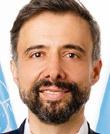
Alvaro Lario, president, International Fund for Agricultural Development
FERTILE SOIL FOR FOOD SECURITY
Cindy H McCain, executive director, World Food Programme

G7 PERFORMANCE ON HEALTH

LEARNING FROM OUR MISTAKES
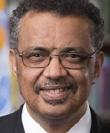
Tedros Adhanom Ghebreyesus, director-general, World Health Organization
POLY-OPPORTUNITY
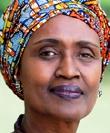
Winnie Byanyima, executive director, UNAIDS and under-secretary-general, United Nations 58
TRUST – THE BASIS FOR HEALTH AND DEMOCRACY

Ilona Kickbusch, founding director, Global Health Centre, Graduate Institute of International and Development Studies
60
CHANGING THE MINDSET
Vladimir Hachinski, Western University; Matilde Leonardi, Neurological Institute
C Besta, Elena Moro, Grenoble Alpes University, and Paul Boon, Ghent University and Eindhoven University of Technology




3MIGRATION, REFUGEES AND BORDER SECURITY
MIGRATION AND REFUGEES
62

G7 PERFORMANCE ON MIGRATION AND REFUGEES
Maria Zelenova, lead researcher, G7 Research Group
64
Hélène Emorine, senior researcher, G7 Research Group 54
PEACEKEEPING IS AN INVESTMENT
66
A PATH FOR MIGRATION TO WORK FOR ALL

Amy E Pope, director-general, International Organization for Migration
BORDER SECURITY
68
FIGHTING CRIME IN A FRAGMENTED LANDSCAPE

Jürgen Stock, secretary-general, INTERPOL
70
BEYOND THE SCREEN
Catherine De Bolle, executive director, Europol
72
NEW BARRIERS TO CROSS-BORDER CRIME


T Raja Kumar, president, Financial Action Task Force
74
FERTILE LAND FOR CRIME – AND REFORM

Denisse Rudich, director. G7 and G20 Research Groups (London) and CEO, Rudich Advisory
4
CLIMATE CHANGE AND ENERGY
CLIMATE CHANGE
76
G7 PERFORMANCE ON CLIMATE CHANGE

Brittaney Warren, director of compliance and climate change research, G7 Research Group
78

Filippo Grandi, United Nations High Commissioner for Refugees
AS STORM CLOUDS GATHER

Celeste Saulo, secretary-general, World Meteorological Organization
80 FOR A GREENER WORLD

Interview with Mafalda Duarte, executive director, Green Climate Fund
BIODIVERSITY AND POLLUTION
82
OUR BEST CHANCE FOR A SUSTAINABLE FUTURE

David Cooper, acting executive secretary, CBD Secretariat
84
ACTIONS ON NATURE REQUIRE ACTIONS ON ECONOMY AND SOCIETY

David Obura, chair, Intergovernmental Science-Policy Platform on Biodiversity and Ecosystem Services
ENERGY
86

G7 PERFORMANCE ON ENERGY
Ella Kokotsis, director of accountability, G7 Research Group
88
POWERFUL SIGNALS
Francesco La Camera, director-general, IRENA
90
TOWARDS TECHNOLOGICAL NEUTRALITY

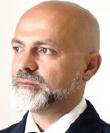
Francesco Corvaro, Italy’s special envoy on climate change
5ARTIFICIAL INTELLIGENCE AND DIGITALISATION
92
G7 PERFORMANCE ON DIGITALISATION

Hiromitsu Higashi, senior researcher, G7 Research Group
94
DIGITAL: THE GREATEST FORCE REDEFINING DEVELOPMENT

Interview with Doreen Bogdan-Martin, secretarygeneral, International Telecommunication Union
96
INTERNET GOVERNANCE IN THE DIGITAL WORLD

Sally Costerton, interim president and chief executive officer, ICANN
98
INTELLIGENT GOVERNANCE
Kenddrick Chan, LSE IDEAS, and Chris Alden, professor of international relations, LSE
100
THE BOTTOM LINE OF AMBITIOUS RULES



Interview with Marietje Schaake, international policy director, Stanford University Cyber Policy Center
6ECONOMIC AND SOCIAL SECURITY
MACROECONOMIC AND FINANCIAL POLICY
102
G7 PERFORMANCE ON MACROECONOMIC POLICY

Alissa Wang, senior researcher, G7 Research Group
104
BETTER POLICIES AND EFFECTIVE MULTILATERALISM: THE PATH TO A BETTER FUTURE

Mathias Cormann, secretarygeneral, Organisation for Economic Co-operation and Development
TRADE, INVESTMENT AND INFRASTRUCTURE
106
TRUST IN CUSTOMS
Ian Saunders, secretary-general, World Customs Organization
LABOUR AND EMPLOYMENT
108
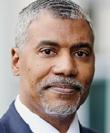
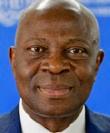
THE URGENT NEED FOR A RENEWED SOCIAL CONTRACT
Gilbert F Houngbo, director-general, International Labour Organization
GENDER SECURITY
110
G7 PERFORMANCE ON GENDER EQUALITY

Julia Kulik, director of strategic initiatives and public engagement, G7 Research Group
112
FEMINIST CLIMATE JUSTICE
Sima Bahous, executive director, UN Women

7TRAVEL, TOURISM AND CULTURE
114
THE POWER OF TRAVEL
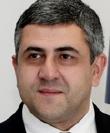
Zurab Pololikashvili, secretary-general, UN Tourism
116
LET THE GAMES BEGIN
Thomas Bach, President, International Olympics Committee

8A STRONGER G7 SYSTEM
118
AI PREDICTIONS ON G7 COMMITMENTS
120
G7 COMPLIANCE FROM HIROSHIMA TO APULIA
Samraggi Hazra and Ambra Bisagni, co-chairs, summit studies, G7 Research Group
122
THE G7, PAST AND PRESENT



Antonio Villafranca, director of research, and Matteo Villa, senior research fellow, Italian Institute for International Political Studies


Jessica Rapson, senior researcher, G7 Research Group
ADVOCACY FEATURES
08
ENI
Rising to the challenge: meeting energy needs
12
EY
The inflection point of supply chain, sustainability and tax: what does business need from government?
18
EUROPEAN SPACE AGENCY
Innovation in Earth observation brings benefits to all
36
WORLD FUTURE ENERGY SUMMIT Championing a sustainable planet for today and future generations

On January 1, 2024, Italy assumed, for the seventh time, the Presidency of the G7: the group that brings together Italy, Canada, France, Germany, Japan, the United Kingdom, and the United States of America. The G7, in which the European Union also participates, is united by common values and principles and plays an invaluable role in defending freedom and democracy and addressing global challenges …
A key focus of the Italian Presidency will be the defence of the rules-based international system. Russia’s war of aggression on Ukraine has undermined its principles and triggered growing instability, with multiple crises unfolding worldwide. The G7 will give equal importance to the conflict in the Middle East, with its consequences for the global agenda.
The relationship with developing Nations and emerging economies will be central. The engagement with Africa will be a key priority. We will work to build a cooperation model based on mutually beneficial partnerships, away from paternalistic or predatory logics. Particular attention will also be paid to the Indo-Pacific region.
Italy will ensure great attention to migration, together with some of the greatest challenges of our time, including the climate-energy nexus and food security. The G7 has the responsibility and duty to identify, together with its global partners, innovative solutions.
Artificial Intelligence will also feature in the Italian programme. This technology
can generate great opportunities but also enormous risks, affecting geopolitical balances. It is necessary to develop governance mechanisms and ensure that AI remains human-centered and human-controlled, giving concrete applications to the concept of algorethics. Welcome remarks, official website of Italy’s 2024 G7 presidency, 26 January 2024
… I’m working on a concrete and substantial G7 summit. We intend first and foremost to reaffirm the rules-based international order, defending freedom and building peace for Ukraine.
And, in doing this, I think we need to tackle the narrative that wants “the West against the rest”. So, our dialogue within the G7 with the Global South is essential.
The crisis in the Middle East is of the utmost concern. We need to coordinate our actions in order to avoid an escalation and, in this regard, we fully support the US mediation efforts.
The humanitarian crisis is our number one priority. Italy is concentrating its contribution on this. Meanwhile, we are cooperating with all regional actors that must be part of any future outcome. We should work together on concrete steps to guarantee the two-state perspective, which is the only long-term sustainable solution. And then, the Houthis’ attacks on commercial vessels that endanger freedom of navigation in the Red Sea are unacceptable …
Then, building on Italy’s role in the Mediterranean, the G7 will pay special

attention also to the African continent. We’ve been discussing it, many times, for I think we have to remember that Africa is not a poor continent; it is, on the contrary, incredibly rich in human and material resources, but it has been neglected and exploited with a predatory approach for a long time. I want to reverse this approach, together with you, which is also a root cause of the migration crisis. We need to support Africa’s development on an equal basis and put an end to illegal migration while fighting human trafficking. Human trafficking has become the most financially rewarding crime globally, and we cannot accept it any longer. For this reason, I came here today also with a proposal to launch a global alliance against human traffickers.
The G7 will discuss artificial intelligence as well. AI is a means, it can be a good or a bad one, it depends on our capacity to govern it, to tackle the risks and the impact it can have, for example on the labour market. We want to develop AI, but also we want to be certain that it remains human centered … White House, 1 March 2024

… Our goal is to put Italy back, on a political level, where our Lord already positioned us in geographical terms: a platform in the middle of the Mediterranean, a bridge between the European continent and the African continent. We have done this with Europe, we have done this with Africa and we have done this in our discussions within the Atlantic Alliance; we will do this as part of the Italian Presidency of the G7 during this very challenging year … States General of Italy, Brussels, 22 March 2024
… When it comes to artificial intelligence … This is one of the major issues we are addressing at [the] national level, and we are also bringing it to Italy’s Presidency of the G7, which as you know is this year. We of course want to do this by talking about and engaging on this issue with the scientific community, with major international players and with companies that produce generative artificial intelligence. We want to do this by endeavouring to give body and soul to the concept of ‘algorethics’, i.e., giving ethics to algorithms. We did not come up with this concept ourselves; this work began with a wonderful initiative organised by the Vatican in 2020. I believe this must be the compass that accompanies our work as a nation and clearly in multilateral fora, because these are not issues that nation states can tackle and solve alone.
Italian Scientists Association’s ‘La scienza al centro dello Stato’, 5 April 2024

Global leaders today must reconcile the priority of fighting climate change with supporting economic growth and development. While they strive to drive their countries to reach emissions goals, they must also ensure the competitiveness of their economies, as to do otherwise would potentially undermine the consensus around decarbonisation.
Technology will be key to delivering on the energy transition goals and enabling the creation of new businesses. Central to our vision for a sustainable energy future is the development of innovative and more sustainable value chains. Moreover, new, breakthrough technologies hold the promise of providing virtually limitless
To deliver on the energy transition, we must foster economic growth and technological innovation
energy. As a global energy technology company, Eni continues to invest in cutting-edge research and development to shape the energy system of the future, with the potential to provide safe and clean energy to the world, while, at the same time, improving the available and scalable technologies to preserve the competitiveness of the industry and the existing infrastructure.
We are accompanying the energy system through its transformation with strategic collaborations and a steadfast commitment to innovation. We are supporting this effort with a distinctive organisational and financial model, our ‘satellite model’, which entails creating separate companies that can independently access capital markets to accelerate the financing and roll-out of innovative solutions for decarbonisation.
In the short and medium term, the energy transition has to embrace a variety of initiatives and technologies which reduce emissions in different use cases while satisfying the existing demand.
As the world still relies overwhelmingly on fossil fuels, natural gas, whose combustion emits about half of the carbon
dioxide released by the burning of coal, can still play an essential role in the energy transition. Natural gas provides security and balance to the power system, necessary conditions for the growing penetration of intermittent renewables; their smooth integration into the existing industrial economy contributes to curb emissions and provide clean electricity.
Eni is partnering with hard-to-abate sectors to find the proper solutions for their decarbonisation path. Safeguarding the continuity of these industrial processes is a critical element to ensure the social and economic sustainability of the transition. Industries such as cement, steel and chemicals have a carbon footprint mainly related to their own industrial processes, rather than the forms of energy they use, and – as of today – they have limited solutions to decarbonise.
A practical way to substantially reduce their emissions is to capture the carbon dioxide generated from their operations and bury it in depleted reservoirs: this is the process called carbon capture and storage. CCS and its role in the decarbonisation of industrial clusters has been recognised by the most relevant international organisations such as the International Energy Agency, the Intergovernmental Panel on Climate Change and the International Renewable Energy Agency.
Eni is already involved in large scale CCS projects: HyNet in the United Kingdom and Ravenna CCS in Italy are the cornerstones of our commitment to playing a leading role in CCS, thanks to which we will collect the CO2 captured in industrial districts and pipe it into exhausted natural gas deposits thousands of feet below the seabed. The definition of dedicated institutional and fiscal frameworks for CCS is a key enabler to further incentivise these kinds of groundbreaking projects that are critical to address the climate challenge.
The decarbonisation of the transport sector is another crucial step towards net zero. Beside the progressive rollout of energy carriers such as electricity, biofuels play a critical role as a drop-in solution that can be already implemented with current technologies and infrastructures, especially for long-haul and heavy transport that is hard to electrify.
Eni has been advancing its unique vertically integrated feedstock strategy for
New, breakthrough technologies hold the promise of providing virtually limitless energy. As a global energy technology company, Eni continues to invest in cutting-edge research and development to shape the energy system of the future”

Claudio Descalzi has been the CEO of Eni, an integrated energy company operating in over 65 countries, since May 2014.
X-TWITTER @eni eni.com
the production of biofuels which involves communities, mainly in Africa, generating positive impacts on the local economy and employment. The model sees local farmers producing oilseeds, not in competition with the food chain, from marginal and degraded lands – identified in agreement with local authorities – to be then processed in dedicated agri-hubs before being used as feedstock for biofuel production.
Eni contributes to a just and equitable transition, striving to eliminate energy poverty. To this end, in the countries where we operate, we prioritise the local sale of gas resources and we develop energy infrastructures with the aim of generating long-term value for local populations and improving their access to energy. Moreover, we promote initiatives to boost economic diversification, education, health, water management and sanitation.
While pursuing our distinctive approach, we remain committed to maximising the engagement of our relevant stakeholders, such as governments, local communities and companies.
We strive to develop new successful businesses in a robust and competitive market to provide abundant, reliable low-carbon energy and decarbonisation solutions to our customers, in the context of a growing global population which will push further up the demand for energy.

We are in a moment of unprecedented challenge and change. Canada is feeling the weight of mounting global crises – from climate change to global instability to the weakening of democracies and democratic institutions. These are shared, transnational challenges. To tackle them, we must work together – including with the G7. Like-minded partners working side by side to make the world better, fairer and more inclusive is critical to addressing these unprecedented challenges.
G7 partners share deep-rooted democratic values that inform our common defence of international rules and how we work together to shape a global environment that protects our citizens and creates prosperity.
This work starts with the clean energy transition – a once-in-a-generation opportunity that Canada along with our G7 partners are helping lead: taking bold climate action will cut emissions, keep the air clean and create well-paying jobs. That begins with investing in research, infrastructure, supply chains and opportunities for our workers. Canada’s wealth of critical minerals, cutting-edge innovation and world-class talent pool make our country an ideal destination for investment. As an example, Canada’s auto sector has long been an engine of economic growth, driving innovation and employment. As the demand for electric vehicles continues to grow, we will attract even more investment and position our auto, battery manufacturing and battery material production industries as global leaders across the entire electric vehicle supply chain. Investments in climate action and clean energy are investments in the economy. It puts Canada at the forefront of this opportunity, creates jobs and brings direct economic benefits to Canadians, now and into the future. We are committed to partnering with other G7 members and beyond to ensure shared prosperity in this endeavour while protecting the environment, ensuring strong labour standards and respecting the rights of Indigenous peoples.
Digital technologies, including artificial intelligence, have great potential to transform our lives, economy and planet. AI could supercharge our efforts to achieve the 2030 Sustainable Development Goals, transforming global health and food systems.
Canada’s AI ecosystem puts us in the driving seat of this technology. We are working with G7 and other partners to make sure this innovation is a joint effort: we need to close digital divides, connect communities, improve digital literacy, increase awareness about misinformation and disinformation, and invest in cyber resilient systems. Digital inclusion means a broad approach to the governance of digital technology, writing the rules of the road for AI together, so that it works for us and not against us.
As more than half of the countries in the world have elections this year, the proliferation of misand disinformation, sometimes by foreign states, is eroding trust in democratic institutions. It is becoming increasingly difficult for our citizens to decipher fact from fiction and trustworthy sources from deceptive ones, especially in digital spaces. At the same time, the international rules-based order has been under threat in recent years. Russia’s illegal invasion of Ukraine was a direct attack on sovereignty, territorial integrity and human rights. In the face of Russia’s attack, Ukraine fought back and Canada’s support for Ukraine remains steadfast. Ukraine is fighting for its culture and identity, and for democracy – and Canada will stand with it for as long as it takes.

These challenges will test us and our collective resilience. But together, we can transform these challenges into opportunities. We can promote our democratic values, deepen our collaboration and take action to tackle these challenges. All of this work must be anchored in making life better for Canadians and people around the world. At home, it means working to create more jobs, fewer barriers and fairer communities. It also means building more homes, improving health care, investing in technology and fighting climate change.
This is Canada’s vision going into the Apulia Summit: promoting inclusive, sustainable and dynamic growth around the world that makes our communities fairer, better and more prosperous. And Canada is looking forward to taking the broader G7 agenda forward during our presidency in 2025. Working side by side with our G7 partners, we can make a more sustainable and equitable future a reality.
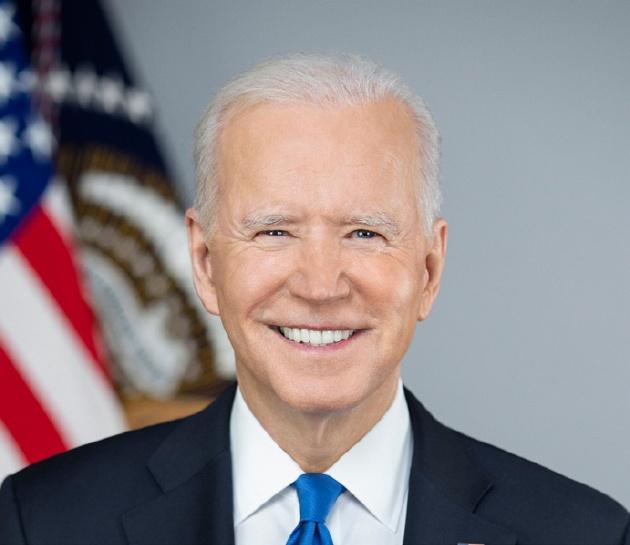
What makes our moment rare is that freedom and democracy are under attack, both at home and overseas, at the very same time.
Overseas, Putin of Russia is on the march, invading Ukraine and sowing chaos throughout Europe and beyond.
If anybody in this room thinks Putin will stop at Ukraine, I assure you, he will not. But Ukraine can stop Putin if we stand with Ukraine and provide the weapons it needs to defend itself. That is all Ukraine is asking … History is watching.
If the United States walks away now, it will put Ukraine at risk.
Europe at risk. The free world is at risk, emboldening others who wish to do us harm.
My message to President Putin is simple. We will not walk away. We will not bow down. I will not bow down.
America’s comeback is building a future of American possibilities, building an economy from the middle out and the bottom up, not the top down, investing in all of America, in all Americans to make sure everyone has a fair shot and we leave no one behind!
The pandemic no longer controls our lives. The vaccines that saved us from COVID are now being used to help beat cancer. Turning setback into comeback.
That’s America!
I inherited an economy that was on the brink. Now our economy is the envy of the world! 15 million new jobs in just three years –that’s a record!
Unemployment at 50-year lows.
A record 16 million Americans are starting small businesses and each one is an act of hope.
With historic job growth and small business growth for Black, Hispanic, and Asian-Americans …
We are the only nation in the world with a heart and soul that draws from old and new. Home to Native Americans whose ancestors have been here for thousands of years. Home to people from every place on Earth. Some came freely.
Some chained by force.
Some when famine struck, like my ancestral family in Ireland.
Some to flee persecution.
Some to chase dreams that are impossible anywhere but here in America.
That’s America, where we all come from somewhere, but we are all Americans.
We can fight about the border, or we can fix it. I’m ready to fix it …
We are also making history by confronting the climate crisis, not denying it.
I’m taking the most significant action on climate ever in the history of the world.
I am cutting our carbon emissions in half by 2030.
Creating tens of thousands of clean-energy jobs, like the … workers building and installing 500,000 electric vehicle charging stations.
Conserving 30% of America’s lands and waters by 2030.
Taking historic action on environmental justice for fence-line communities smothered by the legacy of pollution.
And patterned after the Peace Corps and Ameri Corps, I’ve launched a Climate Corps to put 20,000 young people to work at the forefront of our clean energy future.
I’ll triple that number this decade …
As we manage challenges at home, we’re also managing crises abroad including in the Middle East …
Israel has a right to go after Hamas.
Hamas could end this conflict today by releasing the hostages, laying down arms, and surrendering those responsible for October 7th.
Israel has an added burden because Hamas hides and operates among the civilian population. But Israel also has a fundamental responsibility to protect innocent civilians in Gaza.
This war has taken a greater toll on innocent civilians than all previous wars in Gaza combined …
Israel must allow more aid into Gaza and ensure that humanitarian workers aren’t caught in the cross fire …
Creating stability in the Middle East also
means containing the threat posed by Iran.
That’s why I built a coalition of more than a dozen countries to defend international shipping and freedom of navigation in the Red Sea.
I’ve ordered strikes to degrade Houthi capabilities and defend U.S. Forces in the region.
As Commander in Chief, I will not hesitate to direct further measures to protect our people and military personnel.
For years, all I’ve heard from my Republican friends and so many others is China’s on the rise and America is falling behind.
They’ve got it backward.
America is rising.
We have the best economy in the world.
Since I’ve come to office, our GDP [gross domestic product] is up.
And our trade deficit with China is down to the lowest point in over a decade.
We’re standing up against China’s unfair economic practices.
And standing up for peace and stability across the Taiwan Strait.
I’ve revitalized our partnerships and alliances in the Pacific.
I’ve made sure that the most advanced American technologies can’t be used in China’s weapons …
We want competition with China, but not conflict.
And we’re in a stronger position to win the competition for the 21st Century against China or anyone else for that matter …
I see a future where we defend democracy, not diminish it.
I see a future where we restore the right to choose and protect other freedoms, not take them away.
I see a future where the middle class finally has a fair shot and the wealthy finally have to pay their fair share in taxes.
I see a future where we save the planet from the climate crisis and our country from gun violence.
Above all, I see a future for all Americans! … State of the Union Address, 7 March 2024
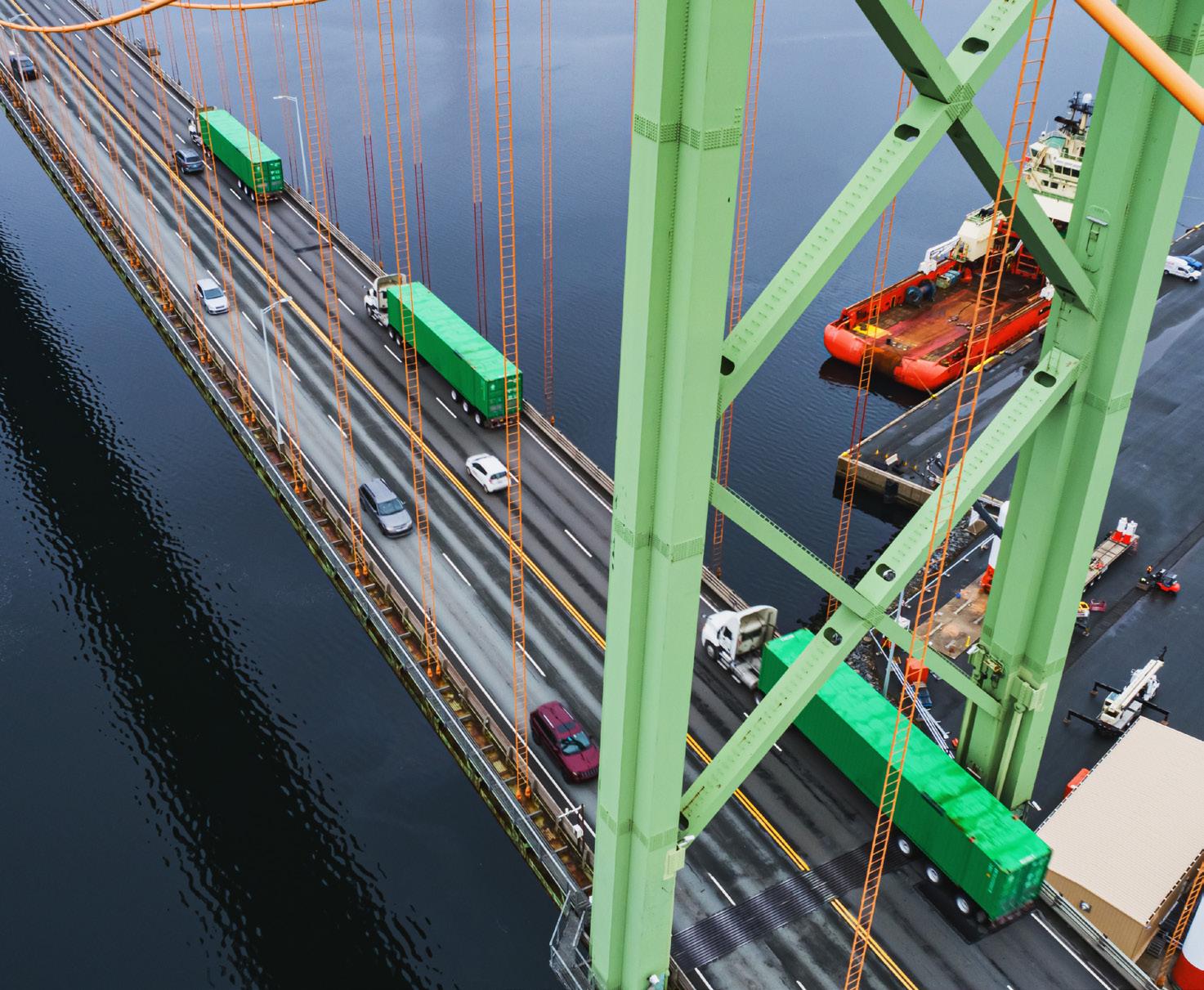
The G7 is setting multiple goals and policies to deal with a variety of issues including global trade disruption, geopolitical upheaval and climate change challenges. Businesses tasked with compliance and implementation of policies designed to meet these goals face substantial pressure to transform supply chains in response. Both governments and businesses need to understand each other’s goals and perspectives if these policies are to succeed. This is particularly true when evaluating the interaction of supply chains, sustainability and tax.
SUPPLY CHAIN MODELS IN THE NEW ERA OF GEOPOLITICS
The complex distribution of power globally is a defining feature of today’s geopolitical environment, and it has profoundly changed the landscape for global investment, technology transfer and trade. Blocs involving North America, the European Union and China are transforming global supply chains into more regionalised systems. Wars and renewed superpower rivalries are also driving change, as seen in the recent upheaval in global sea-lane traffic that challenges the stability of markets and economies.
The G7 is working hard to tackle a host of global issues ranging from geopolitical upheaval to climate change. As businesses respond to the new taxes and trade regulations designed to help meet the challenges, they are transforming their supply chains in ways that support global goals while managing and leveraging the new policies and tax implications. Their one big ask of governments: reassurance that they will provide clear enough guidance so that success is everyone’s to share
ByMarna Ricker, global vice chair – tax, EY, and Jay Camillo, global operating model effectiveness (OME) leader, EY, with contribution from Joost Vreeswijk, global tax sustainability and supply chain leader, EY
At a macro level, government policies affecting investment in supply chains are usually influenced by various interconnected public policy goals, including:
• Managing national security by enabling a stable local supply of vital goods, for example steel, active pharmaceutical ingredients and semiconductors
• Fostering domestic resilience with nearshore and friendly-shore supplies of critical goods in case of globalised supply chain disruption
• Increasing employment through onshoring
• Addressing environmental concerns by using fiscal and tax policy to support green industries and circular business models, and to reduce disposal and transportation waste.
Environmental concerns – and efforts to address them – have been the focus of the most active policymaking initiatives, but all these goals are likely to have a major influence on future supply chains.
A surge of fiscal initiatives supporting the United Nations Paris Agreement’s global goal of net-zero emissions by 2050 is prompting companies to take action and play a meaningful role. Businesses are considering how to balance the new fiscal subsidies and incentives with the new liabilities from indirect tax, tariffs and customs. Clear government policy related to these “carrots and sticks” is vital to helping businesses advance social responsibility and meet commercial targets.
The EU’s Carbon Border Adjustment Mechanism (CBAM), the new Corporate Sustainability Due Diligence Directive (CS3D) and the Indo-Pacific Framework for Prosperity (IPEF) supply chain agreement are prominent regional examples of clear policy.
The EY Green Tax Tracker cites more than 2,000 taxes and levies and 1,000 incentives that support sustainability. And these will all have implications for business decisions about supply chains, product configuration, sourcing and manufacturing.
CBAM, for example, will have profound implications for supply chains in carbon intensive industries. Specifically, new import fees could impel companies to
shift manufacturing in industries such as cement, steel and paper into EU members or to other “green” nations.
In addition, governments are asking businesses to monitor their supply chains so that they can recycle, reuse and repurpose products. This circular business model can only be delivered with a supply chain strategy that brings products back at the end of their lifespan to recycle or re-manufacture, eliminating waste and avoiding costly surcharges. Some EU countries are introducing minimum levels of recycled content in, for example, consumer electronics. Meanwhile, the garment industry, supported by incentives, is investing in biodegradable fabrics and alternative source material to boost circularity.
Global guidelines from the World Trade Organization, International Monetary Fund, Organisation for Economic Co-operation and Development and UN are meant to build business confidence in government support, fostering freer and more open investment and trade, in the hope that countries enact statutes and regulations consistent with these rules.
Transparency is a result of clearly defined laws, regulations and enforcement procedures. CBAM as well as the US CHIPS and Science Act, Inflation Reduction Act and the EU Industrial Plan are examples of initiatives that build corporate confidence.
Tax reforms such as the OECD’s Global Minimum Tax, by contrast, add more complexity to designing supply chain strategies and capital allocation options. And if tax were to become a sustainability topic under the EU’s Corporate Sustainability Reporting Directive, it would likely demand even greater transparency in terms of reporting obligations that companies face.
The flurry of sustainability regulation and associated costs make foreign direct investment decisions more complex. Businesses undertaking this kind of transformation need confidence in policies, particularly when they’re working across borders. They need governmental reassurance in five significant areas:
• Rule of law: protection of corporate investments, especially against the expropriation of property
• Regulation: clarity and transparency with administrative remedies in case of disputes
• Foreign exchange: stable foreign exchange and cash repatriation regimes for financial, operational and tax considerations
• Trade: relative openness to imports

Marna Ricker is global vice chair – tax at EY. She leads a global practice of 80,000 tax and law professionals, driving strategy, services and operational transformation. She champions innovative client service, where technical expertise meets technology and business outcomes. Her leadership fosters high performing, collaborative teams and excellence in tax and finance industries.
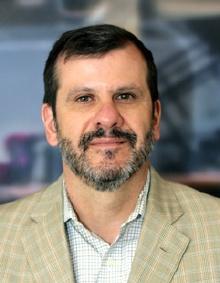
Jay Camillo is global operating model effectiveness leader at EY. He is a member of Ernst & Young LLP’s International Tax Services Transfer Pricing National Tax Department group. Jay has managed numerous global operating model projects. Prior to EY, he has worked as a consultant with the Advisory Board Company and was also an international trade specialist for the US International Trade Administration’s Office of the North American Free Trade Agreement.

Joost Vreeswijk is global tax sustainability and supply chain leader at EY. He focuses on designing and implementing transformational sustainable operating models that help deliver strategy, purpose and bottom line for businesses. He and his broader team help companies navigate the green tax and incentives landscape, and implications of sustainable transformation from a tax, legal, supply chain and transfer pricing perspective.
and exports via free trade agreements
• Tax: income tax rates and double tax treaties
• There is also a growing need for business and governments to have better data and analytics.
Data has become the fundamental ingredient for improving tax collection and audit systems; enhancing corporate compliance and efficiency; and informing complex decisions, both public and private.
There have been significant developments in expanding data useability. Businesses are, for example, investing in developing advanced technologies, including generative AI, to manage supply chains and increasingly complex tax, customs and regulatory reporting requirements.
But there is a need for further advances. Governments already use artificial intelligence for multiple purposes, including tracking trade flows, monitoring tax compliance, ensuring national security and conducting scenario analyses for a myriad of issues. AI progress in other areas such as weather, infrastructure, transportation, the power grid, and natural resources could help companies to modify supply chain footprints to drive efficiencies in planning, sourcing, making and moving goods.
A mutual focus by governments, NGOs and private corporations on innovating through AI can enhance the efficiency of compliance while underpinning the power, agility and skill that comprise success in today’s working world.
Emerging supply chain regulations rely on end-to-end supply chain visibility. But most companies struggle to capture, process and report necessary data, especially externally.
As businesses work to support these initiatives and progress towards sustainability goals, governments must set them up for success by affirming the rule of law, reinforcing transparency, protecting foreign direct investment and using taxes and incentives in a balanced way to support supply chain transformations. Only then can there be confidence in efforts to accelerate the world’s sustainable supply chains.
The views reflected in this article are the views of the author and do not necessarily reflect the views of the global EY organisation or its member firms.

Yes, we are at a pivotal moment, and our Europe is mortal. But the outcome depends on us, as [shown by] some very simple observations to highlight how serious my words are …
The first thing is to scale up defence. Today, the main danger to European security is clearly the war in Ukraine. A sine qua non condition for our security is that Russia does not win the war of aggression it is waging on Ukraine. This is essential. That is why we have been right from the outset to impose sanctions on Russia, to help the Ukrainians and to continue to do so, and we have been fortunate to have the Americans on our side for this, as we constantly increase our aid and support …
Each Member State stands up for diplomacy, it is our responsibility. But we can increase it and base it on wider European cohesion. It is for this reason that I think we must keep moving forward in the years ahead, in addition to this approach and this security and defence awakening. We must continue to form partnerships with third countries, in other words to build a Europe which can show that it is never the vassal of the United States and that it can talk to other world regions, to emerging countries, to Africa, to Latin America. Not just through trade agreements, but through genuinely balanced and reciprocal strategic partnerships.
That is what we wanted to build at the EU-Africa Summit from the first half of 2022 up to the EU-Indo Pacific Strategy. To show that we are a balanced power which communicates with the rest of the world and, in a way, rejects the bipolar
confrontation in which too many continents are engaging. Our strategies for the Arctic, Indo-Pacific, Latin America and with Africa show that Europe is not simply part of the West, but a global continent which is considering its universality and the major balances of the planet, which is rejecting continental confrontation and wants to build balanced partnerships.
This is absolutely essential and we must continue along this path which allows us, on the issues of education, health, climate and alleviating poverty, to have a single voice, as we did with the Pact for Peoples and the Planet. And to show that we never apply double standards and that, here too, we are fully autonomous.
A powerful Europe is also one which has control over its borders. I said that when speaking about the Pact on Migration and Asylum, which was a major step forward. But I want to reiterate it now, at a time when, as we all know, the issue of borders and immigration is a genuine concern in all our societies and countries. This is all the more important for France because, if I may use a somewhat technical term, it is a country of secondary movements. In [other] words, immigrants do not arrive directly in France, they arrive in Europe and particularly in the

And so France, sometimes more than others, needs an effective European policy and strong cooperation because immigration begins at the borders of Europe and not simply those of France. Men and women who arrive in France are fleeing poverty, are sometimes victims of people smuggling networks, some are genuine asylum seekers when they are fighting for freedom, but they always
initially arrive in Spain, Italy, the Balkans and Greece. They arrive on European soil and then make their way to France. And so in France, no doubt more than elsewhere, we need stronger European cooperation. That is why now that we have this Pact on Migration and Asylum, we must implement it, because it provides us with new instruments. There will be more effective registration, monitoring and conditions for returning to the country of first entry. That in itself is an unprecedented step forward. But we must take firmer action with regard to return operations and readmission for all men and women arriving in France who are not entitled to remain here, who are ineligible for asylum. To do this, we need a genuine European policy and genuine coordination. This can be achieved through greater cooperation with countries of origin and transit, stricter conditions and an unwavering combat against the economic model of smugglers and traffickers of human beings …
The second key part of the response is prosperity … First, we must produce more and green, and decarbonized production is an opportunity for us to reindustrialize and maintain our industries in Europe. And in fact we have seen this in recent years: from hydrogen to semi-conductors to electric batteries, France has recreated industrial capacity through the green transition. And so we must stop viewing decarbonization and growth as being mutually exclusive. If we do it properly and if it takes place through new investment sectors, it works, and that is the model we are advocating. We are becoming leaders in the battery sector. The objective for European batteries to cover all our needs by 2030 will be met. And we will also bridge the gap in terms of semi-conductors, with the objective of doubling Europe’s market share by 2030. And as I was saying, from Dunkirk to Fos, we can see the results as regards training, economically attractive and innovative territories, and reduced dependencies. And so it is Europe which enables and supports green reindustrialization, and that is how we will regain capacities, and become the first zero plastic pollution continent, a continent at the heart of decarbonization and electrification … Europe Speech, 25 April 2024
My first duty as Prime Minister is the security of the British people …
We have entered a period of history in which competition between countries has sharpened profoundly.
An axis of authoritarian states with different values to ours … like Russia, Iran, North Korea, and China … are increasingly assertive.
The danger they pose is not new.
But what is new is that these countries –or their proxies are causing more instability, more quickly, in more places at once.
And they’re increasingly acting together making common cause in an attempt to reshape the world order.
Now I know there are some people who will think these are faraway problems.
But they are not.
They pose real risks to the United Kingdom’s security and prosperity.
Russia has already poisoned people on British soil with chemical weapons.
Caused energy bills to soar.
Weaponised migration.
And sent technology to Iran in exchange for weapons, like the Shaheed drones that I saw myself are wreaking such devastation on Ukraine.
Iran themselves have threatened to kill
campaigns against British MPs.
China itself is engaged in a huge military modernisation programme.
Potential flashpoints in the Indo-Pacific could have an impact on the global economy far larger even than Covid.
And China is increasingly working with others to try and reshape the world including their so-called ‘unlimited partnership’ with Russia.
So the new assertiveness of these authoritarian states far from our shores must concern us.
Because they are increasingly acting together against the fundamental values that we all hold dear of democracy, freedom, and the rule of law …
I believe we must do more to defend our country, our interests, and our values.
So today, I’m announcing the biggest strengthening of our national defence for a generation.
We will increase defence spending to a new baseline of 2.5% of GDP [gross domestic product], by 2030.
That starts today.
And rises steadily in each and every year.
Over the next six years, we’ll invest an additional £75bn in our defence.
And it will be fully funded with no increase in borrowing or debt …
We have a clear plan for what we’ll spend, when we’ll spend it, and how we pay for it.
A plan that makes the United Kingdom by far the largest defence power in Europe – and second largest in NATO [North Atlantic Treaty Organization] …
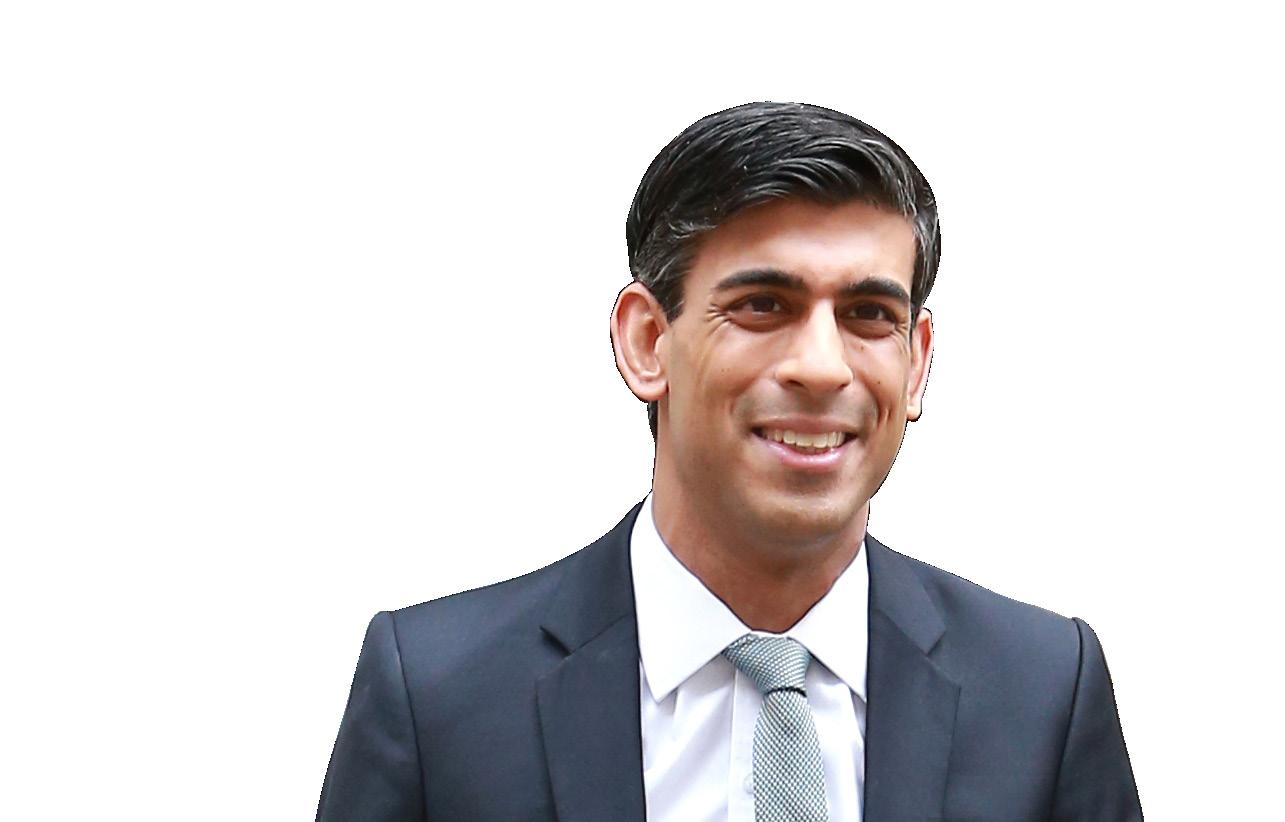
We must support Ukraine for the long term.
Since the Cold War ended, the freedom of our continent has been based on a
That it is for people to decide the fate of their countries, not foreign
But allow Putin to win in Ukraine and that principle of sovereignty
We would be dragged back to a world where brute force, rather than the democratic will of free peoples would shape borders and decide
And Putin will not stop in Ukraine.
Win there, and he – and indeed others – will be emboldened.
He has the desire, if not yet the capacity, to attack other countries in Europe potentially including NATO allies, who we would be bound to defend just as they are bound to defend us.
The costs of failing to support Ukraine now will be far greater than the costs of repelling Putin.
Because only if he fails will he and other adversaries be deterred.
That is why the United Kingdom whose history of standing up to dictators is so much part of our national consciousness has come together with our allies to stand with Ukraine from the very start.
Today we will go further.
We will send Ukraine an additional half a billion pounds, hitting £3 billion of support this year.
And we’ll provide them with the largest-ever package of UK military equipment …
A decade ago, as Russian tanks rolled into Crimea and the fight against ISIL raged across the Middle East, NATO allies came together in Wales, and reached an historic agreement to increase their defence budgets to 2% of GDP.
Back then, the UK was one of only 4 countries who did so. Today, there are 11.
And I believe we will look back on this moment as a similar turning point in European security.
Because for all that we welcome the news over the weekend that the US Congress agreed a new package of aid for Ukraine support that will be indispensable on the frontline this is not the moment for complacency.
We cannot keep expecting America to pay any price or bear any burden if we ourselves are unwilling to make greater sacrifices for our own security.
So I’m proud that the United Kingdom is increasing our defence spending to £87bn a year, the biggest strengthening of our national defence in a generation guaranteeing our position as the second largest defence power in NATO, after the US.
All across Europe, countries like Poland, Germany, Norway and the Baltic nations are stepping up to take greater responsibility for our own security.
And I’m confident that whether in months or years, others will follow, too …
Speech in Warsaw, Poland, 23 April 2024
Our world is at history’s turning point. The post–Cold War era is already behind us, and we are now at an inflection point that will define the next stage of human history.
The international order that the U.S. worked for generations to build is facing new challenges, challenges from those with values and principles very different from ours.
Freedom and democracy are currently under threat around the globe.
Climate change has caused natural disasters, poverty, and displacement on a global scale. In the COVID-19 pandemic, all humanity suffered.
Rapid advances in AI [artificial intelligence] technology have resulted in a battle over the soul of AI that is raging between its promise and its perils.
The balance of economic power is shifting. The Global South plays a greater role in responding to challenges and opportunities and calls for a larger voice.
Turning to Japan’s own neighborhood, China’s current external stance and military actions present an unprecedented and the greatest strategic challenge, not only to the peace and security of Japan but to the peace and stability of the international community at large.
While such a challenge from China continues, our commitment to upholding a free and open international order based on the rule of law, as well as peace, will continue to be the defining agenda going forward.
remains a critical issue.
North Korea’s provocations have [an] impact beyond the region. It has also exported its ballistic missiles to support Russia’s war of aggression against Ukraine, greatly increasing the suffering of the Ukrainian people.
Russia’s unprovoked, unjust, and brutal war of aggression against Ukraine has entered its third year. As I often say, Ukraine of today may be the East Asia of tomorrow. Furthermore, Russia continues to threaten the use of nuclear weapons, which has contributed to worldwide concern that yet another catastrophe by nuclear weapon use is a real possibility. In this reality, close coordination between Japan and the U.S. is required more than ever to ensure that the deterrence our Alliance provides remains credible and resilient.
New forms of oppression are being imposed on the world. Freedom is being suppressed through digital technologies. Social media is censored, monitored, and controlled. There are growing cases of economic coercion and the so-called “debt trap” diplomacy, whereby the economic dependency of nations is exploited and weaponized.
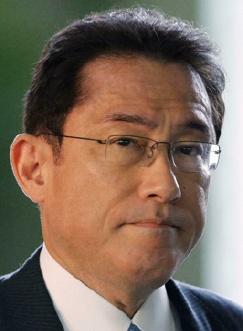
As a Hiroshima native, I have devoted my political career to bringing about a world without nuclear weapons. For years, I have worked to revitalize the Non-Proliferation Treaty regime so that we can gain momentum in pursuit of the aspiration. But there exists an imminent danger of nuclear weapons proliferation in East Asia. North Korea’s nuclear and missile program is a direct threat. The issue of abductions by North Korea
Facing such rapidly-changing pressures, how do we continue to safeguard our common values? …
Japan has changed over the years. We have transformed ourselves from a reticent ally, recovering from the devastation of World War II, to a strong, committed ally, looking outward to the world.
Japan has transformed its national security strategy. Uncertainty about the future stability of the Indo-Pacific region caused us to change our policies and our very mindset. I myself have stood at the forefront in making our bilateral alliance even stronger.
In 2022, we announced that we would secure a substantial increase of our defense budget by FY [fiscal year] 2027 to 2% of GDP [gross domestic product], possess counterstrike capabilities, and improve cybersecurity. Today, the
deterrence that our Alliance provides is stronger than ever, bolstered by U.S. extended deterrence for Japan.
Japan has taken strong sanctions against Russia in the wake of its aggression against Ukraine. We have announced over $12 billion in aid to Ukraine, including anti-drone detection systems. This is part of NATO’s [North Atlantic Treaty Organization’s] aid package, and, yes, we are even working with NATO on the other side of the world from us.
I might add that in February, to help a devastated Ukraine get through these agonizing times, I hosted the conference for Ukraine’s economic growth and reconstruction. Japan will continue to stand with Ukraine.
As the geopolitical landscape changed and as Japan grew in confidence, we expanded our outlook beyond that of being America’s closest ally…
Today, our partnership goes beyond the bilateral. Examples include trilateral and quadrilateral cooperation among the U.S., Japan, the Republic of Korea, Australia, India, and the Philippines as well as cooperation through the G7 and with ASEAN [Association of Southeast Asian Nations]. The three leaders of the U.S., the Republic of Korea and Japan convened at Camp David last summer to inaugurate a new era of our partnership.
From these various endeavors emerges a multi-layered regional framework where our Alliance serves as a force multiplier. And, together with these likeminded countries, we are working to realize a Free and Open Indo-Pacific …
I am embarking on a set of initiatives called a New Form of Capitalism to drive the Japanese economy. The public and private sectors are joining hands to transform the social challenges we face into engines of growth. Wage increases, capital investment, stock prices – all have attained levels not seen for thirty years. The Japanese economy is now making strides by capitalizing on these unprecedented and major changes. A growth-oriented Japanese economy should also spur even greater investment in the United States. And we can then help boost the global economy to steer it toward a strong growth trajectory in the years to come.
Address to a Joint Meeting of the United States Congress, 11 April 2024
The biggest land war in Europe since the Second World War has been raging in Ukraine for two years now. Every day, Russia’s aggression claims innocent victims. Every day, people cry, grieve and die in Ukraine …
Despite huge losses, significant parts of the Russian armed forces remain intact. Russia has been preparing its troops for this war for many years, and has developed new, lethal weapons systems at all levels. The Russian economy has long since been operating in war mode. To all intents and purposes, Putin has brought the economy, education, science and culture in Russia under his control. Anyone who actively works for freedom and democracy has to fear for their life. What that means is shown by the shocking, the appalling, news of Alexei Navalny’s death in Russian detention. Not least, Putin is sending ever more troops to the front …
What does all of this mean for us? What must it mean for NATO [North Atlantic Treaty Organization] and for Europe?
Two things are key in my view.
First of all, the threat from Russia is real. That is why our deterrence and defence capabilities have to be credible and remain credible. At the same time, we don’t want a conflict between Russia and NATO. For that reason, all countries supporting Ukraine have been in agreement since the start of the war that we will not send our own troops to Ukraine.
However, Putin and the military establishment in Moscow must be left in no doubt that we, the world’s strongest military alliance, are able to defend every square metre of our Allied territory. For that, it’s important that we further strengthen NATO’s European pillar, also in the sphere of deterrence …
For regardless of how Russia’s war in Ukraine ends, and regardless of the outcome of elections on either side of the Atlantic, one thing is crystal clear: we Europeans must do much more for our own security – now and in the future. Our readiness to do so is considerable …
My second point concerns our support for Ukraine. The European Union and its member states have made available just under 90 billion euro for this purpose so far. On top of that will come the additional 50 billion euro in financial assistance alone that we’ve just agreed on for the coming years. In the European Union, we have taken in more than four million Ukrainian refugees – one million of them here in Germany. All of this was and still is the right thing to do …
It is true that this war at the heart of Europe is making huge demands of us as well. Yes, the money we spend now
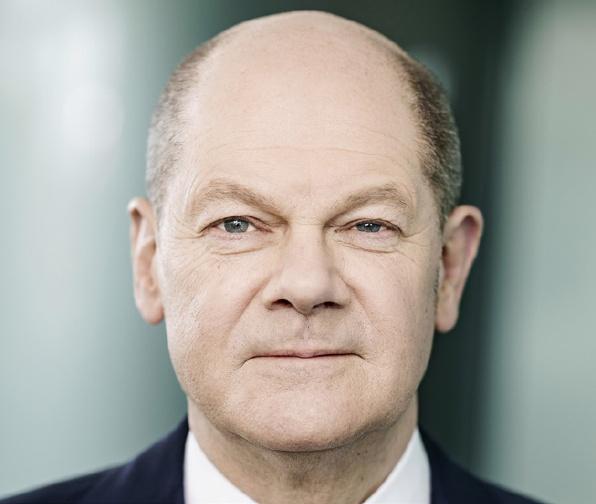
and in the future to ensure our security is then lacking elsewhere. We are noticing that. However, I would also say this: without security, all else is nothing. Only if we all provide the necessary finance, in the long term and in a spirit of solidarity, will our defence industry reliably increase production. And thereby also contribute to our own security.
Since the start of the war, the United States has provided Ukraine with … over 20 billion dollars a year in military assistance – with a gross domestic product of 28 trillion dollars. A similar effort must surely be the least that can be expected from every European country. After all, we are talking about the biggest threat to security on our continent, about a war here in Europe – albeit one with global repercussions. Only if we are credible in this regard will Putin understand that there will be no peace dictated by Moscow, because we will not allow it …
We stand more united than ever. Sweden and Finland have decided to join NATO. We have adopted new defence plans in NATO. In Germany, we have enshrined in our constitution a special fund of 100 billion euro for the Bundeswehr. Some 80 percent of this has now been committed. Defence Minister [Boris] Pistorius and I have decided to station a German combat brigade permanently on NATO’s eastern flank, in Lithuania. The NATO summit in Washington in July will show how much Europe is now contributing to the security of the Euro-Atlantic area. That is good news as we mark 75 years of the Alliance.
Russia, by contrast, has not attained a single one of its goals in this war. Putin wanted to take Kyiv in two weeks. Two years on, Ukraine has liberated over half of the territory occupied by Russia. Russia has lost control over the western Black Sea. This is thanks first and foremost to the Ukrainian armed forces. I have the utmost respect for their courage and their hard-fought successes! However, support from all of us has played a part. And that should be an incentive for us now, not to ease up. But rather to continue resolutely on this path. Germany is precisely that: resolute. And at the same time grateful for our united stance, today and in the future.
Munich Security Conference, 17 February 2024
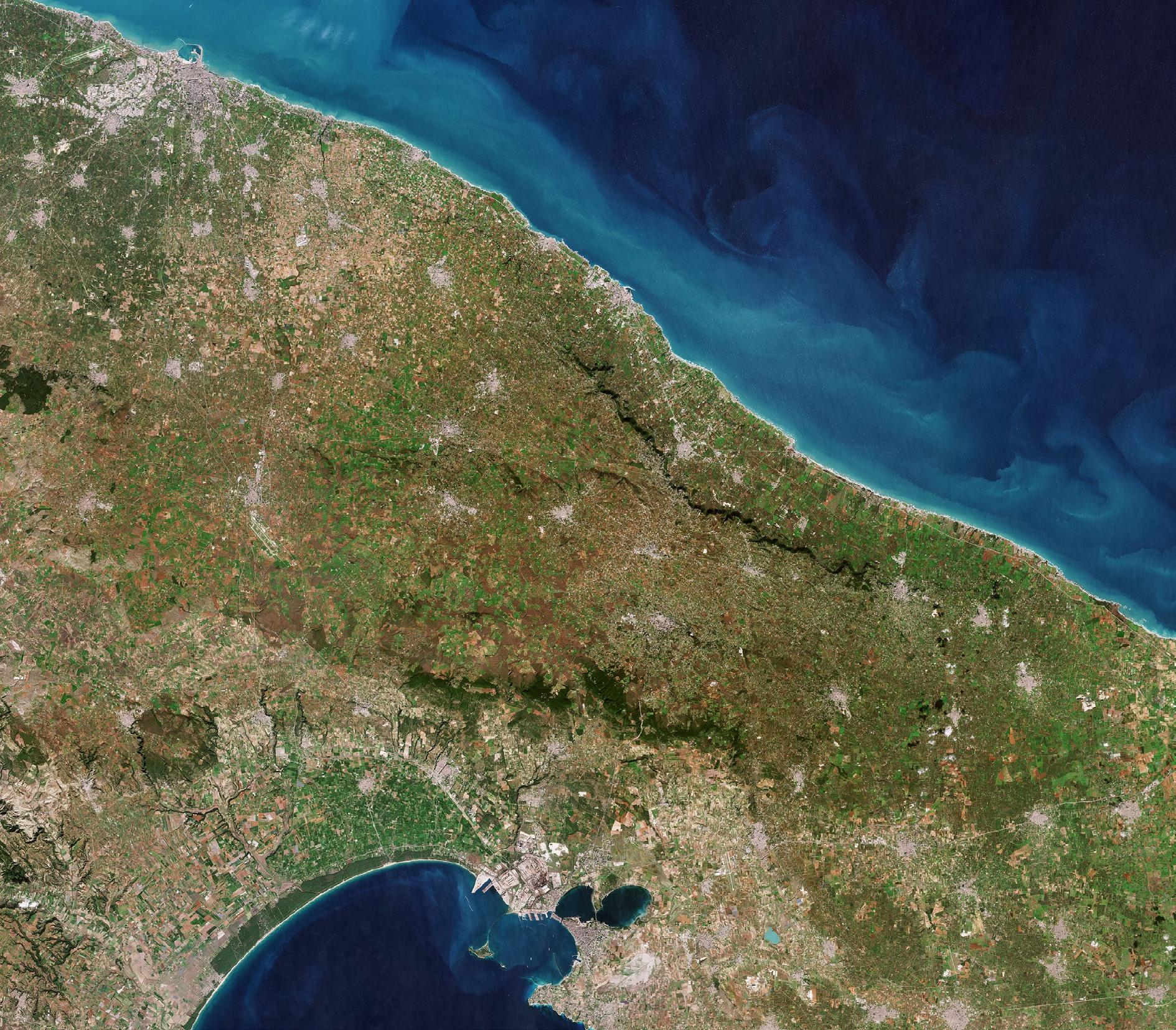 By Josef Aschbacher, director-general, and Simonetta Cheli, director of Earth observation programmes, European Space Agency
By Josef Aschbacher, director-general, and Simonetta Cheli, director of Earth observation programmes, European Space Agency
Earth observation satellites have proven to be a game changer, helping us better understand the complexities of our planet while also responding to the pressing challenges we face relating to the environment, climate change and sustainability. Satellite data are not only used to answer crucial Earth science questions, but also, importantly, to forecast the weather and assist when disaster strikes, to provide essential information to optimise, for example, agricultural practices, water management and the siting of renewable energy plants, and to address issues such as maritime safety.
The latest innovations in Earth observation hold exciting promise to significantly advance our ability to overcome global environmental and sustainability challenges
With satellite data now forming the basis for evidence-based decision making and countless everyday applications, the need for information is growing at an ever-increasing rate. The European Space Agency, a world leader in Earth observation, is steadfastly dedicated to fostering the development of the cutting-edge spaceborne technology needed to further understand the planet,
improve the daily lives of citizens and support effective policymaking for a more sustainable future, while also benefiting businesses and economies across the world.
Space-based systems have seen significant advances in recent years, driven by technological innovation and the increasing demand for accurate, timely and comprehensive data about our planet. These innovations span various areas, including satellite technology, data processing and information sharing. Copernicus – the world-leading Earth observation system and a key part of the European Union’s Space Programme –is the result of many of these advances. Copernicus provides accurate, timely and easily accessible information, available free of charge for a wide range of ‘operational’ services and users, as well as enabling improved management
of the environment, understanding and mitigation of the effects of climate change, and ensuring civil security.
Complementing Copernicus, the development of high-resolution imaging satellites equipped with advanced sensors capable of capturing images of Earth’s surface in unprecedented clarity and detail has given rise to multiple new applications for urban planning and crop monitoring.
Additionally, the emergence of small satellites has made the development of Earth observation solutions far more accessible. This is enabling researchers, start-ups and even students to participate in monitoring and understanding our planet through cost-effective approaches for specific applications such as pollution monitoring and maritime surveillance.
The ongoing development of data-sharing platforms and collaboration initiatives has facilitated the exchange of Earth observation data among governments, organisations and researchers worldwide. Open-data policies and cloud-based platforms, such as ESA’s Sentinel Hub, provide easy access to a wealth of satellite imagery and related datasets, fostering innovation and collaboration for research and applications.
One of the most exciting developments in trying to ensure the fullest advantage can be taken from the wealth of Earth observation satellite data has been the convergence of artificial intelligence solutions with the Earth observation domain. ESA’s Φ-lab, which aims to accelerate transformational innovation, has been investigating the use of AI to enhance the way the planet is monitored and understood.
AI enables the identification of key features and the extraction of actionable insight from satellite data. In particular, machine learning, a branch of AI, offers a powerful way of handling huge quantities of data. When applied to the processing of data en masse, machine learning excels in extracting information to classify land cover, monitor crops and deforestation, and track urban development and population movements. Machine learning and Earth observation data models have been used, moreover, to forecast dengue outbreaks.
Converting disruptive technologies such as generative AI, which augments datasets
With satellite data now forming the basis for evidence-based decision making and countless everyday applications, the need for information is growing”
when observations are limited, represents a major step forward.
Generative AI models combined with satellite data can mimic real-world
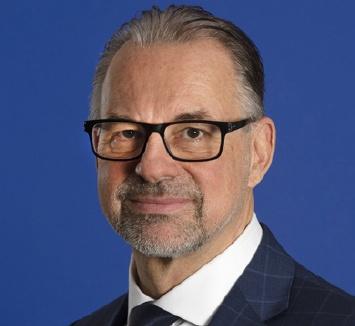
Josef Aschbacher, director-general of the European Space Agency, holds a PhD in natural sciences from the University of Innsbruck and has a long international career in space, at ESA, the European Union and the Austrian Space Agency.
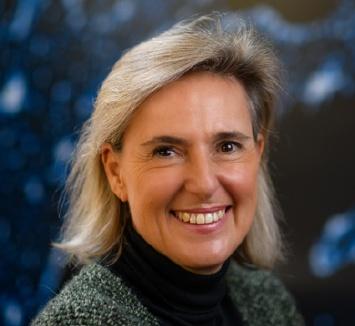
Simonetta Cheli, director of Earth observation programmes at ESA, studied law and economics at Yale University before earning a political science degree in international space law at Florence University. She has worked at ESA for over three decades.
X-TWITTER @esa esa.int
physical processes via a digital replica of the Earth – a digital twin. Yielding a deeper understanding of the physical world, a digital twin of Earth could be used to simulate and reimagine, for example, existing urban centres in different climate and air quality scenarios based on global climate projections and national air pollution policy regulations. The outcomes of these simulations are crucial to providing valuable information to enhance climate adaptation efforts and reduce human-induced greenhouse gas emissions to ensure the health of people, animals and ecosystems.
In order to facilitate work on a digital twin of Earth, ESA is also investigating the combination of AI and quantum computing techniques. Although in their nascent stages, quantum computers have garnered considerable attention from the scientific community owing to their potential to perform computations that are beyond the reach of conventional computing systems. This feature is especially important for the analysis of high-resolution satellite images and the modelling of complex systems such as the climate.
In conclusion, the latest innovations in Earth observation, including advances in satellite technology, AI and machine learning, new imaging techniques, small satellites and data-sharing platforms, are significantly enhancing our ability to monitor, understand, predict and address environmental, climate and sustainability challenges on a global scale. These innovations hold great potential to inform decision making, promote sustainability and mitigate the impacts of climate change.
The world is living through a whirlwind of change and complexity. The climate emergency, the explosive rise of artificial intelligence and autocrats attempting to redraw borders by force – these multi-crises are morphing into multi-conflicts. Amid this tumult, the G7 plays a unique role in defending freedom, democracy and the rule of law and working to solve problems that improve people’s lives. This year’s G7 summit is a rallying cry for strong collective action, with a special focus on strengthening relationships with developing countries, particularly in Africa. Africa is a continent brimming with energy, talent and young people eager to fulfil their potential. It has the youngest population in the world – 70% of sub-Saharan Africa is under the age of 30 – and accounts for 11 of the world’s 20 fastest growing economies. Yet Africa remains vulnerable to rising geopolitical tensions, regional conflicts and political instability. As the G7, we must strengthen our economic partnerships with African countries to fight poverty, tackle climate change and create jobs.
Europe and Africa share enormous potential to generate stability and prosperity for our peoples. The European Union is forging a strong relationship with the African continent founded on two key principles: trust and respect. Fair and mutually beneficial partnerships, in line with the African Union’s Agenda 2063, are the bedrock of economic development and stability on the continent. The EU is working with African partners to create local supply chains that integrate Africa’s raw materials into sustainable global supply chains, building local value and greater prosperity.
Together, we must ensure that the world’s financial architecture is fit for today’s needs. Fair access to financing is a top priority. To this end, the EU fully supports the upcoming United Nations Summit of the Future, under
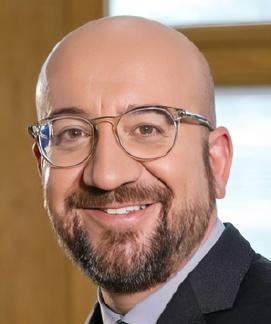
the leadership of Secretary-General António Guterres, to drive forward international cooperation and concrete steps to achieve our common goals.
As G7, we should focus on three key areas. First, partnering more closely with Africa to make a success of the clean energy transition. Africa stands at a crossroads and energy will play a pivotal role in shaping its future. Roughly 600 million Africans have no access to energy, most importantly electricity. With our African partners, the EU supports efforts for affordable energy production and distribution. G7 members can do their part to build clean energy supply chains and increase renewables on the continent, aligning with the COP28 goal to triple renewable energy and double efficiency by the end of the decade. Initiatives including the European investment package, Italy’s Mattei Plan, Germany’s Compact with Africa, France’s New Global Financing Pact, and the G7 Partnership for Global Infrastructure and Investment will reinforce Africa’s energy resilience.
Second, we must tackle food insecurity and strengthen global food systems. The world produces enough food to feed everyone on our planet, yet over 800 million people are unsure where their next meal will come from. In Africa, food insecurity and acute food shortages are getting worse, triggered by Russia’s war against Ukraine, climate change and soaring fertiliser prices. We must reverse this trend by building sustainable local agriculture and fertiliser production that reinforce food security, including through the G7 Apulia Food Systems Initiative.
Third, strengthening health systems across Africa should be a top priority. The EU and Africa are teaming up to address future public health challenges, including through the local manufacturing of vaccines, medicines and health products – in Africa, by Africa, for Africa. A successful conclusion of the Pandemic Agreement being negotiated within the World Health Organization would
help the global community prepare for and respond to future health threats.
As G7, we also have a special responsibility to make the world more stable and peaceful. War and conflict destroy people’s lives and devastate our planet. They eat up vital resources, diverting them from urgent issues such as climate change, the digital transition and sustainable development. Lasting progress on global challenges can only be built on a foundation of peace. The G7 must help to lay this foundation, by reducing tensions and working for peace. There is no development without peace.
Some players around the globe are throwing sand in the gears of multilateral cooperation. They want to change the rules of the game.
The G7 is a staunch defender of the rules-based system and global cooperation. Russia’s illegal war against Ukraine is a frontal attack on this world order. It violates the UN Charter and respect for the territorial integrity of all countries, triggering multiple crises worldwide. Allowing the Kremlin to redraw borders with the barrel of a gun would change the course of history, not only in Europe but for the world. That is why the EU will continue to back Ukraine for as long as needed.
The Kremlin is solely responsible for this war and its global consequences. Russia is a nuclear power and a permanent member of the UN Security Council, a so-called guarantor of the international rules-based order. There can be no double standards. The EU will never stop calling out the Kremlin’s criminal actions. The EU will continue to impose strong sanctions on Russia until it ceases to violate the UN Charter. We reiterate that these sanctions do not apply to agricultural products or fertilisers.
Each civilian life matters. Everywhere. In the Middle East, everything must be done to protect civilians. No double standards – international humanitarian law must be respected everywhere.
The EU works tirelessly with partners to end the war in Gaza. We demand an immediate ceasefire, the release of all hostages, and unhindered humanitarian aid to Palestinians, who are facing famine. As we look to the future, the only path to a lasting peace in the region is based on the two-state solution so both Israelis and Palestinians can live safely.
Unity and collective action. This is the path to solving the world’s most urgent problems. When we act as one, we have the power of many – to transform lives and change the course of history, for developing countries, for our planet and for greater peace among nations. The European Union listens to its partners and strives to build respectful and mutually beneficial relationships for a fair, peaceful and prosperous future for generations to come.
Since the last European elections, our Union has really weathered two crises of historic proportions –the COVID-19 health crisis and the war in Ukraine, with a ‘made-in-Russia’ energy crisis. They could have turned into a dramatic economic and social crisis. But they did not. This was because of Europe’s great resilience but also because we put the right policies in place. Think of SURE. SURE saved 40 million European jobs. Or think of NextGenerationEU or REPowerEU, which fast-tracked the recovery and the deployment of home-grown renewables. I have not forgotten that in 2020, many predicted mass unemployment in Europe, and a long recession. It did not happen because we put the right policies in place and we acted decisively. Instead, today we have more people at work than at any other time in European history. Unemployment is at an all-time low, at less than 6%. Employment is at an all-time high, at more than 75%. And inflation is now close to our 2% target … I want to look at four of the basic factors that determine costs, prices and productivity in Europe. Let me start with finance. Since we took office almost five years ago, we have unleashed an unprecedented wave of public investments in strategic sectors. Take energy and clean tech. We are investing EUR 400 billion from NextGenerationEU, and we have approved over EUR 550 billion in national public support, for clean tech and energy investment. This has been crucial. But certainly public investment is not enough. The time has come for a systemic solution that mobilises Europe’s immense private capital. And an essential part of this solution is to complete the Capital Markets Union … The second priority is reducing the cost of energy. Energy costs continue to affect our competitiveness, specifically for energy-intensive industries. But the International Energy Agency tells us that there might be some relief in sight. You remember very well that last year, during the LNG [liquefied natural gas] energy crisis, there were many investments that have been done. Now, a large wave of new LNG export projects is coming to the market. Therefore, we might soon be moving from a global shortfall to an abundance of LNG. As a result, we expect gas prices to fall. This gives us space to further develop renewable energies. And I
think it is a very telling success that last year for the very first time, the European Union was able to produce more electricity from wind than it did from gas. This was a big success … In our decade now, our cross-border electricity transmission capacity must double …
The third priority is to address the labour and skills shortage that affects our economy. And it is obvious, we have, as I said, a very low unemployment [rate]. So, we need to train as many as possible of our unemployed, and specifically have a look at youth unemployment. Because, as we have a very low unemployment rate on average, we still have a higher youth unemployment rate than the average. Every young person has great potential, even if they might be struggling with obstacles of all kinds. Let us make sure that they get the chance they deserve. We also have to increase women’s access to the labour market. Parents need infrastructure. It is very simple: affordable and accessible childcare, good schools and flexible working hours are an absolute must. Finally, we can offer more flexible solutions for silver workers to continue their careers, and we need to attract the right talents from abroad. It is a whole bundle of activities that have to be done to address the skills shortage. We are investing EUR 65 billion in skills, they are coming from NextGenerationEU and the European Social Fund, and skills must continue to be at the heart of our action.
Finally, let us never forget that Europe is a trading continent, and we derive a significant share of our prosperity from trade. If it is true that in the next decade 90% of the most significant growth is happening in regions outside the European Union, we should tap into it. And our Union is second to none in negotiating trade deals. We have the largest network of trade agreements in the world, with a total of 74 countries. The value of EU trade through these agreements surpassed EUR 2 trillion for the first time in 2022. And beyond exports, we need to secure imports, for example, of the critical raw materials that our industry needs. But … global trade also needs to be fair. We need a global level playing field. And we need to address the risks that come with our openness. We need for example tools to address issues of overcapacity produced outside the European Union. I am speaking of structural overproduction, which is achieved to a large extent with massive subsidies. It has to go somewhere, this overproduction. Others are closing their markets. So our market is an attractive destination and we have to be very vigilant that our producers are not at risk [of being] forced out of the market. And we also need to involve developing economies around the world on this topic, because their industrialisation is also threatened directly by overcapacity. We need a more structural response with our partners. Work is starting on this in the G7.
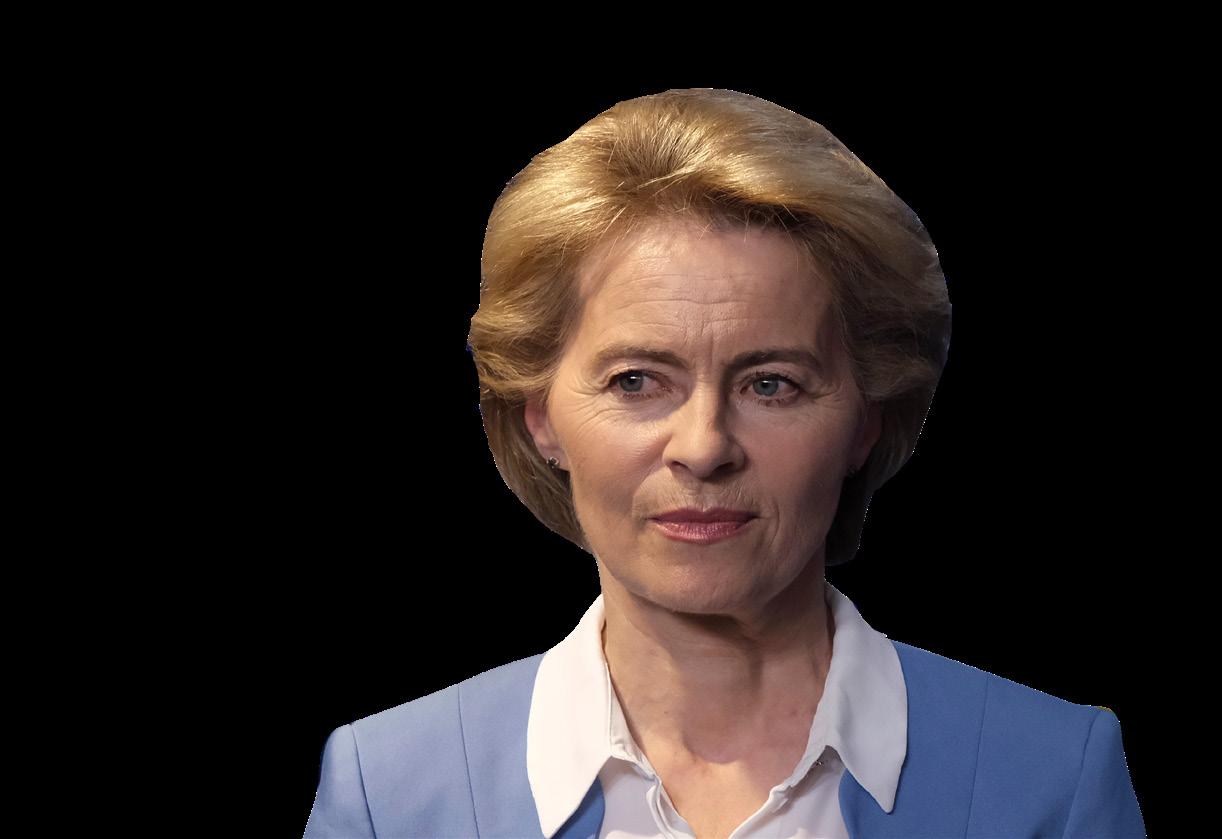
European Parliament Plenary, 23 April 2024






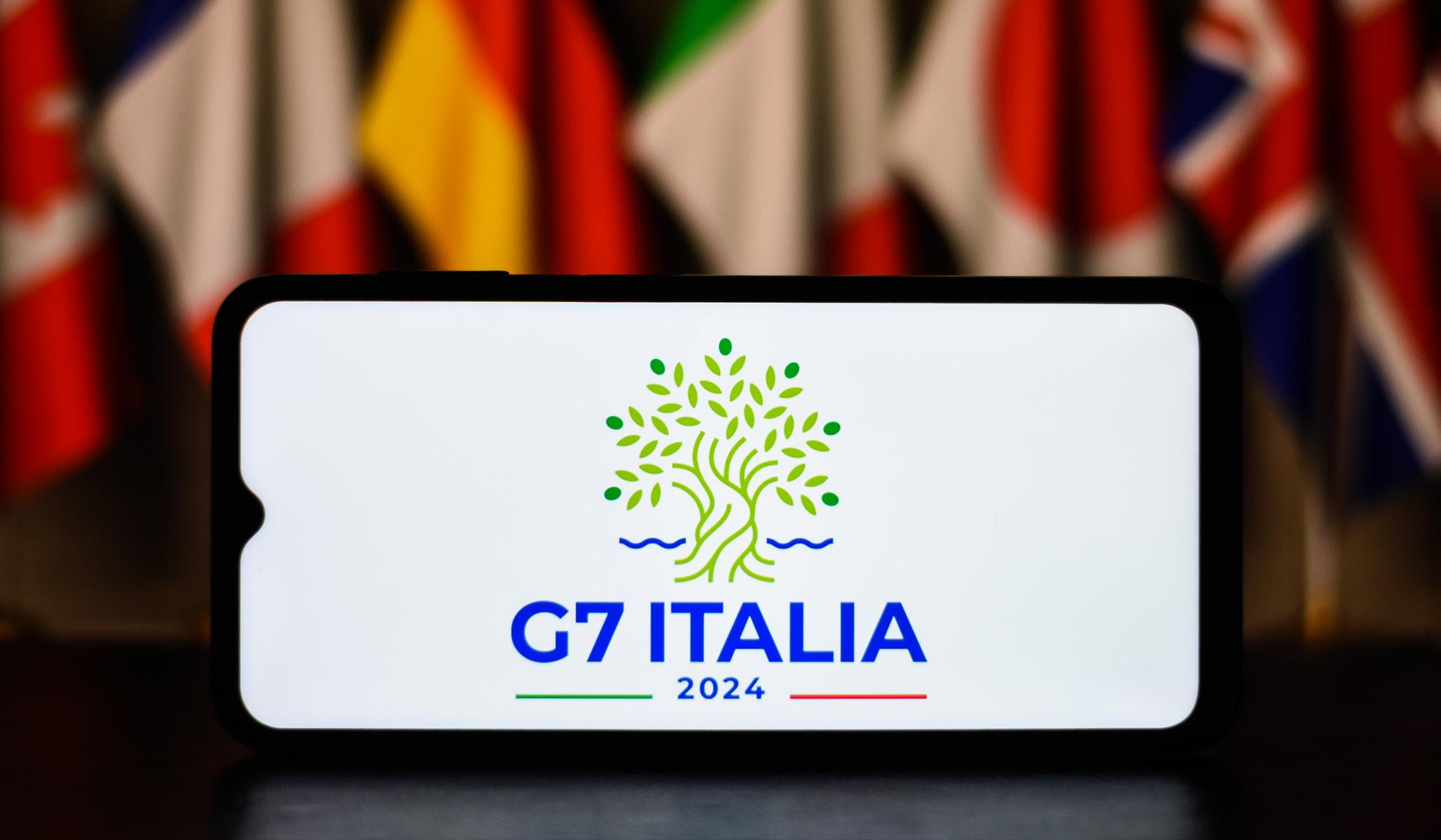
At their Apulia Summit, G7 leaders are tasked with a very broad and demanding agenda, and cooperation with and among relevant organisations, trust in multilateralism, and the G7’s relationship with the major growing democracies, the G20 and civil society are key to a strong performance
The G7’s 50th annual summit, taking place in Apulia, Italy, on 13–15 June 2024, confronts a wide array of interconnected crises, starting with Russia’s war against Ukraine, conflicts in the Middle East, climate, energy, food and health insecurity, declining development, debt sustainability and democracy, especially in Africa and the Indo-Pacific region, and newer challenges from migration and refugees and artificial intelligence.
In response, G7 leaders will build on the results of their special summits on 24 February and 14 April, and their ministers’ G7 meetings, to advance the G7’s distinctive foundational mission of protecting and promoting open democracy and individual liberty at home and abroad. They are led by the first female and youngest Italian prime minister Giorgia Meloni, at her second annual summit and her first as host. She is joined by Canadian prime minister Justin Trudeau and French president Emmanuel Macron at their ninth, US president Joe Biden
Xyxyxyxyxyxyxyx xyxyxyyyxyxyxyx
and German chancellor Olaf Scholz at their fourth, Japanese prime minister Fumio Kishida at his third, and UK prime minister Rishi Sunak at his second. The EU Commission’s President Ursula von der Leyen and the EU Council’s President Charles Michel are at their fifth. They will be reinforced by several invited guest leaders, including Pope Francis, directly relevant to their work.
Security, their first priority, begins with the deadly conflicts in Europe, the Middle East and the Gulf, and military confrontations in the Indo-Pacific region. They arise from Russia’s invasion of Ukraine on 24 February 2022, the Hamas attack on Israel on 7 October 2023 and Israel’s subsequent attacks in Gaza, Iran’s attack on Israel on 13 April, a nuclear-armed North Korea threatening its neighbours, and a militarising China preparing to seize Taiwan by force. Security includes countering crime and corruption and defending democracy and human rights against the growing disinformation, polarisation and interference in democratic elections enabled by digital communication and AI.
The second priority is restoring development in poor countries, reducing their growing debts, propelling progress towards the United Nations Sustainable Development Goals and partnering with Africa in an equal way.
The third priority of migration and refugees covers people displaced within their own countries and driven from poor to rich countries by conflict, climate change and poverty, those who traffic them, and those migrating legally to provide their new countries with the workers and taxpayers those countries need.
The fourth priority is the climate-energy nexus, including climate change, biodiversity loss and pollution from plastics, chemicals and other human waste. Human activity is now relentlessly driving the post-industrial global temperature rise beyond its liveable limits of 1.5°C, fuelling ever more extreme weather events and approaching critical, irreversible tipping points. This requires fostering clean and renewable energy sources and phasing out fossil fuel subsidies and coal.
Food security, the fifth priority, centres on the immediate need to feed the rising number of famine-stricken people. It extends to crafting exports and imports – amid inflation, sanctions and environmental, social and governance concerns – to provide more affordable, accessible, appropriate and healthy food.
AI, the sixth priority, includes developing rules for its governance that foster its innovative potential, while ensuring privacy, safety, intellectual property protection and the integrity of the information it disseminates.
The summit’s built-in agenda starts with the economy and finance, especially strengthening non-inflationary, shared economic growth through fiscal, monetary and exchange rate policy, and strengthening financial stability through better financial regulation and supervision. It includes fostering economic security and resilience by diversifying supply chains through trade, investment and domestic subsidies. Travel, tourism and culture are also important, for Italy and many countries, as they foster economic development,
Security,
their first priority, begins
with the deadly conflicts in Europe, the Middle East and the Gulf, and military confrontations in the Indo-Pacific region”
women and youth empowerment, ecological enhancement, intercultural understanding, and peace.
Health requires controlling Covid-19 as new variants arise, preventing, preparing and responding to new pandemics, and addressing non-communicable diseases, zoonoses, antimicrobial resistance and synthetic drugs. It needs a new emphasis on mental health, as dementia spreads among the rapidly ageing populations in most G7 members, and as the links between health and climate change intensify. Supporting social well-being also includes fostering better jobs and labour standards, gender equality, education and human capital, and care for children, youth and the elderly.
Strengthening the G7-centred system of global governance requires improving implementation of G7 commitments, cooperation with and among UN organisations, trust in multilateralism, and the G7’s relationship with the major growing democracies, the G20 and civil society.
On this very broad and demanding agenda, the Apulia Summit promises to produce a strong performance. It will provide very strong support for Ukraine and the other European democracies confronting Russia’s aggression, try to foster human security and peace throughout the Middle East, and protect democracies everywhere. It will make substantial progress on climate change, the environment, energy, and Africa and solid advances on development, migration, food security, AI and the economy.
John Kirton is the director of the G7 Research Group, the G20 Research Group, the BRICS Research Group and the Global Health Diplomacy Program, under the umbrella of the Global Governance Program at the University of Toronto, where he is a professor emeritus of political science. He is co-author, most recently, of Reconfiguring the Global Governance of Climate Change, and is co-editor of G20
India: The 2023 New Delhi Summit as well as a global health series, including the recent Health: A Political Choice – Advancing Indigenous Peoples’ RIghts and Well-Being
X-TWITTER @jjkirton www.g7.utoronto.ca


As G7 leaders gather around the summit table for their 2024 meeting, one priority is strengthening the relationship with developing countries and emerging economies in Africa and the Indo-Pacific region, thus truly driving global change
The 2024 Italian presidency of the G7 set a busy schedule of ministerial meetings, taking place in different Italian cities, and culminating in the summit on 13–15 June. The 2024 annual G7 summit will take place in Borgo Egnazia in the region of Apulia in the south of Italy, a beautiful spot where culture, food and the environment attract thousands of tourists from all over the world.
What G7 leaders will personally discuss in June is difficult to forecast, given the fast and continuous
changes in the geopolitical situation. The Italian prime minister, Giorgia Meloni, has set the G7 priorities for 2024 to focus on three main areas: global (in)security, emerging economies and migration, and artificial intelligence.
Global security is in danger due to Russia’s aggression against Ukraine, the situation in the Middle East and other conflicts, which all have direct consequences on the global agenda and on economic growth. On 24 February 2024, G7 leaders held a hybrid summit hosted by Prime Minister Meloni in
Kyiv, alongside two fellow G7 leaders and Ukrainian president Volodymyr Zelensky. It firmly confirmed their help for Ukraine and condemned Russia’s aggression, two years after its start. On 14 April 2024, leaders met again virtually to take a position on the Middle East conflict currently involving Israel and Iran, and at risk of spreading throughout the region and beyond.
During the Apulia Summit, G7 leaders will again reaffirm their support for Ukraine, but it is unclear how they will handle the delicate issue of how to effectively promote rebuilding the country, without asking G7 taxpayers to provide any more money. The public debt of G7 countries has reached unprecedented levels, and cannot be leveraged any further. The European Union proposes directing the extraordinary revenues stemming from Russia’s sovereign immobilised assets through a World Bank reconstruction programme to benefit Ukraine. This is similar to what happened after conflicts in Europe in the 18th and 19th centuries. However, we should recall that the heavy burden of payments and hard punishments on Germany written into the 1919 Treaty of Versailles were at the root of the Second World War. To what extent this may be repeated for Russia is difficult to predict.
The relationship with developing countries and emerging economies in Africa and the Indo-Pacific region is central for Prime Minister Meloni. She launched the Mattei Plan for Africa to promote investments in education and training, health, water and sanitation, agriculture, energy, and infrastructure in African countries, with an approach that is “far from paternalistic or predatory logic”.
Migration is the result of food insecurity and climate change, among other drivers. Italy is the main entry point to Europe for millions of migrants. Innovative solutions should be agreed on by G7 leaders through taking concrete actions to support the countries of origin so people can safely stay home.
G7 leaders believe that AI can generate important opportunities, but also enormous risks, as well as having impacts on geopolitical balances. Pope Francis has been invited to join the working session on artificial intelligence at Apulia; in his message on the 57th Peace Day in January 2024, he stated that AI should be used ethically and for peace. It is therefore necessary to develop governance mechanisms and ensure that AI is human-centred and controlled by humans. G7 leaders are expected to take a position on the principles and ethical limits of AI. The European Union recently introduced substantive regulations on AI to handle the consequences of its use, but a coordinated global approach is necessary to reduce arbitraging opportunities that reduce the business competitiveness of Europe.
G7 leaders will meet in Apulia on June 13–15, a few days after the European Parliament elections. Ursula von der Leyen, president of the European Commission, and Italy’s Giorgia Meloni will be the only women at the summit table. All the G7 leaders present will have participated in at least one summit,
What G7 leaders will personally discuss in June is difficult to forecast, given the fast and continuous changes in the geopolitical situation”
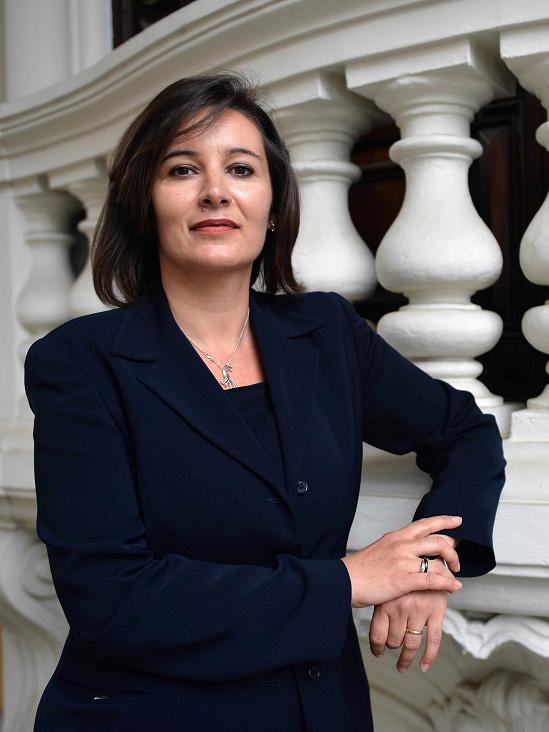
with some now well-seasoned veterans. They will continue to consolidate their mutual relationships, including with invited leaders from several emerging and developing countries, and will thus strengthen the impact of their commitments at the global level. Given the complexity of the priorities on the agenda, the Apulia Summit will be successful if the leaders’ positions align with Italy’s proposals.
While global (in)security has been addressed in the past, as has help for Ukraine, migration and AI are newer topics on which the leaders’ views are less coordinated. Italy and the United Kingdom have started to cooperate with countries beyond their borders (such as Albania and Rwanda) to manage migration, but this approach is not welcomed by some EU countries. On AI, Europe’s ‘excessive regulation’ can favour the United States and emerging economies, and may result in regulatory arbitrage. Italy has no national champion in this field, and might opt for a softer approach.
Chiara Oldani is a professor of monetary economics at the University of Viterbo ‘La Tuscia’ and the director of the Rome office of the G7 and G20 Research Groups. Her research focuses on financial innovation and stability. X-TWITTER @ChiaraOldani
The G7 Apulia Summit and the NATO Washington Summit are opportunities to demonstrate our steadfast – and shared –commitment to democracy at a time when we face greater security threats than we have for generations

Explosions have rocked Kyiv, but with support, Ukraine has retaken half the territory captured by Russia in 2022 and inflicted heavy losses on the Russian military
For 75 years, the North Atlantic Treaty Organization has ensured the security of Europe. Over the past decade, NATO has undertaken a profound transformation, and has become stronger and more united along the way. But today, we face greater security threats than we have for generations. It is vital that countries that share the same values – a commitment to freedom, democracy and the rule of law – work together to maintain the international rules-based system that has ensured peace and prosperity for billions of people for so many decades.
By Jens Stoltenberg, secretary-general, NATONATO is a regional alliance but we face global challenges, including increasing competition from authoritarian states, such as Russia and China. China does not share our values. It challenges our interests, and Beijing is increasingly aligned with Moscow. We must manage the risks and prepare for enduring competition. At the same time, we must face the ongoing threats of terrorism, cyberattacks and climate change.
If we are to maintain our security, protect democracy and maintain a global system based on rules and international law, it is essential that NATO
Allies and partners around the world have provided tens of billions of dollars in military, financial and humanitarian assistance to support Ukraine’s right to exist as an independent, sovereign country. The results have been extraordinary”
works with like-minded partners around the world, including the G7. And that is precisely what we are doing.
TACKLING DISINFORMATION
NATO cooperates with the G7’s Rapid Response Mechanism to tackle disinformation that is intended to undermine democracy, create divisions and weaken our security. We continue to work closely with the European Union on a wide range of security issues. We are deepening cooperation with our partners in the Indo-Pacific – Australia, Japan, New Zealand and Korea. All the while we continue to work to strengthen NATO’s partnerships in our southern neighbourhood.
Currently, the most immediate threat is Russian president Vladimir Putin’s war of aggression against Ukraine. Allies and partners around the world have provided tens of billions of dollars in military, financial and humanitarian assistance to support Ukraine’s right to exist as an independent, sovereign country. The results have been extraordinary.
President Putin assumed his forces could take Kyiv in a matter of days and that Ukraine would fall in a matter of weeks. He was wrong. Instead, with our support, Ukraine continues to fight bravely and with extraordinary professionalism. It has retaken half the territory captured by Russia in 2022, inflicted heavy losses against the Russian military and pushed Russia’s navy back in the Black Sea. Ukraine’s success in the Black Sea has neutralised Russia’s attempt to block grain shipments from reaching the world. Today, these vital Ukrainian grain exports have returned to near pre-war levels, feeding millions of people.
The situation on the battlefield is difficult. But this only makes it more important that we maintain and increase our support for Ukraine. This is the only way to achieve a just and lasting peace. This is not only a moral obligation; it is in our own interest. If President Putin wins in Ukraine, his
victory would send a powerful message to authoritarian leaders around the world that war and violence are effective ways of achieving political objectives. We cannot allow that to happen.
President Putin wanted to destroy Ukraine and divide NATO, but he failed. NATO is supporting Ukraine’s right to self-defence, enshrined in the UN Charter. This is why we are bringing Ukraine closer than ever to our alliance. At the new NATO-Ukraine Council, we discuss and take decisions on matters of our common security. We have agreed on a comprehensive programme to make Ukraine’s forces fully interoperable with NATO. We have also made it easier for Ukraine to one day become a member of our alliance.
NATO will continue to support Ukraine, but we cannot do this alone. Ensuring success on the pathway to peace requires the support of the entire global community.
The G7 members, six of which are NATO allies, have provided security commitments – to support Ukraine now and provide assistance in case of future aggression by Russia. G7 members have also taken unprecedented steps to isolate and punish Russia with economic sanctions and the freezing of hundreds of billions of dollars of Russian assets held in their countries. They are committed to supporting Ukraine in holding Russia to account for war crimes and other international crimes committed in and against Ukraine, including murder, widespread sexual violence and the kidnap of thousands of children.
This G7 summit in Apulia and the NATO summit in Washington in July are opportunities to demonstrate our steadfast commitment to democracy, to the rules-based international order and to the future of Ukraine as an independent sovereign country. As always, we are stronger together.
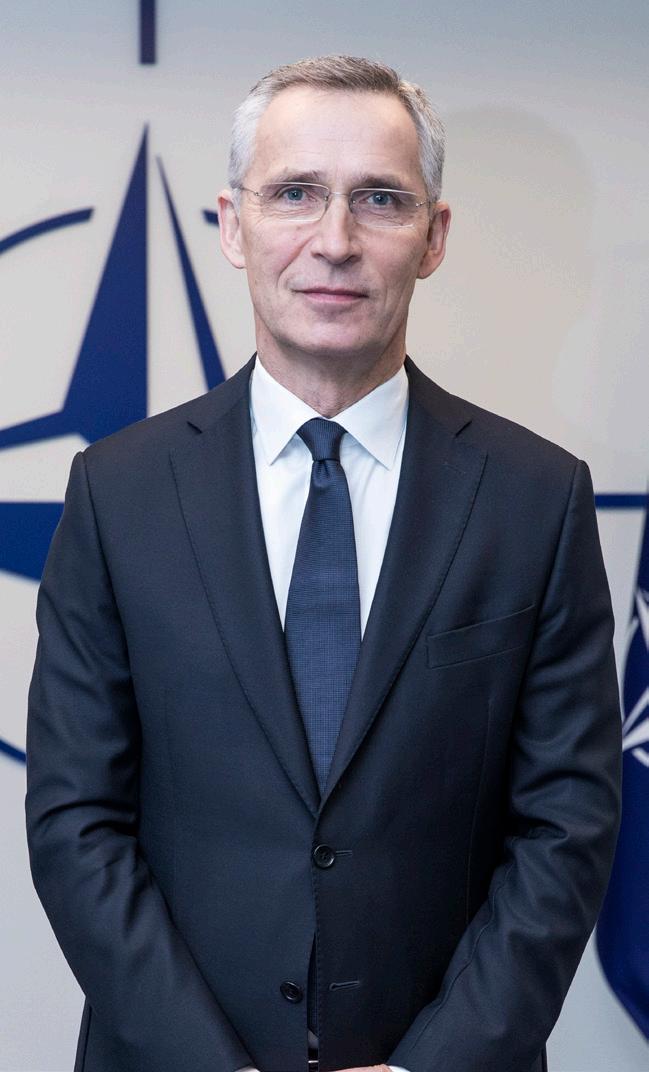
Jens Stoltenberg became secretary-general of the North Atlantic Treaty Organization in 2014, with a mandate extended to October 2024. He served two terms as prime minister of Norway, from 2000 to 2001 and from 2005 to 2013, and also held various posts including finance minister and minister of industry and energy. In 2013–2014, he served as United Nations Special Envoy on Climate Change in 2013–2014 and chaired UN high-level panels on climate financing and the coherence between development, humanitarian assistance and environmental policies.
The World Fusion Energy Group is seizing the momentum towards abundant carbon-free energy by fostering global collaboration, accelerating research, development and deployment of fusion energy technologies, and setting the stage for a community working coherently towards this one common goal
 By Rafael Mariano Grossi, director-general, International Atomic Energy Agency
By Rafael Mariano Grossi, director-general, International Atomic Energy Agency
From the very start, more than half a century ago, the International Atomic Energy Agency has been bringing the fusion community together.
Today, we are witnessing extraordinary change in the atmosphere surrounding the progress of fusion energy. Fuelled by the urgency of the quest for net zero carbon emissions and energy security, there has been immense public interest in the recent breakthroughs in fusion energy technology.
From visiting cutting-edge facilities to engaging in global forums, I have seen
the passion and innovation driving the field forward.
While there is increasing industry participation and private investment, there is also a keen recognition of the importance of the public sector, home to valuable facilities and decades of accumulated knowledge. Both sectors need to be nurtured to ensure they are complementary and sustainable.
Collaboration will be key to the success of this new emerging ecosystem. This is the time to bring together stakeholders to help accelerate the fusion energy journey from the experimental stage towards demonstration and ultimately commercialisation.
It is why I established the World Fusion Energy Group, a global initiative to foster
collaboration across the fusion energy spectrum. Its inaugural meeting will be hosted by the IAEA and the government of Italy in Rome on 6 November.
Its mission is ambitious and clear: to accelerate the research, development, demonstration and deployment of fusion energy technologies. By bringing together stakeholders from industry, government, academia and regulatory bodies, we are setting the stage for a cohesive fusion energy community working coherently towards common goals.
The World Fusion Energy Group is not just about fostering dialogue; it is about creating a tangible impact, enhancing global cooperation, bridging technological
High-energy particles flow through a donutshaped device

Rafael Mariano Grossi became director-general of the International Atomic Energy Agency in 2019. In 2013, he was appointed Argentina’s ambassador to Austria and representative to the IAEA and other Vienna-based international organisations. In 2019, he was president designate of the 2020 Review Conference of the Parties to the Treaty on the Non-Proliferation of Nuclear Weapons, and from 2014 to 2016 he served as president of the Nuclear Suppliers Group. He was chief of cabinet at the Organization for the Prohibition of Chemical Weapons from 2002 to 2007.
X-TWITTER @RafaelMGrossi @iaeaorg iaea.org
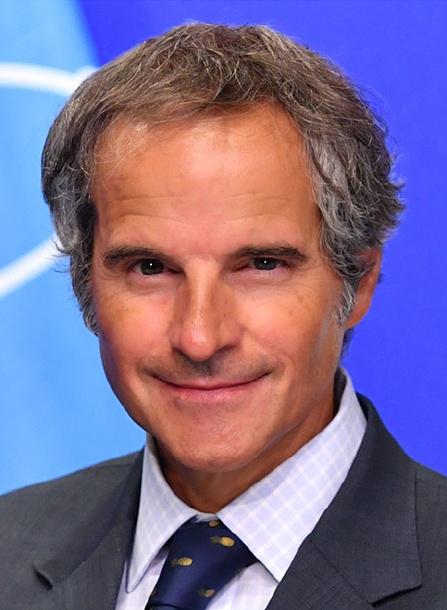
gaps and helping to establish a regulatory approach conducive to the growth of fusion energy. For example, we are coordinating the development of fusion key elements that will provide a common understanding of the considerations essential to progress. Moreover, we are committed to raising public awareness and helping to integrate fusion energy into the broader energy market.
Fusion has been moved forward by advances in computational tools and scientific understanding, by the path paved by ITER in designing, fabricating and assembling components, and by recent breakthroughs, including achieving scientific energy gain. Recent progress in developing advanced superconducting magnets, in devising regulatory approaches, in getting new projects off the ground, and in the announcements of site locations has also provided momentum.
The IAEA already plays a key role in hosting the Fusion Energy Conference and creating other forums for the exchange of scientific and technological knowledge and ideas. At the 2023 Fusion Energy Conference, we launched the first World Fusion Outlook, a global reference on the latest developments in fusion energy.
Our coordinated research projects bring together the public and private sectors on subjects of importance to the international fusion research and development programme. The IAEA supports research by providing and managing important atomic and plasma physics databases, and we serve researchers and operators by curating fusion data to make sure it is correct. We also publish the longest running academic journal on fusion.
Fuelled by the urgency of the quest for net zero carbon emissions and energy security, there has been immense public interest in the recent breakthroughs in fusion energy technology”
The vital role of governments is clear. Strategic public investments and support for public-private partnerships are crucial to shifting fusion energy from the laboratory to the grid. Sustained funding, policy support and international collaboration are key drivers to success because there are still serious challenges to overcome. To demonstrate long-lasting operation or high repetition rates, progress is needed in fusion plasma confinement technologies. Engineers and scientists still need to develop the materials able to withstand the extreme conditions inherent in the process. The fuel cycle must be closed, safely and efficiently. And, finally, we need to be able to extract and harness the enormous amount of energy produced.
Over recent years, we have intensified our involvement in the sector, resulting in the natural expansion of our activities. IAEA is now also active in the areas of fusion engineering and safety and in addressing environmental concerns, developing regulatory frameworks and examining socio-economic dimensions.
The next leg of that journey will require a concerted effort from many sectors. We need to prioritise the development of enabling technologies and materials, strengthen public-private partnerships, and harness private capital to drive commercial viability. The IAEA and the World Fusion Energy Group are committed to facilitating and supporting these endeavours.
To be sure, the G7 has recently achieved some considerable results. Most important, the European Union and the United States have approved new substantial military support packages after overcoming prolonged internal resistance. In particular, the $61 billion passed by the US Congress is widely expected to have an impact on the ground, blocking or at least slowing down the Russian advance.
Current conflicts have prompted the G7 to become more active in the political-security sphere, and there is hope that Apulia will provide a forum for the group’s leaders to candidly assess the many challenges they face – particularly Russian aggression in Ukraine
Recently, key factors, particularly the deepening strategic rivalry with China, Russia’s war of aggression against Ukraine, and the war between Israel and Hamas, have prompted the G7 to be more active in the politicalsecurity sphere, which has not always been at the centre of its agenda.
Countering Russia’s aggression and its expansionist plans in Europe has remained a top priority. Since the start of the invasion in February 2022, G7 members have shown remarkable unity and cohesion in responding to such a blatant violation of fundamental international law principles, something that not all analysts or observers expected. Latest developments have further reinforced the feeling within the G7 that Russian president Vladimir Putin’s revanchism represents an enduring threat to Europe’s security. Ukraine’s fate was at the centre of the G7 foreign ministers’ meeting in Capri on 17–19 April 2024. They reiterated their “steadfast support” for Ukraine. The declared aim is to provide Kyiv with the means and resources it badly needs to defend itself against Russian aggression. Ukraine has suffered substantial military setbacks and many western officials warn that the balance is shifting in favour of Moscow. The challenge for the G7 is to ensure effective continued support to Ukraine in the long run with the limited resources available, as public fatigue grows due to the costs associated with solidarity with Ukraine, as does the prospect that Russia cannot be prevented from making further advances and eventually gaining the upper hand.
By Ettore Greco, executive vice president, Istituto Affari InternazionaleMoreover G7 members’ bilateral security agreements to support Ukraine have been reinforced. G7 members have committed to enhancing production and delivery capabilities to speed up defence and security assistance to Ukraine. These pledges have been accompanied by decisions of major political significance. In December 2023 the European Council gave the green light to negotiations for Ukraine’s accession to the European Union.
G7 members’ political and security links with Ukraine have further deepened since the G7 Hiroshima Summit in May 2023. However, G7 members have so far avoided direct involvement in the conflict. Only France’s Emmanuel Macron has not ruled out sending troops to Ukraine, but his declarations hinting at this possibility have been ill received in many western countries and within the North Atlantic Treaty Organization. Italy, which holds the G7 presidency this year, has adamantly rejected any idea of dispatching forces to Ukraine, citing constitutional constraints. However, the G7 is not expected to make any substantial openings to Moscow that could induce it to enter into serious talks to end the conflict. The overarching priority is to enable Ukraine to hold its military positions and repel Russian advances. Indeed, as long as Putin is convinced that time is on his side,
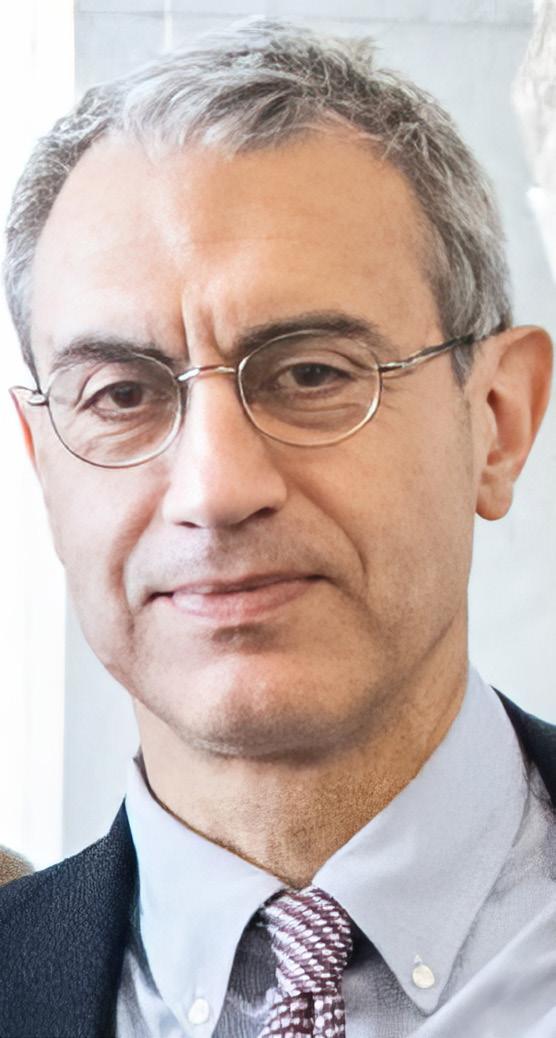
Ettore Greco is executive vice president of the Istituto Affari Internazionali and head of its Multilateralism and Global Governance programme. He was also director of the IAI from 2008 to 2017, having been deputy director since 1997. He was a visiting fellow at the Brookings Institution from 2006 to 2007. He has taught at the universities of Parma and Bologna. From 2000 to 2006 he was correspondent for the Economist Intelligence Unit. From 2000 to 2006 he was editor of The International Spectator X-TWITTER @IAIonline iai.it


he has little incentive to negotiate based on the basic principles of international law that the G7 is defending. The G7 has expressed support for the international peace conference in Switzerland in June, but the impact of this diplomatic endeavour is widely expected to be fairly limited: Russia has refused to participate, and key actors, including China, may choose not to be involved or send low-level delegations.
Another significant issue is the need to update the G7’s sanctions imposed on Russia, as their effect on the Russian economy has been significantly lower than expected. The G7 will likely approve new punitive measures to respond to Russia’s escalating attacks in Ukraine, repeated cyberattacks against several western countries and alleged acts of sabotage in the EU. One top concern is the industrial items that Russia receives from China, which help it rebuild its defence industrial base. This is another major source of friction between Beijing and the G7. It remains to be seen if the G7 can devise effective measures to induce China to backtrack. Driving a wedge between Moscow and Beijing seems difficult, not least because of their ever closer alliance and G7 members’ deteriorating relations with both countries.
All G7 members are experiencing, to different degrees, growing fiscal constraints that raise doubts about the sustainability of their support for Ukraine. This has intensified the debate over the use of frozen Russian financial assets – worth about $300 billion – to support Ukraine. G7 governments hold different positions: while the US administration favours seizing all Russian reserves and transferring them to Ukraine, many EU officials fear that outright confiscation may

G7 members have shown remarkable unity and cohesion in responding to such a blatant violation of fundamental international law principles”
violate international law and trigger destabilising Russian countermeasures. EU leaders have decided on a more cautious plan for using the profits from Russian assets. The G7 is discussing different options and will likely reach an agreement at the Apulia Summit in June.
Hopefully, Apulia will provide a forum for G7 leaders to candidly assess the many challenges they are facing in implementing their plans to support Ukraine. New commitments can help reinforce not only security but also political and economic relations with Kyiv. A renewed strong message should be sent to Putin that the G7 will continue to be on Ukraine’s side in the coming years and that it is in the G7’s vital interest to prevent Russian aggression from achieving its goals.
Smoke

Protecting Palestinians from further disaster and paving the way to recognising a Palestinian state requires a coordinated, unified, multilateral position from the G7 – and it is critically needed in this moment of geopolitical tension, when more lives are at risk
What are the major challenges to restoring peace in the Middle East?
I challenge the notion that there was peace in the Middle East. There were trends towards de-escalation and reconciliation and integration, bringing Iran, Saudi Arabia, Turkey and the Gulf states back to the diplomatic field. The Abraham Accords saw normalisation among Israel, Bahrain and the United Arab Emirates. But none restored peace or stability. There has been ongoing violence for years in Palestine and Israel. There have been constant military activities in Iraq and Syria. There was a ceasefire in Yemen, but the conflict is not resolved, and one would say the same about Libya.
We should have peace as a goal, but a first step in that direction is to obtain a ceasefire in Gaza. For Palestinians in Gaza, this is a humanitarian crisis
Interview with Sanam Vakil,
director, Middle East and North Africa Programme, Chatham Houseof epic proportions, with long-term demographic, social, economic and political consequences in Israel and Palestine. Egypt and Jordan, with peace treaties with Israel, are in compromised, precarious positions and under huge pressure along their borders.
Palestine has resurfaced as a mobilising issue, which has caught Middle Eastern leaders off guard. They’re being called out by their populations for being unable to deliver a ceasefire. The Axis of Resistance, backed by Iran but also based in Iraq, Syria, Yemen and Lebanon, has made it abundantly clear that the violence will end if there is a ceasefire in Gaza. It is very disappointing that no individual country or coalition – neither the G7 nor the United Nations – has been able to protect human life in Gaza and impress on Israel the urgency of a ceasefire for its longer-term security.
How much progress has been made by key governments and organisations?
Certainly, the UN has attempted to bring about a ceasefire, but the US has vetoed or abstained from any such resolution. It would be symbolically important for the US to call on Israel to change course in Gaza. Middle Eastern states are frustrated that no collective multilateral initiative has been marshalled as was done for Ukraine. There have been regional initiatives: at two summits last fall, the Arab League and the Organization of Islamic Countries called for a ceasefire and humanitarian support for Palestinians in Gaza. There have been several diplomatic initiatives to build consensus and negotiate a plan for a ceasefire, hostage release and then a day-after scenario. There is a real risk of a broader regional escalation, so far relatively contained, despite the death of US servicemen in Jordan, loss of life on the border between Hezbollah and Israel, attacks on Axis of Resistance forces in Syria and Iraq, and Houthis’ attacks on merchant ships. Tensions have been especially high after Iran’s drone attack on Israel in retaliation for Israel’s strike on an Iranian diplomatic building in Syria. We are in a dangerous moment. The United Nations Relief and Works Agency for Palestine Refugees in the Near East has long been important in providing humanitarian support. Unfortunately, and strategically timed, Israel accused UNRWA members of collaborating with Hamas, and many countries withdrew financial support at a critical time. While some of that is returning, there still has not been an adequate investigation – again at the cost of the Palestinians. UNWRA has long faced accusations of collaboration, but it has provided durable humanitarian assistance to Palestinians for more than two decades. The withdrawal of support also provides Hamas with an opportunity to provide provisions, food and basic needs for people who are suffering. That reactive approach by western governments has knock-on effects that play out poorly, especially regarding the Palestinians themselves.
What key tasks and challenges remain?
I will not be hopeful until we get a ceasefire. Without
It is very disappointing that no individual country or coalition – neither the G7 nor the United Nations – has been able to protect human life in Gaza and impress on Israel the urgency of a ceasefire for its longer-term security”
the political space for diplomacy, it is hard to be hopeful. The suffering for ordinary Palestinians is inhumane, and there needs to be planning for what is becoming a massive humanitarian crisis that will include famine, further loss of life, drought – everything – in a small space that has been completely gutted, with no infrastructure or ability to deliver services to people. The ceasefire is urgently needed for those humane reasons.
 SANAM VAKIL
SANAM VAKIL
Sanam Vakil was appointed director of Chatham House’s Middle East and North Africa programme in 2023. She was previously the programme’s deputy director and senior research fellow. She is also the James Anderson professorial lecturer in Middle East studies at the Johns Hopkins School of Advanced International Studies (SAIS Europe) in Bologna, Italy. She previously taught at SAIS Washington and served as a research associate at the Council on Foreign Relations. She is the author of Action and Reaction: Women and Politics in Iran
X-TWITTER @SanamVakil chathamhouse.org
The task is immense. Everyone tosses around the hope that a two-state solution can quickly emerge. It is very hard to see how. People in Israel and Palestine have been traumatised by October 7 and the war, and there is overoptimistic hope that elections in Israel, governance and accountability reform, and a transitional government in Palestine can lead to a two-state solution. The Israeli establishment and population are less committed to a two-state solution than ever. There is no domestic discussion addressing Israel’s security crisis, and leaders are not building a case for the broad, ambitious plans being cooked up by external players and powers. Palestinian politics remain hostage to an ageing, longstanding leader in Ramallah who continues to obstruct the possibility of a transitional government. Reform and an anticorruption purge of that system are urgently needed. We haven’t heard from Palestinians in many public or international forums. There is no engagement with young Palestinians to understand what they seek for their future. These are real, structural impediments.
The G7 has the opportunity to take a coordinated, unified, multilateral position to protect Palestinians from further disaster and pave the way to recognise a Palestinian state. Alongside a call for collective international and regional diplomacy to support this progress, a strong statement now – when multilateral institutions are fragile and dysfunctional – would be very important in this moment of geopolitical tension. We need leadership, and leadership requires moral courage. If there has ever been a vacuum of leadership, we are living through it. If there was ever a need for leadership, it is now. That’s being able to stand up and do the right thing – even telling your partners and allies that they’re doing the wrong thing.
The World Future Energy Summit brings the global clean tech and sustainability community together to network and do business

Rising risks, missed milestones, funding frustrations – the global climate crisis continues to loom large in both the media headlines and the minds of billions of people worldwide. And yet, despite the difficulties involved, faster progress towards a sustainable climate future is being made, thanks to the accelerating pace of the global clean energy transition. However, there is much more work to be done, and events that serve as bridges between the world’s leading political, technological and commercial actors are more important than ever.
Enter the World Future Energy Summit – the leading international event for accelerating sustainability and the global transition to clean energy. Now approaching its 17th edition, the three-day summit has evolved to become an industry thought leader and a unique platform for inspirational
By Leen Alsebai, general manager, RX Middle East, and head, World Future Energy SummitThe World Future Energy Summit strives for a cleaner, greener tomorrow – and knowledge and collaboration are our most powerful currencies to propel the world forward
change. At the World Future Energy Summit, industry influencers, governments, private-sector companies, problem solvers and cutting-edge solutions all come together to create the blueprints for a sustainable future.
THE MIDDLE EAST IS A FULCRUM FOR FASTER ENERGY DECARBONISATION
In the Middle East– like many other regions – we are seeing a rapidly increasing need for innovations that can help combat climate change. Faced with growing desertification, increasing air pollution, food and water security risks, and threats to the marine and coastal environments, the region is witnessing a surge in initiatives that seek to restore degraded lands, generate energy from renewables and reduce the impact of human activity on our ecosystems.
Not only is the Middle East a focal point for the devastating effects of climate change, it is also an incubator for clean energy solutions and innovations that drive the industry forward. Given its ideal conditions for solar and wind power generation, its increasingly advanced logistical infrastructure and capabilities, and a prime geographical location suitable
for serving Europe, Asia and Africa, the Middle East is destined to play a central role in the ‘decarbonisation era’ of the global energy industry.
To this end, the World Future Energy Summit creates unparalleled opportunities to turn these natural and human-made advantages into more rapid (and more tangible) progress. It is an event that bridges the gap between policy and action, elevating the power of face-to-face interactions by giving every attendee the ability to learn deeply about relevant markets, source the right products and forge meaningful partnerships.
Beyond being an industry event, the World Future Energy Summit is dedicated to making a positive impact on society. The intention is to encourage the kind of business partnerships, innovations and knowledge exchange that align with the United Nations Sustainable Development Goals and COP28 agreements – the most recent of which has only served to increase our relevance. We are also paying close attention to ‘The COP Presidencies Troika’, which was launched at COP28 in partnership with the COP29 (Azerbaijan) and COP30 (Brazil) presidencies. This is a groundbreaking initiative to support Mission 1.5°C by “maintaining momentum, locking in continuity and anchoring implementation”. More specifically, all three presidencies will collaborate until 2030 (and beyond) to raise ambition levels across all pillars of the Paris Agreement, to “course correct” the world’s climate response. This is in perfect alignment with our efforts at home; by the end of the decade, the United Arab Emirates aims to secure its ambitious target of generating a total clean energy
capacity of 19.8 gigawatts, a stepping stone to achieving a net-zero economy by 2050. Also elevating the summit’s status are our partnerships with key industry bodies, including the International Renewable Energy Agency (IRENA) and the United Nations Industrial Development Organisation. We were honoured to have IRENA’s director-general join us at last year’s World Future Energy Summit opening, where the United Nations Industrial Development Organization announced its latest green fund as part of the summit’s Green Finance Forum, while also presenting a case study on eMobility.
The World Future Energy Summit is vast not only in scope, but also in scale. In 2023, it welcomed more than 30,000 attendees from 128 countries, bringing in more than 3,000 C-level executives as well as project management, operational, technical and financial experts driving clean energy and sustainability projects in the Middle East and North Africa region.
For the 2024 summit, despite the UAE having to grapple with widespread flooding resulting from the region’s worst storm in 75 years, 16,000 attendees were still in attendance, including representatives from 450 companies and organisations –22% higher than last year. If anything, this illustrates that despite the rising threat of climate change, the resolve of politicians, academics, business leaders and innovators is stronger than ever. As we look towards 2025 – the midpoint in a crucial decade for the clean energy transition – we can do so with a renewed sense of hope. The 2024 summit showed that momentum

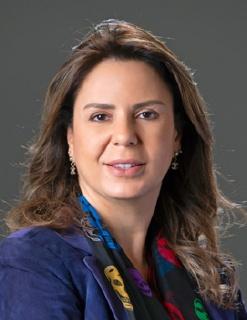
Leen Alsebai is the general manager of RX Middle East and head of the World Future Energy Summit in Abu Dhabi. She has served as both a board member of Reed Exhibitions in the United Arab Emirates and as their chief financial officer. X-TWITTER @WFES worldfutureenergysummit.com
continues to build behind solar, wind and green hydrogen adoption. Even short-term supply constraints or periodic investment uncertainties cannot stall the broader trends of accelerating adoption of clean energy production and its ever-increasing efficiency gains.
At the World Future Energy Summit 2025, the very latest developments in clean energy will be explored in detail across our well-established range of expos and forums. These platforms are essential hubs for knowledge exchange and the showcasing of emerging technologies, methodologies, opportunities and shift-changes that will come to define a new era of sustainability. From solar production to water security, Eco waste management, smart city development and much more, these events hosted within the summit are your gateway to understanding how the world’s wider sustainability efforts are converging at pace.
The latest edition of the World Future Energy Summit will take place between 14–16 January 2025. It promises to be a landmark event, since it will be held during a crucial period when the world, more than ever, needs smart, sustainable solutions to tackle an unprecedented set of challenges.

Democracies are finally taking seriously the geopolitical threat posed by the autocracies, and the G7 should leverage this moment to pave the way for a ‘Global Alliance Treaty Organization’ built upon technology, industry and security imperatives
By George S Takach, author, Cold War2.0: Artificial Intelligence in the New Battle Between China, Russia and America
The autocracies are on the march again, but the democracies, led by the G7, can once more prevail if they stay laser-focused on facilitating private-sector technology innovation, building military industrial capacity at scale and expanding collective security arrangements.
The bad news is the autocracies have dragged the world into another cold war. Russia is the aggressor in Ukraine, Iran supplies weapons to proxy militias throughout the Middle East, and China aggrandises and militarises the South China Sea while coercing Taiwan with grey zone tactics.
Calling this Cold War 2.0 serves several critical purposes. It shows the democracies are finally taking seriously the geopolitical threat posed by the autocracies. It alerts citizens in the democracies that sacrifices will be required, particularly on the financial front, as the funding of domestic social
programmes will have to decrease to make way for augmented defence spending.
Words, and clarion calls, matter. In 2014 the G7 should have labelled as Cold War 2.0 the combination of Vladimir Putin’s annexation of Crimea and Xi Jinping’s militarisation of non-Chinese islands in the South China Sea. The democracies should have responded with much more muscle to these autocratic actions. Had they done so, Putin could have been deterred from launching his subsequent full-scale invasion of Ukraine and Xi would not be menacing Taiwan today. History teaches us that an investment in deterrence is far cheaper than the war brought on by appeasement.
The good news, though, is that the democracies are much better at technological innovation than the autocracies for fundamental structural reasons. Therefore, recommendation number 1: the democracies need to keep their research and development markets robust, well financed and staffed with the globe’s best and brightest people through enhanced domestic education in science, technology, engineering and mathematics, and augmented by carefully managed immigration, especially in the domains of artificial intelligence, advanced semiconductor chips, quantum computing and biotechnology.
At the same time the democracies need to produce these marvels of innovation at scale. For example, a
novel drone technology is only truly powerful when it can be produced at a monthly rate of 50,000 units at a unit price that every democracy can afford. Thus, recommendation number 2: the G7 has an important coordinating role in ensuring that the global arsenal of democracy produces sufficient numbers of leading-edge weapons and ammunition while generating equitable industrial benefits across all alliance members.
Winning Cold War 2.0 will be expensive. It is estimated that in 2023 an extra $800 billion was spent by the democracies on new weapons systems in response to the increased belligerence of the autocracies. As US president Dwight Eisenhower reminded the world in 1953, each such dollar spent on the military means less money for education, health care and pensions. But again, this is exactly the point in calling the challenge posed by the autocracies a new cold war, because it signals that it will be quite a while before military spending in the democracies can shrink again, as it did in the 1990s.
Finally, recommendation number 3 is for each of the democracies to be part of an effective collective defence alliance. The G7 should pave the way for the democracies of the Western Pacific, including Australia, Japan, New Zealand, the Philippines, Korea and Thailand, to join with the North Atlantic Treaty Organization to form ‘GATO’, the ‘Global Alliance Treaty Organization’.
The rationale behind GATO is that in our ever-shrinking world it is not geography that unites
The democracies, led by the G7, can once more prevail if they stay laser-focused on facilitating private-sector technology innovation
History teaches us that an investment in deterrence is far cheaper than the war brought on by appeasement”
the democracies, but the common values of free and fair elections, personal freedoms and the rule of law overseen by independent judges. A country with these attributes that agrees to spend the requisite annual fee of at least 2% of its gross domestic product on defence can join the most effective collective defence alliance ever devised. Creating GATO – now, there’s an ambitious and noble goal for Italy’s 2024 Apulia Summit and beyond.
George S Takach was national technology industry leader at the McCarthy Tétrault law firm, where for 35 years he represented Canadian and international technology companies on financing, mergers, acquisitions and commercial matters, as well as traditional companies and governments. He is the author of Computer Law and two other books on the business of technology. He now writes on technology and geopolitics, including Cold War 2.0: Artificial Intelligence in the New Battle Between China, Russia and America.


Around the world, senseless violence is destroying lives. As the G7 leaders discuss these conflicts, the people and the profound harm that is being done to them must be at the forefront of finding peaceful solutions, ensuring that the same human rights standards are deployed everywhere
By Volker Türk, United Nations High Commissioner for Human RightsThe G7 Apulia Summit takes place at a time when waves of conflicts are battering people’s lives, destroying economies, profoundly damaging human rights and carving even deeper fault lines across and between nations.
Senseless violence is destroying lives in Ukraine, in Sudan, in the Democratic Republic of the Congo, in Myanmar, in Haiti, and across the Middle East – above all, in Gaza. When the leaders discuss this – country after country –the people and the profound harm that is being done to them must be at the forefront.
At a time of such atrocious violations, is it unrealistic to demand that all states uphold their human rights commitments?
Is that not the most crucial, the most consequential, the most immediate task that any of us could possibly undertake?
The right to peace is the mother of all human rights. Without peace, all other rights are quashed. It is urgent that we devise ways to counter warmongering, fear and the illogic of escalating hatred and hostility – which bring short-term profit to a few, while ruining the lives and rights of millions. We need to regain a mindset of peace. This means the art of de-escalation: keeping communication channels open, rebuilding trust, and taking up the long-term work of healing and reconciliation –
– a survey of over 36,000 people in 30 countries –found that the vast majority agreed that human rights have been a ‘force for good’”
– to bring humanity the benefits of greater justice, more inclusive development, greater equality and peace.
By the end, 153 states had issued concrete pledges, alongside civil society groups, UN bodies, businesses and others: over 770 pledges, ranging from commitments to increase women’s leadership and employment equality, to tackle extreme poverty, ensure transitional justice and improve access to education, health care and social protections.
Equally important was the outpouring of support from the public, in every corner of the globe. The Open Society Barometer – a survey of over 36,000 people in 30 countries – found that the vast majority agreed that human rights have been a “force for good”. The silent majority holds to the human rights principles that ensure progress and justice across all societies, and keep our world safe.
re-establishing a sense of the interconnectedness and the shared destiny of all humanity.
And states’ human rights obligations are, in reality, our only guarantees – essential, and profoundly rooted – to anchor our societies in the midst of turbulence and disarray.
Last December, United Nations members and many partners came together at a high-level event to commemorate 75 years of the Universal Declaration of Human Rights. This was the culmination of a year-long engagement across the world and resounded with demands that the world deliver on the promises of the Universal Declaration.
Demands for action to end conflicts. To eradicate discrimination. To heal our distorted economies and our battered environment. Demands for quality services, such as education and health care. For an end to corruption. For a voice in one’s own future. And over and over again, demands that we change course
Volker Türk assumed the role of United Nations high commissioner for human rights in 2022. He was previously the under-secretarygeneral for policy in the Executive Office of the United Nations secretary-general. He was assistant secretary-general for strategic coordination from 2019 to 2021 and assistant high commissioner for protection in the Office of the United Nations High Commissioner for Refugees from 2015 to 2019. Mr Türk also served UNHCR in Malaysia, Kosovo, Bosnia and Herzegovina, the Democratic Republic of the Congo, and Kuwait.
X-TWITTER @volker_turk and @UNHumanRights ohchr.org
Human Rights: A Path for Solutions is a distillation of lessons from our commemoration year, setting out eight messages to guide renewed action for peace, economies that work for people and planet, guardrails for digital and scientific progress, and effective governance.
It puts human rights at the centre of solutions to humanity’s greatest challenges, offering a roadmap for more effective and inclusive governance – nationally and internationally.
With elections in over 60 countries, where nearly half the world’s people live, this year could be a landmark one for democratic principles.
Demos, the people; kratos, rule: a meaningful, safe and fully participatory electoral process is key to ensuring that governance serves the people’s human rights.
But democracy is also broader than the singular electoral moment every three, four or five years. It lives – or dies – with the people’s right to participate constantly in the conduct of public affairs.
That empowerment of people from all walks of life is the superpower of genuinely participatory societies. It ensures trust in the institutions of governance, with decision-making that is more relevant and more effective, because it is better informed and balances the needs of different groups.
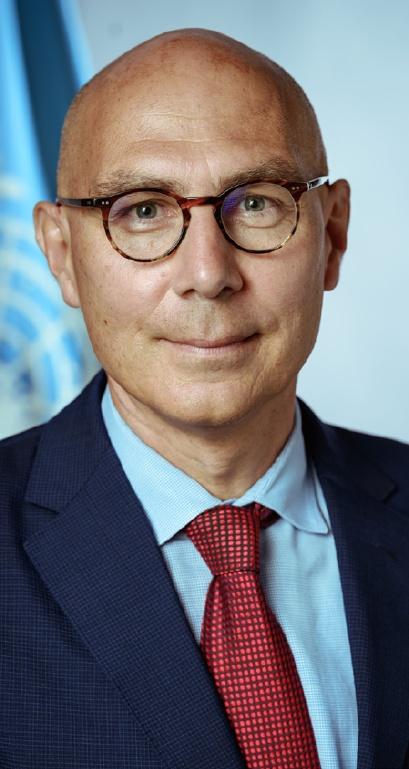
But instead, elections are often viewed as a winner-take-all contest, with seats in governments the spoils of conquest – rather than an opportunity to serve people and advance their rights. Politicians deliberately enflame antagonism and xenophobia to garner support, particularly in electoral periods.
In this headlong rush to abandon the common good for short-term personal benefit, they are tearing up the fundamental human rights principles that can unite us all.
The power of human rights is rooted in their universality – the equal value of every human life that is at their core. The same human rights standards must be deployed everywhere, and they must be benchmarks for future progress – not high-water marks from which we can recede.
Every human is born equal. All victims equally deserve justice. No one can be left behind. And nobody – no state, no institution and no leader –is above the law.

As host of this year’s G7 summit, Italy is prioritising engagement with Africa. But with historically low compliance on its development commitments, Italy needs to ensure the promises made are achievable for all
By Sonja Dobson, lead researcher, G7 Research GroupItaly’s G7 presidency is prioritising engagement with Africa, and focusing on relationships with developing countries and emerging economies. As peace has declined globally for the 13th year, the G7 must safeguard the development of all countries to ensure stability.
Since 1975, G7 leaders have dedicated an average of 17% of words in their communiqués to development. In 1975, 15% of words were on development. Lows came in 1984 with 3%, in 2003 with 4% and in 2004 with 1%. Highs came in 1979 with 26%, 1994 with 22%, 1996 with 20%, 2002 with an all-time high of 56%, 2005 with 27%, 2009 with 23% and 2011 with 36%. A sustained sequence of highs started in 2012 with 45%, and continued in 2013 with 39%, and 2014 with 36%, dropped slightly but remained relatively high at the next four summits, and had 38% in 2019. Then came a steep dip to 2% in 2020, followed by a rise to 17% in 2021, 18% in 2022 and 21% in 2023.
Since 1975 G7 leaders have made 761 commitments on development, the most on any subject. Each summit has averaged 16 development commitments. Leaders made just four commitments on development in 1975, but this accounted for 27% of the total. In 1976, they made only one, for 10%. The most commitments on development came in 2004 with 53, for 21%. Recently, the G7 made none in 2020, 15 (4%) in 2021, 14 (3%) in 2022 and 29 (4%) in 2023.
At summits hosted by Italy, the number of development commitments has generally risen. The 1980 Venice Summit produced four (7%) and the 1987 Venice Summit also made four (8%). The 1994 Naples Summit made six (11%) and the 2001 Genoa Summit made 10 (17%). The 2009 L’Aquila Summit jumped to 36 (14%). But the 2017 Taormina Summit made only two (1%).
According to the G7 Research Group, G7 members complied with their leaders’ development commitments on average at 75%, based on 61 commitments made between 1996 and 2022. This is just below the G7’s overall average of 77%. G7 development compliance gradually rose, but with much variation each year. It started slowly – with all-time lows of 50% in 1996, 1997 and 1998.
Compliance soared to 93% for 1999 but plummeted again to 50% for 2000. It again rose to 75% for 2001, declined to 55% for 2002, and then rose to 80% for 2003. After a decline to 75% for 2004, it rose to 85% for 2005 and to 94% for 2006. After this high, compliance again fluctuated between 2007 with 65% to 2015 in the mid-range with 75%. Then came a continued high: 81% for 2016 and 2017, 92% for 2018, 84% for 2019, 100% for 2021 and 88% for 2022. By December 2023, compliance on development for the 2023 Hiroshima Summit was 100%.
Higher development compliance is linked to some easy-to-implement measures. The highest compliance (92%) came on development commitments that referenced the core multilateral institution of the World Bank. Those referencing one-year timetables had 90%, those referencing
finance ministers had 87%, and those identifying a specific country had 77%. Commitments on debt relief averaged 76% and the 31 commitments on official development assistance averaged 74%.
Higher compliance also came when G7 development ministers’ meetings were held before the summit. Of the 11 years with ministerial meetings, nine were held before the summit, whose development commitments averaged 81% compliance. The two post-summit commitments averaged only 65%. Together, those years when development ministers met averaged 78%, higher than the 75% average for development commitments. Italy will host a development ministers’ meeting, but it will be in October, after June’s Apulia Summit.
At least six G7 summits established development working groups. The three years with high compliance – averaging 82% – established working groups on financing and sustainable development. The three years with low compliance, averaging 72%, focused on Africa.
Although Africa-focused commitments have lower compliance, Italy’s 2024 presidency is highlighting G7 partnerships with African countries. The
Apulia Summit will likely make several commitments related to Africa. To ensure these are implemented, G7 leaders should structure commitments to involve the World Bank specifically, have short timetables for realisation, and include finance ministers in discussions on financing and sustainable development. Furthermore, development commitments focused on a specific country achieve higher compliance than those that refer to Africa as a whole. Thus, G7 leaders’ commitments should focus on specific African countries, with those in North Africa the obvious candidates in 2024. Of the G7 members, Italy has the lowest compliance on development commitments at 62%, and overall compliance across all subjects of 63%. Based on historical data, the G7 Compliance Simulator, an AI predictor of G7 members’ compliance, predicts that Italy’s compliance with its 2023 Hiroshima commitments will remain low, with a probability of 47% for full compliance. It is therefore important for Italy to ensure that the development commitments made at the Apulia Summit are achievable, for itself and for all G7 members too.
performance on development, 1975–2023

SONJA DOBSON
Sonja Dobson is pursuing a PhD in peace and conflict studies at the National Centre for Peace and Conflict Studies at the University of Otago. She holds a master’s degree in conflict studies and human rights from Utrecht University and a bachelor of arts and science in African studies and political science from the University of Toronto. Sonja has worked with the G7, G20 and BRICS Research Groups since 2015, and served as co-chair of summit studies for the G20 Research Group in 2022. X-TWITTER @SAT_Dobson www.g7.utoronto.ca

Italy’s
G7
agenda takes a macro approach, exemplifying the direction the G7 may pursue to reset the global agenda – and it is coming at a crucial moment, with much of the world still off course to meet the Sustainable Development Goals
How far and fast is the world progressing to meet the Sustainable Development Goals by 2030?
In many parts of the world, we are still off course and we are chronically underinvesting in the Sustainable Development Goals. The United Nations Development Programme’s Human Development Report 2023/2024 found that a significant recovery from the Covid-19 pandemic is largely confined to high-income countries. It is not yet a recovery for low-income and least developed countries. Many developing countries simply don’t have the fiscal space to advance their development priorities including investing in job creation, education, health or their digital public infrastructure, because they’re paying back interest on their debts. Yet there are many positive signs. Investments in clean energy and net-zero transition strategies are now in the hundreds of billions of dollars. Last year, total investment in renewable clean energy infrastructure was some $1.8 trillion. And today around 5.5 billion people have internet access, compared to just one billion people in 2005. Digital is central to the energy transition, economic recovery, jobs and economic opportunities, so these are shining lights. Several countries will achieve many SDG targets and indicators by 2030. But as a global community, we have lost time and it is difficult to recover in such a short period.
How is UNDP working to reinforce progress?
Working alongside over 90 countries, UNDP produced SDG Insights Reports to pinpoint where their priorities coincide with, and differ from, the SDGs’ targets and indicators, and how to finance those priorities. With our partners, UNDP is also supporting over 80 countries in advancing Integrated National Financing Frameworks, which help them to see and leverage the full spectrum of available financing – domestic, international, concessional, public and private – to finance the SDGs.
As part of our Climate Promise initiative, UNDP is scaling up its support to over 125 countries to develop their third-generation climate pledges known as nationally determined contributions to be submitted in 2025 in advance of the UN climate change conference in Brazil. It is not only an unprecedented opportunity for all countries to play their part in limiting the global temperature rise to 1.5°C. NDCs are also a vital means to drive other national development objectives including job creation and poverty reduction. Problems such as climate change must be redefined as opportunities for investment for economic growth, as countries must meet their citizens’ aspirations while decarbonising their economies. To this end, many developing countries turn to UNDP as an implementing partner, including examining policy reforms, fossil fuel subsidies, regulatory frameworks for renewable energy investments and adaptation planning.
How is the Summit of the Future being designed? Against the backdrop of a world more inclined towards confrontation than cooperation, trying

Africa’s needs alone are in the hundreds of billions of dollars just for the clean energy transition. You cannot have the wealthy recovering and the poor unable to invest in the very elements that would help them recover”
40% of the world’s poorest people live in least developed countries
$1.8 trn investment in renewable clean energy infrastructure in 2023
to bring 193 countries around a drafting table to negotiate an outcome for the Summit of the Future is difficult. There are many things on which countries disagree, so we risk losing sight of the fact that there is much more on which countries concur. In this context, the UN secretary-general remains focused on an agenda for cooperation. The New Agenda for Peace and the Global Digital Compact will be unifying elements for the Summit of the Future and an antidote to a world drifting apart.
How will progress be affected by this year’s funding replenishments?
Development assistance overall has increased, but much of that increase focuses on support for
Achim Steiner has been the administrator of the United Nations Development Programme since 2017. He is also vice-chair of the UN Sustainable Development Group, which unites 40 entities of the UN system that work to support sustainable development. Prior to joining UNDP, he was director of the Oxford Martin School and professorial fellow of Balliol College at the University of Oxford. Mr Steiner led the UN Environment Programme (2006–2016) and was also director-general of the United Nations Office at Nairobi. He previously held other notable positions including director general of the International Union for the Conservation of Nature and secretary-general of the World Commission on Dams. X-TWITTER @Asteiner undp.org
Ukraine (8% of official development assistance) and in-country expenses for refugees (14%).
We hear much about ‘soft landings’ but for many developing countries, there may be hard ones, possibly including crashes with debt defaults. For many least developed countries, home to 40% of the world’s poorest people, and highly indebted middle-income countries, the international financial system has been unable to tackle the debt problem at the scale needed. The G7 and G20 carry some responsibility for this because in a world with more financial resources than at any point in human history, the 20% of the global economy not represented by the G20 risks paralysis and global economic and political insecurity without more assistance. A few countries in deep debt distress could have major consequences, including political destabilisation, polarisation, perhaps even violent conflict.
Therefore, to finance the SDGs including climate action and pandemic preparedness, we need to rethink how to attract more private-sector investment to drive the clean energy transition, digital public infrastructure and beyond. Africa’s needs alone are in the hundreds of billions of dollars just for the clean energy transition. You cannot have the wealthy recovering and the poor unable to invest in the very elements that would help them recover. Wealthy countries need to combine short-term measures to deal with the debt crisis with long-term measures to mobilise more public and private finance to invest in development that all agree is imperative, from decarbonisation to digitalisation.
How can G7 leaders at Apulia help?
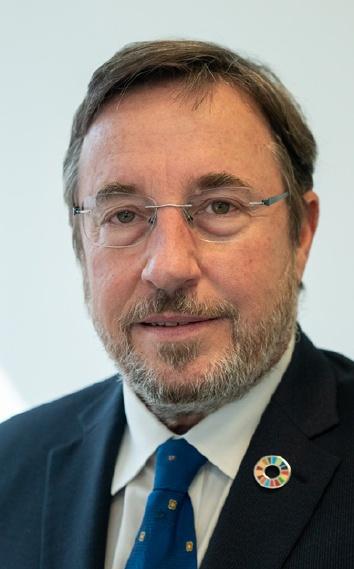
Italy’s Apulia Summit agenda includes a focus on addressing the concerns of the Global South. Prime Minister Giorgia Meloni has already hosted an Africa summit and launched the Mattei Plan. The G7 will examine the many possibilities for co-investing to expand Africa’s electricity infrastructure, hydrogen, gas pipelines, renewable energies, schools, hospitals and agriculture. Migration is also a contested issue among G7 members. Therefore, Apulia is a timely moment to better understand its root causes and systemic responses. Italy’s inclusion of artificial intelligence on the agenda is also welcome, as we seek the right regulatory instruments to proactively respond to this revolution.
We are also months away from the next UN climate change conference in Azerbaijan, where global leaders can build a new global climate finance framework. To arrive without answers could derail today’s growing momentum on investing in decarbonisation and more inclusive development pathways.
In short, Italy has focused the agenda on shared interests rather than just addressing a narrower economic and political security agenda. This broader, macro approach exemplifies the direction the G7 may pursue to spearhead a global agenda reset with an emphasis on bolstering multilateral cooperation and reshaping financing and investment frameworks. This is pivotal to ensure that all countries can play their part in tackling existential challenges including climate change, which transcend borders and require bold new approaches that cross long-standing international divides.
Africa is home to nine of the 10 most vulnerable countries to climate change, but receives just 3% of global climate finance. With support from the G7, the African Development Bank Group is ready to address this lack of support
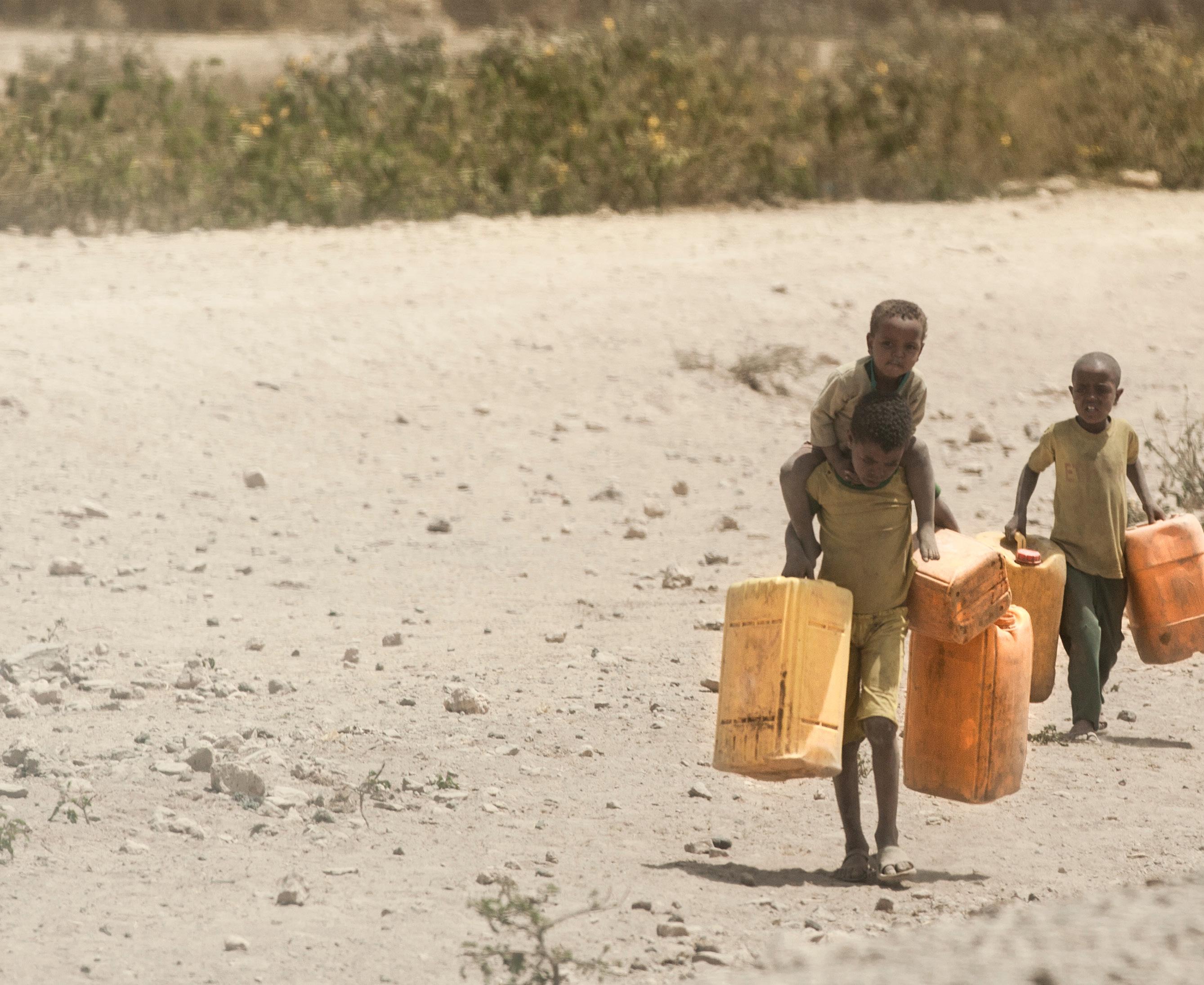 By Akinwumi A Adesina, president, African Development Bank Group
By Akinwumi A Adesina, president, African Development Bank Group
Since its establishment 60 years ago, the African Development Bank Group has been a major leader supporting Africa’s economic growth and development. It can rightly take pride in the progress to date.
The G7’s Apulia Summit is a crucial opportunity for global leaders to reflect on this progress and focus on the next steps along the road to a sustainable, developed and wealthy Africa.
Our High 5 priorities (Light up and power Africa, Feed Africa, Integrate Africa, Industrialise Africa and Improve the quality of life of the people of Africa), launched in 2016, have affected over 400
million people. According to the United Nations Development Programme, if Africa achieved the High 5s, it would achieve close to 90% of the Sustainable Development Goals and the African Union’s Agenda 2063.
The AfDB is responsive to geo-political shocks, mitigating their effects on African economies. When the Russian war in Ukraine erupted and posed great food security risks to Africa, we launched a $1.5 billion emergency food production facility, to support Africa in producing its own food and reducing dependency over a two-year period. As of April 2024, we have approved loans and grants of $1.496 billion for emergency food production in 35 countries. With $323 million of additional support from Japan, the United States, Norway, Germany and the Netherlands,
we have committed over $1.8 billion. So much has been achieved: the initiative has reached 10.5 million farmers and supported the production of 23 million tons of food, valued at $10.79 billion – or 90% of our target market value of $12 billion worth of food after less than two years.
Recognising that Africa has nine of the 10 countries most vulnerable to climate change and receives just 3% of global climate finance, the AfDB set out to address this challenge. We now devote 54% of our total approvals to climate finance, surpassing our target of 40%. We have rolled out a $25 billion African Adaptation Acceleration Program to support large-scale adaptation efforts, together with the Global Centre on Adaptation. It is the world’s largest climate adaptation programme.
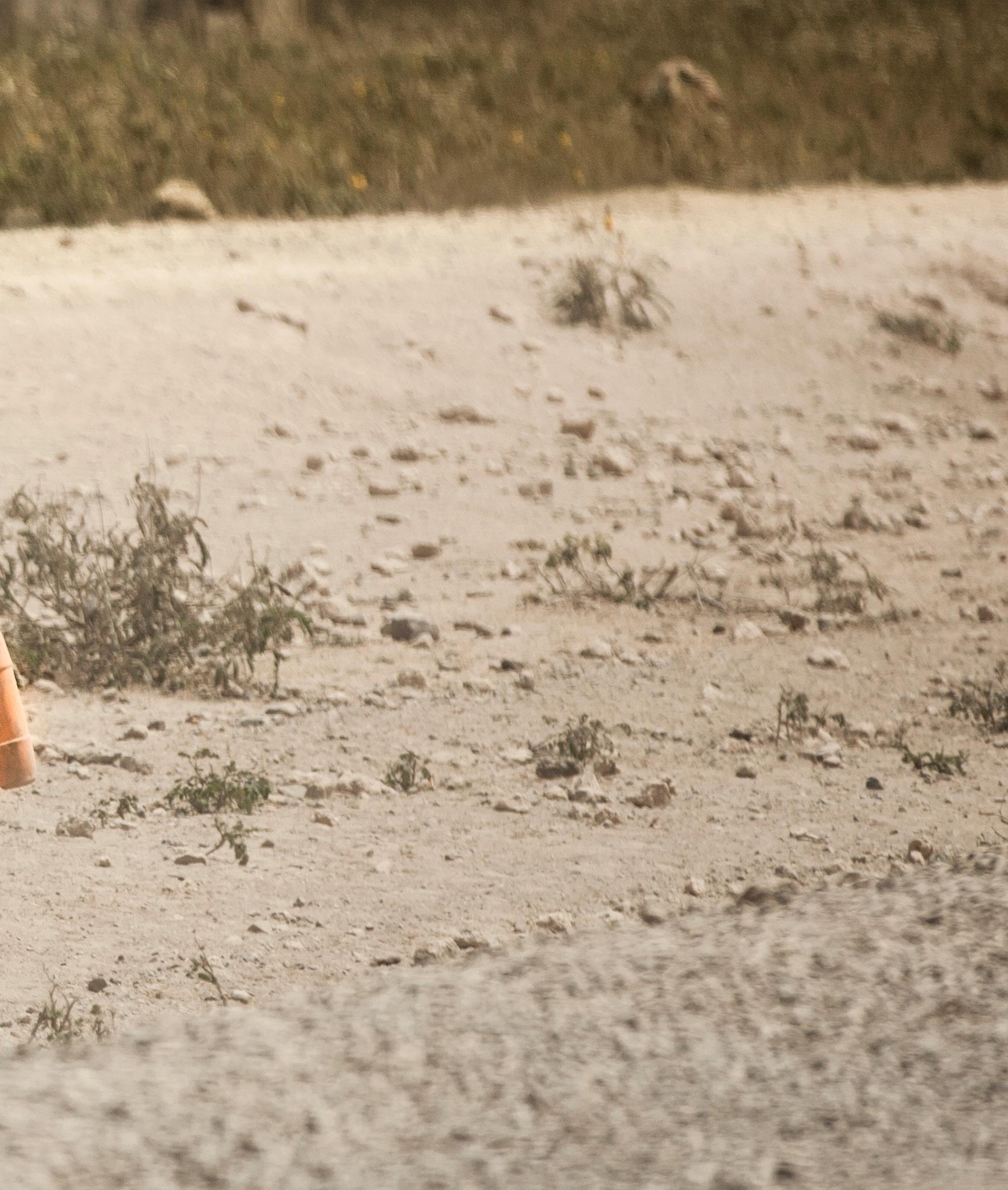
Moreover, the AfDB has established a Climate Action Window under its African Development Fund, to mobilise and channel resources efficiently for climate action. This initiative aims to provide accessible climate finance to the most vulnerable African countries and invest in climate adaptation, mitigation and technical assistance.
With initial funding of $429 million from international partners and plans to increase this to $13 billion, we are poised to significantly enhance support for Africa’s climate action strategies. The CAW will remain a building block of the African Development Fund’s 17th replenishment in 2025. The objective will be to triple the fund’s resources and mobilise $25 billion of additional concessional funding for African low-income countries.
The AfDB is spearheading the energy transition in Africa. Our $20 billion Desert-to-Power project will harness the solar energy of 11 Sahel countries and provide renewable electricity for 250 million people. When completed, it will be the largest solar zone in the world. In April, Ajay Banga, president of the World Bank Group, and I launched a bold effort to connect 300 million Africans to electricity by 2030.
In response to the G20 capital adequacy report’s call for multilateral development banks to scale up financial innovations to raise more resources in support of countries, the AfDB pioneered the issuance of $750 million in hybrid capital, the first by a multilateral development bank globally. We have helped to create a new asset class for institutional investors. The AfDB is also the only multilateral development bank to do synthetic securitisation, transferring the risks on its sovereign and non-sovereign portfolios to the private sector. We recently did a $2 billion synthetic securitisation of our sovereign operations, facilitated by a guarantee from the United Kingdom, freeing $2 billion to support finance in Africa.
The AfDB is also at the forefront of efforts to rechannel special drawing rights to multilateral development banks, which holds the greatest promise to leverage more resources. This allows SDRs to be leveraged by three to four times to deliver greater development outcomes for the continent. For example, a $10 billion SDR rechannelling to the AfDB will deliver $40 billion of additional lending resources to Africa.
The AfDB and the Inter-American Development Bank are working closely with the IMF to make this a reality. The IMF Executive Board recently approved the use of SDRs for hybrid capital, based on the framework model jointly developed by the AfDB and the IADB. G7 members can help turn this into reality by rechannelling SDRs to the multilateral development banks.
With other African and non-African partners, we have launched the Alliance for Green Infrastructure in Africa, a $10 billion initiative to address the lack of bankable green infrastructure projects, to accelerate Africa’s just and equitable transition to net zero, and to bridge the continent’s infrastructure gap in a low carbon and climate resilient manner, extensively leveraging the private sector.
The AGIA, which has already benefited from support from G7 members and other partners, will make transformative investments, such as in renewable energy or green hydrogen projects; sustainable transport projects, including e-mobility solutions; solar and hybrid energy for heavy industry; logistics companies; energy storage; water and sanitation; and new technologies.
Through G7 support, the AfDB is accelerating women’s access to finance through the Affirmative Finance Action for Women, in partnership with the Africa Guarantee Fund, working with 122 financial institutions in 36 countries. AFAWA is the first gender-focused collateralised significant risk transfer, with counter-guarantees provided by France and the Netherlands, in support of scaling up finance for women. So far it has approved $1.7 billion and financed over 8,000 women-owned businesses. By the end of 2024, AFAWA will reach $2.4 billion in support for 13,000 women-owned small and medium-sized enterprises.
The Africa Investment Forum, established in 2018 by the AfDB and several partners, has so far mobilised over $180 billion in investment interest in projects in Africa, and it has closed $10 billion in investment deals from around the world. It proves that Africa is a great investment destination.
As Africa’s solution bank, the African Development Bank Group will continue to innovate constantly and provide thought leadership for Africa’s development. We stand fully ready to work with the G7 and deliver more impressive results for Africa.

Akinwumi Adesina was elected president of the African Development Bank Group in 2015 and re-elected in 2020. He served Nigeria’s minister of agriculture and rural development from 2011 to 2015. Previously, he was vice president of the Alliance for a Green Revolution in Africa, and, earlier, served as associate director and regional director for the Southern Africa Office at the Rockefeller Foundation, principal economist for the West Africa Rice Development Association, senior economist for the International Institute for Tropical Agriculture and economist for the International Crops Research Institute for the Semiarid Tropics.
X-TWITTER @akin_adesina afdb.org
Investment underpinned by sound policies and programmes can turn around even the worse situations and transform lives – and, with support, the world’s most vulnerable countries can realise their potential
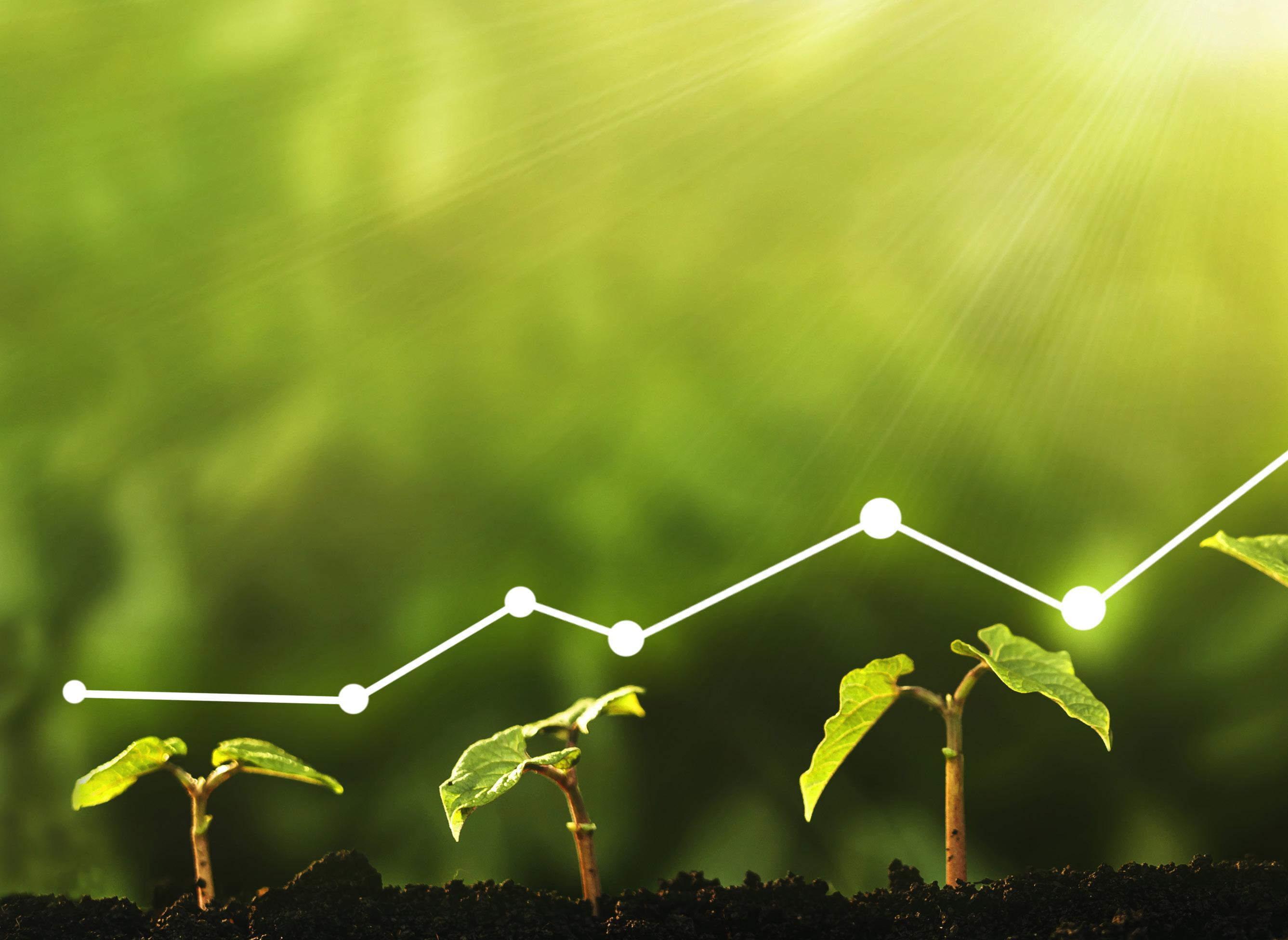 By Alvaro Lario, president, International Fund for Agricultural Development
By Alvaro Lario, president, International Fund for Agricultural Development
The world has a grave problem. After decades of closing the global income gap, the poorest countries are once again getting relatively poorer.
All 193 member states of the United Nations, including the G7 countries, have committed to achieving the Sustainable Development Goals by 2030, including the first SDG to end poverty, and the second, to end hunger. But progress has long been lagging – even before crises such as Covid-19 and the wars in Ukraine and Gaza disrupted geopolitics and the global economy.
G7 leaders meeting in Apulia have an opportunity to get back on track with progress on ending poverty and hunger. The need is urgent. Not just because freedom from hunger and poverty are fundamental human rights, but also because they drive inequality, fragility and instability.
If wealthier countries skimp on poverty prevention now, they risk spending vastly more on emergency
aid later. Decades of experience show that every dollar invested in resilience now saves up to $10 in emergency aid in the future. The more sensible, humane and fiscally responsible choice is to invest now in the world’s poorest countries – home to 1.9 billion people, or about 25% of humanity – so that their young populations can reach their potential.
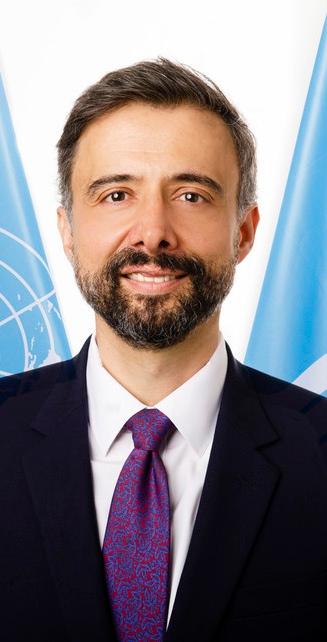
Alvaro Lario is president of the International Fund for Agricultural Development. He has more than 20 years’ experience in academia, private-sector asset management, the World Bank Group and the United Nations, including as IFAD’s associate vice-president of financial operations. Under his stewardship, IFAD became the first UN fund to enter capital markets and obtain a credit rating, enabling IFAD to expand resource mobilisation efforts to the private sector. Before joining IFAD in 2018, he was the treasury capital markets lead and principal portfolio officer at the International Finance Corporation.
@IFADPresident ifad.org

An April report from the World Bank gives some sobering numbers. One-third of the world’s 75 most vulnerable countries are getting poorer. And half are seeing their income gap with advanced economies widen. This reverses decades of progress.
Half the world’s poorest countries are in sub-Saharan Africa. In 31 of them, average annual income is below $1,315. And 33 are experiencing conflict.
Hunger and malnutrition are disproportionately present in vulnerable countries. And the cost of climate disasters has doubled over the past decades in the poorest countries, cutting their average gross domestic product by 1.3% a year. This is four times the impact on other emerging economies.
Yes. Geography is not destiny. Investment underpinned by sound policies and programmes can turn around even the worst situations and transform lives. China and India are now burgeoning economies. They used to be among the world’s most vulnerable. There is potential for many more success stories. Many of today’s most vulnerable countries have young populations, rich natural resources and
abundant sunshine for solar generation. Inclusive, sustainable and resilient growth is within their grasp. With better policies, stronger institutions, knowledge and, above all, investment, they could realise that potential, instead of spiralling further into poverty, fragility and conflict.
There is solid evidence that GDP growth generated by agriculture is more than twice as effective in reducing poverty than growth in any other sector. And successful agriculture can also limit conflict. An assessment of IFAD-backed projects by researchers at Cornell and La Sapienza universities found that in Ethiopia, for example, every 1% increase in farm output reduced conflict by 3%.
The vast majority of the world’s poorest people live in the rural areas of developing countries. Most depend on small farms for their food and income. And around half of the world’s food is grown on plots of less than five hectares.
The production of small farms is vital for nourishing humanity today, and in the years ahead. Rural communities also help preserve the world’s richest sources of biodiversity, including insect and animal life –and essential natural resources such as water and forests.
For societies to be resilient, they must provide sufficient and affordable food for all communities – no matter how remote – and to all people. To end poverty and hunger we need to invest in small-scale farmers, ensuring they have climate-resilient infrastructure, seeds, technology, knowledge and finance to sustain output and supply local and national markets.
of humanity lives in the world’s poorest countries 25% invested in preventing hunger and poverty now saves up to $10 in emergency aid in the future $1 of the world’s 75 most vulnerable countries are getting poorer 1/3
IFAD is an international financial institution and a UN agency. Its mission is to end rural poverty by providing grants and low-interest loans to development projects that create the conditions for poor rural women and men to grow and sell more food, increase their incomes and determine the direction of their own lives. IFAD prioritises those most in need, but it also focuses on strengthening food systems in vulnerable contexts.
In recent years, G7 members have stepped up to support IFAD at historic levels. IFAD aims to boost the prosperity and resilience of more than 100 million people in the period 2025–2027. We plan to deliver this through collaborating with other multilateral institutions, member states, the private sector and rural people themselves.
By jointly investing to build inclusive prosperity we can reduce poverty, improve nutrition and also dampen potential sources of conflict. I urge all states, including G7 members, to embrace investment in rural areas, in small-scale farmers and in food systems that are inclusive and sustainable – economically, socially and environmentally. Through such investment, we believe that an end to poverty and hunger can once more be within sight, and that a more just and peaceful world is possible.

Food security is a vital investment, but development funding is failing to keep pace with surging hunger in many parts of the world. With Italy placing food security high on its G7 agenda, it is time for global leaders to match words with action
By Cindy H McCain, executive director, World Food ProgrammeFor more than 70 years, Italian governments have generously supported the work of the United Nations in tackling global hunger and promoting sustainable agricultural development. Most tangibly, Italy hosts the global headquarters of the three UN agencies that lead this shared mission – including my organisation, the World Food Programme.
We are proud to call Rome our home. This decades-long commitment to alleviating hunger is reinforced by the Italian government’s decision to prioritise food security, sustainable development and stronger partnerships with the Global South as key objectives for its presidency of the G7 in 2024.
As G7 leaders gather for the summit in Apulia, it is essential that these commitments inspire concrete action and investment from the leading industrialised economies.
Hunger is surging in many parts of the world, but humanitarian and development funding is failing to keep pace with these growing needs. In a period when government budgets are tight and national politics are often fractured and complex, it is tempting to retreat and focus on domestic concerns. But this would be a historic mistake.
Food security, poverty reduction and sustainable development are not just humanitarian imperatives. They are also vital investments in our collective global security and stability.
WFP’s G7 manifesto sets out a series of practical measures that create four broad pillars to support global food security: building climate resilience and protecting our planet, empowering people to live and thrive in their own communities, promoting wider prosperity, and laying the foundations for greater peace and stability.
Although armed conflict remains the primary driver of hunger – illustrated most recently by the destructive violence in Sudan and Gaza – the climate crisis is plunging millions more people into food insecurity each year. Increased climate resilience is therefore critical for protecting the nutritional health of rural communities across the Global South.
For this reason, WFP is calling on G7 leaders to invest in effective early-warning and anticipatory action programmes to address the growing threat that our systems of food production face from a heating world. This needs to be matched by funding for programmes to restore degraded ecosystems and agricultural lands, build climate-smart infrastructure such as water storage and irrigation systems, and provide smallholder farmers with insurance protection against climate hazards.
Just as importantly, vulnerable communities must be empowered with
WFP is calling on G7 leaders to invest in effective early-warning and anticipatory action programmes to address the growing threat that our systems of food production face from a heating world”
determined by the availability of private sector capital and expertise, which will only flow freely if an attractive investment climate is on offer.
The international financial institutions can catalyse this process with seed funding for agriculture, infrastructure, health and education programmes at the national level. But G7 members must show global leadership on unlocking the necessary finance to fire up the engines of growth.
Finally, we need G7 leaders to use their diplomatic influence to broker solutions to the conflicts that sustain the suffering in hunger hotspots – from the Democratic Republic of the Congo, to Haiti, Syria and Yemen, and many other countries in-between.
We must break the vicious cycle of conflict and hunger that traps countless millions of families around the world, and this means using all possible leverage to create the conditions for increased stability and peace.
the skills and tools they need to escape hunger and achieve self-sufficiency.
National social protection systems, such as school feeding programmes, are potentially a game changer in reducing needs over the longer term. Similarly, local schemes that give smallholders access to new farming techniques and equipment, together with assistance to sell crops commercially, can transform the food security of entire communities.
These initiatives also promote broader prosperity by strengthening food systems and supporting sustainable livelihoods. Yet their ultimate success will be

Taken together, WFP’s manifesto proposals offer a blueprint for reducing humanitarian needs over time, while strengthening livelihoods and fostering long-term economic development for the most vulnerable populations. We stand ready to work with governments, the private sector and our humanitarian partners to rally the resources and resolve needed to implement these solutions at scale.
Italy has placed a clear commitment to food security and sustainable economic development high on the G7 agenda for the Apulia Summit. Now it is up to the global leaders gathered there to bring it to life. It is time to match words with real action.
Cindy Hensley McCain became the World Food Programme’s executive director in April 2023. A distinguished humanitarian, business leader and diplomat, she brings a wealth of expertise to the role. Prior to joining WFP, she served as United States ambassador to the United Nations agencies in Rome, and is the former chair of the board of trustees of Arizona State University’s McCain Institute for International Leadership. She has also served on the board of directors of Project C.U.R.E, CARE, Operation Smile and Halo Trust, and was chair of her family’s business, Hensley Beverage Company. X-TWITTER @wfpchief wfp.org
Health has featured on the G7’s agenda almost since the leaders first met. They made their first health commitment in 1979 when the G7 committed to working with developing countries on hunger and malnutrition. Since then, the G7 has played a leadership role by working to improve infant, child and maternal health, and addressing infectious diseases including HIV/AIDS, malaria and Covid-19.
Recognising that the health of humans, domestic and wild animals, plants, and the wider environment (including ecosystems) are intertwined and interdependent, the G7 recently adopted the One Health approach in its commitments. This integrated, unifying approach aims to sustainably balance and optimise the health of people, animals and ecosystems.
Since the first summit in 1975, G7 leaders have dedicated 63,798 words to health, averaging 1,302 (9%) per summit. They have produced many stand-alone documents on health.
Although health first appeared in G7 discussions in 1979, it was not until 1996 that it began appearing at every summit. The highest number of words dedicated to health was in 2016 at 6,087 (for 26% of the communiqué). Between 2001 and 2016, health peaked in the 20–30% range: 2001 had 24%, 2003 had 22%, 2006 had 23%, and 2010 and 2016 had 26% each. The focus on health then decreased, with
Health has long featured on the G7’s agenda and compliance has been higher than average –but there is still room for improvement, and there are several ways in which the group can increase momentum in this area
health accounting for only 10% of words in 2017, 6% in 2018 and 16% in 2019.
The Covid-19 pandemic renewed the G7’s attention on health, with the number of words achieving a high of 72% in 2020, decreasing to 24% in 2021, rising to 36% in 2022 and then decreasing to 17% in 2023.

G7 leaders have made 588 core collective, politically binding, future-oriented health commitments. These cover, among other issues, strengthening the global health architecture, addressing malnutrition, supporting health research and achieving universal health coverage.
Between 1979 and 1999, health commitments represented less than 10% of the total commitments per summit. This rose to 13% in 2000, dropped to 5% in 2001, increased to 10% in 2002 and dipped below 10% for the next three summits before it reached a new peak of 18% in 2006. Other peaks came in 2010 with 17%, 2015 with 16% and 2016 with 24%.
In response to the pandemic, 2020 produced the highest peak, with 44%. It then decreased to 21% in 2021, 7% in 2022 and 5% in 2023.
The G7 Research Group has assessed 96 of the 588 health commitments for members’ compliance. Overall, health compliance averages 78%, slightly above the 77% overall average.
G7 compliance on health is inconsistent, subject to several peaks and dips. The first commitments assessed in 1983 and 1997 received full 100% compliance. Compliance for 1998 was 68% but dropped to 50% for 1999. It rose to 91% for 2000 and 94% for 2001. Other peaks came for 2003 with 90%, 2007 with 86%, 2012 with 100%, 2013 with
86%, 2014 with 92% and 2015 with 86%.
The G7’s lowest compliance score came for 2017, with just 25%. It then increased but remained low at 53% for 2018. It rose to 72% for 2019 and again to 98% for 2020. It declined a little but stayed high at 92% for 2021, and dipped to 84% in 2022. Halfway between the 2023 and 2024 summits, G7
members had achieved 94% compliance.
How can the G7 maintain its momentum or improve its compliance?
First, analysis reveals that commitments that refer to the responsible core international organisation – the World
Hélène Emorine is a senior researcher at the G7 Research Group, based at Trinity College in the University of Toronto. She holds an MSc in global governance and diplomacy from the University of Oxford. Her research focuses on cooperation between states, non-state actors and the private sector through international and plurilateral institutions. The views expressed here are her own.
@heleneemorine www.g7.utoronto.ca
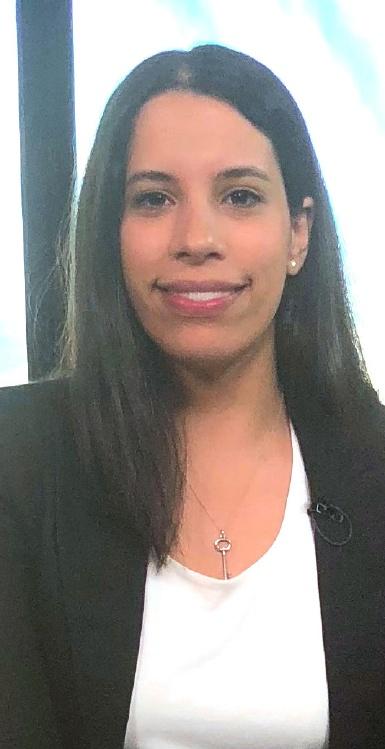
Health Organization – average 83% and those that refer to the United Nations average 91%, well above the 78% average for health commitments and 77% overall average.
Second, commitments made at the seven summits where there were pre-summit health ministerial meetings (2006, 2015, 2016, 2017, 2020, 2021, 2022, 2023) averaged 83% compliance, higher than the 76% average for health commitments made at summits without health ministerials. In 2020 G7 health ministers began meeting multiple times, supporting consistently high compliance in those years: they met four times in 2020, five times in 2021, four times in 2022 and twice in 2023. The combined average of these four summits (including interim compliance from 2023) is 92%.
Thus, the G7 should always hold a pre-summit meeting of health ministers to harness the momentum produced by the G7’s high performance in 2023 and in recent years. The G7 should also find synergies with the UN and the WHO, including by including the WHO director-general and the UN secretary-general at the leaders’ meeting.
The next pandemic is not a matter of if, but when, and we must learn from the failings of the global response to Covid-19. To this end, a new legally binding framework addresses how countries will cooperate, rather than compete, to counter the threat of a future pandemic
By Tedros Adhanom Ghebreyesus, director-general, World Health
For many, the Covid-19 pandemic is already fading from memory, a bad dream that is disappearing into the mists of the past. After the suffering so many people endured, it is understandable that they want to move on, and there are many other crises dominating headlines and rightly demanding the attention of world leaders.
But we forget at our peril. History teaches us that the next pandemic is not a matter of if, but when. It may be in our lifetime; it may not come for another 100 years or
more. But it will come. Local outbreaks and regional epidemics of deadly diseases happen all the time.
We must learn from the mistakes of the past and address the gaps in global health security that the pandemic exposed. The lack of coordination and cooperation among countries was one of the greatest failings of the global response to Covid-19. Countries became competitors, rather than cooperators, especially in seeking access to vaccines.
While the development of multiple safe and effective vaccines in such a rapid time was an unprecedented triumph of science, before a single jab reached an arm, high-income countries used their financial muscle to preorder most of the world’s supply – often
ordering more than they might ever need – leaving lower-income countries behind, waiting for leftovers.
Of course, every sovereign government is responsible for protecting its people. But in a pandemic, no country can truly protect itself without working with other countries – especially those with the least financial, technical or political capital – to ensure they too are protected. A global threat demands a global, coordinated response.
Recognising this, in 2021, the countries of the world decided to strengthen the International Health Regulations and to develop an international agreement on

pandemic preparedness and response –a legally binding framework for how they will work together to counter the threat of a future pandemic.
This historic, generational effort to work across borders and regions for a safer and more equitable world has faced hurdles. Just as the response to the pandemic itself was hampered by mis- and disinformation, so the agreement’s negotiators have had to operate amid a frenzy of falsehoods, principally that the agreement will cede sovereignty to the World Health Organization, giving it power to impose lockdowns or vaccine mandates on countries.
These claims are completely false. The WHO does not have, has never had and is not trying to attain the power to dictate public health policy for any country, or to impose public health measures on any country.
The WHO Pandemic Agreement is being written by countries, for countries. It will be implemented in countries in accordance with their own national laws. No country

The WHO Pandemic Agreement is being written by countries, for countries. It will be implemented in countries in accordance with their own national laws”
will be signing away its sovereignty to the WHO. As an agency of the United Nations, the WHO makes recommendations to countries, but we cannot tell them what to do. Nor would we want to.
This is not a choice between global health security and national or regional interests. It is about working together towards a safer, healthier and more equitable world for all.
Legally binding international agreements are not new. They are a tool that countries have used often since the end of the Second World War to meet common threats with a common response: the Geneva Conventions, the UN Charter, the Nuclear Non-Proliferation Treaty, the Paris Agreement, the WHO Framework Convention on Tobacco Control and the WHO Constitution, to name a few.
Even as negotiations for an overarching framework are ongoing, much has already happened to strengthen the global health security architecture. In the past two years, the WHO, our member states and partners established several initiatives to detect outbreaks earlier, strengthen sharing of biological samples and sequences, expand regional manufacturing of vaccines and other tools, improve equitable access to medical countermeasures, and strengthen financing of national preparedness and response capacities, especially in lower-income countries.
In a world facing increasingly complex and compounded challenges, from conflict to climate change, resource depletion to overstretched health systems, it does no good to bury our heads in the sand. In his classic novel La Peste, Albert Camus wrote, “There have been as many plagues as wars in history, yet always plagues and wars take people equally by surprise”. As the generation that lived through the Covid-19 crisis, we have a collective responsibility to protect future generations from the suffering we endured.
We have no future but a common future.

Tedros Adhanom Ghebreyesus was elected director-general of the World Health Organization in 2017 and re-elected for a second term in 2022. He is the first person from the WHO African Region to serve as WHO’s chief technical and administrative officer. He served as Ethiopia’s minister of foreign affairs from 2012 to 2016 and minister of health from 2005 to 2012. He was elected chair of the Global Fund to Fight AIDS, Tuberculosis and Malaria Board in 2009, and previously chaired the Roll Back Malaria Partnership Board, and co-chaired the Partnership for Maternal, Newborn and Child Health Board. X-TWITTER @DrTedros who.int

G7 leaders gather at a moment when the world is not only off track in meeting agreed goals, but off kilter, with rising tensions risking a loss of confidence in multilateralism itself. The reinvigoration of multilateralism is vital for overcoming the challenges ahead: as the Covid-19 and AIDS pandemics have shown us, human security depends on how well we cooperate.
G7 chair Italy has emphasised the need to “build a model of cooperation” with the countries of the Global South in which “strategic investments tie our futures together” in ways that are “mutually beneficial”. The G7, working in coordination with the G20 and the
G7 action on debt, tax and access to technologies can enable health security for all and show the world that multilateralism works
By Winnie Byanyima, executive director, UNAIDS and under-secretarygeneral, United NationsUnited Nations, can realise this vision through supporting courageous reforms in the international architecture.
First, it needs to deal effectively with debt restructuring. As key creditors, influential global leaders and members of the G20, G7 members play essential roles in freeing up the very excessive debt repayments of low- and middle-income countries.
Half of the countries in sub-Saharan Africa are either in debt distress or at high risk of it, spending, on average, three times more on repaying debt services than they do on health. If this is left unaddressed, it will be dangerous –not only for Africa but for the whole world. Coordinated significant relief and restructuring of debts to both public and private creditors, facilitated by improvements in banking rules in the G7 jurisdictions under which global firms operate, will be good for everyone in the world – by enabling the health security, stability and the prosperity of future generations. Among other achievements, G7 members have powered global progress towards the end of AIDS by contributing 74% of all official development assistance towards health and 89% of all international assistance for HIV. Continued action by G7 members to ensure sufficient financing for HIV, through intensified aid alongside action on debt, can enable the end of AIDS as a public health threat this decade, make sure those gains are sustained and enable the world to be ready for the pandemics to come. Alongside these health impacts, projections demonstrate that the long-term financial costs of action are vastly lower than the financial costs of inaction.
Second, G7 members are rightly keen to see low- and middle-income countries become more self-reliant fiscally and need to support the growth of new avenues for those countries’ domestic revenue collection. Brazil, host of November’s G20 summit in Rio de Janeiro, has placed the establishment of new taxes on the agenda as a way to source revenue that can be invested in health and other social priorities. Needs highlighted in G20 discussions, which the G7 can help advance, include taxes on the wealth and capital gains of individuals
Half of the countries in sub-Saharan Africa are either in debt distress or at high risk of it, spending, on average, three times more on repaying debt services than they do on health”
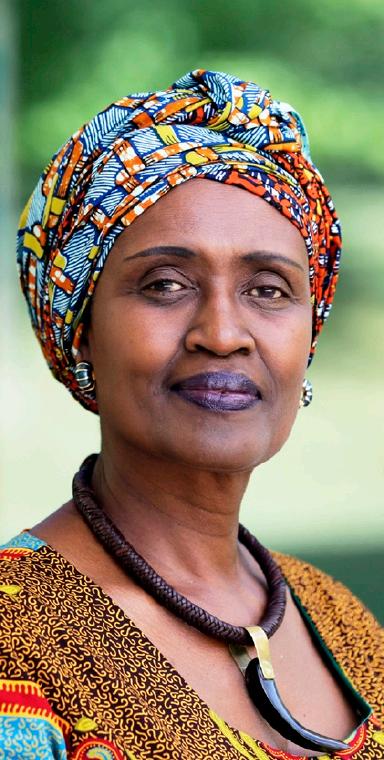
Winnie Byanyima is the executive director of UNAIDS and an undersecretary-general of the United Nations. A passionate and longstanding champion of social justice and gender equality, she leads the UN’s efforts to end the AIDS epidemic by 2030. She believes that health care is a human right and was an early champion of a people’s vaccine against the coronavirus that should be available and free of charge to everyone, everywhere.
X-TWITTER @Winnie_Byanyima unaids.org
and companies to reduce inequality, with the collected revenues redeployed for social priorities such as health, HIV, child welfare, gender equality and social protection.
Third, G7 members have a vital role, and a clear strategic self-interest, in making sure everyone in the world has access to the most advanced and most effective health technologies to ensure global health security. This requires support for reforms for which low- and middle-income countries have been advocating, so that intellectual property rights do not act as a barrier to access to life-saving medicine, alongside support for growing capacity in the Global South for domestic research, development and production of assured-quality health technologies.
As countries gear up for the UN’s Summit for the Future in September, the Apulia Summit provides an opportunity for G7 members to demonstrate that they are ready to enable that future and help set it in motion.
The health security of us all depends on cooperation for a restructuring of debt, progressive taxation and equitable access to health technologies. Such an approach is achievable, and essential, and is core to the mandate of the G7 and to the vision set out by Italy as G7 chair. Leaders have a poly-opportunity. Whether the G7 and G20 seize that opportunity will help determine whether the world successfully navigates the challenges of this decade and beyond. The health of all of us depends on it.
Since Covid-19, health issues divide people. Those with the power to make change must consider the establishment of trust as a key public health goal and a critical factor for the survival of democracies
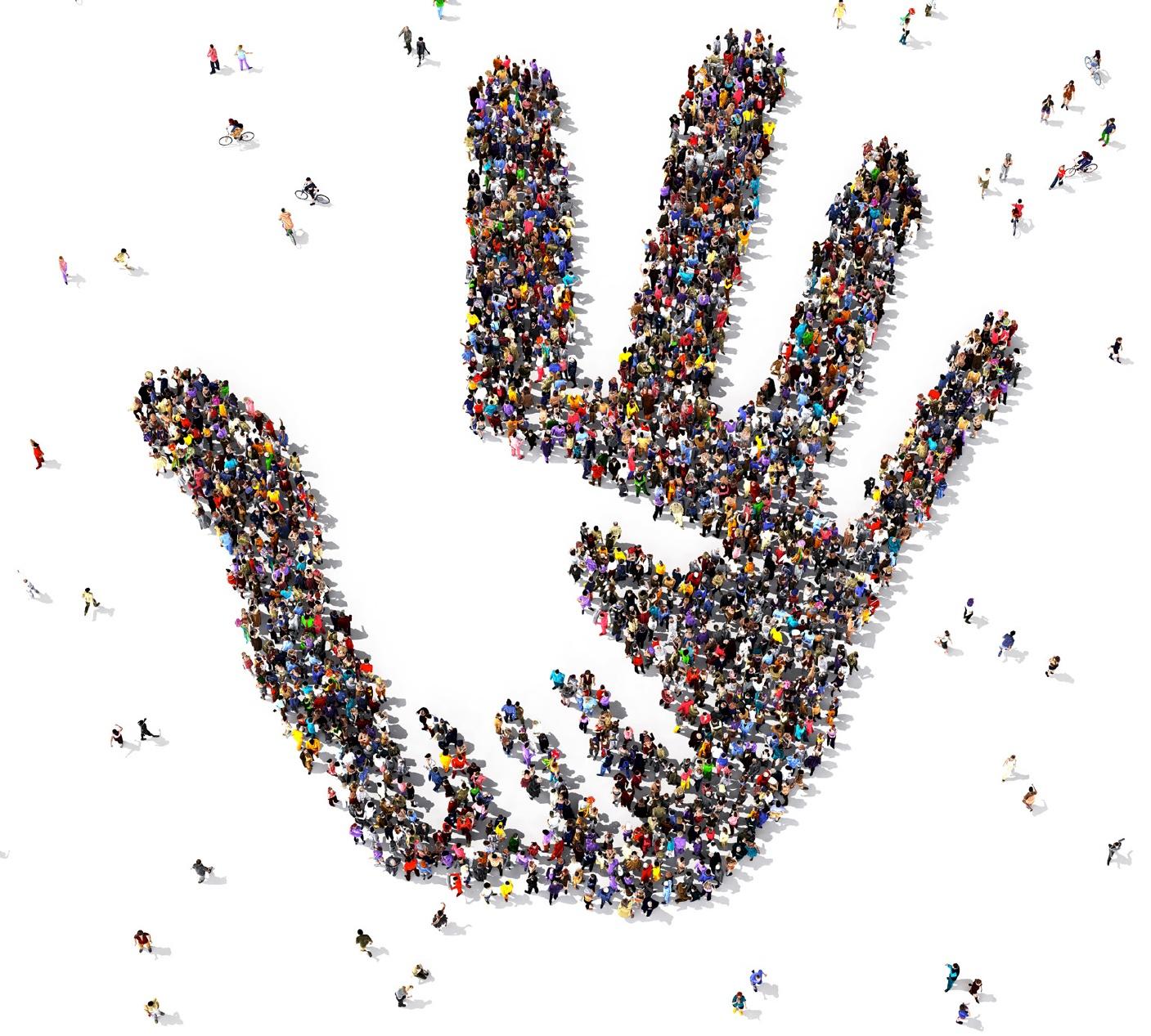
Throughout the G7 members we are witnessing a significant trust gap in government and its institutions, including in public health. This is partly a response to the measures taken – or not taken – during the Covid-19 pandemic, but, as recent surveys show, the lack of trust goes much deeper and has been developing over a longer time. A recent report by the Pew Research Center showed that a median of nearly 60% of people surveyed in 24 countries are dissatisfied with how democracy is working. This must be a wake-up call for the G7, which defines itself as a ‘club of democracies’.
Trust has been the key factor explaining the difference among countries with respect to Covid-19 outcomes. Trust in government
By Ilona Kickbusch, founding director, Global Health Centre, Graduate Institute of International and Development Studiesimproves outcomes, as does interpersonal trust. Research shows little indication that authoritarian regimes performed better than democracies with high levels of trust. The trust gap has strong links to the equity gap and more unequal societies showed higher Covid-19 death rates. This too, has increased in many countries. The country that did best is not a G7 member: it is Taiwan, which ranks high on the democracy index.
Recent surveys show that democracy has continued to contract worldwide, with declines in at least one indicator of
The trust gap has strong links to the equity gap and more unequal societies showed higher Covid-19 death rates”
democratic performance. Performance of democracies, especially in periods of crisis, is the concern at stake. Obviously, this includes many different dimensions, but for many people it relates to the issue of whether democracies are delivering on their promise of equity, security and participation. Indeed, in his book How Democracy Ends, David Runciman highlights two factors that are essential: democracies must offer people dignity and long-term benefits. Both are rooted in solidarity. Both are critical for health and well-being.
Accordingly, the 2023 Global Preparedness Monitoring Board Annual Report notes that restoring trust is a “long-term exercise and must begin now with the implementation of trust-building measures, including making governance more inclusive, engaging civil society, taking preparedness closer to the populations most in need, and investing in monitoring as the foundation of mutual accountability”.
Well-functioning health systems are a central feature of the social contract between governments and their people. The World Health Organization’s constitution highlights the right to health and Sustainable Development Goal 3 calls for access to health care without the threat of falling into financial hardship – termed universal health coverage. To deliver on this promise, countries need to have strong, efficient and equitable health systems that are rooted in the communities they serve.
reduce inequities, minimising administrative burdens and investing in social services among children and working-age adults, according to the Commonwealth Fund in 2021. Most G7 countries are struggling to meet the challenges facing healthcare systems in terms of both delivery and financing, even more so in the wake of Covid-19.
Since this 2021 analysis, the competition for resources has also increased as a changed geopolitical situation has led to significant shifts in budgetary allocations towards military expenditures. People experience this crunch in significant ways: longer waiting times, increases in premiums and costs of medicines, neglect of prevention and lack of care. Increasingly, health care offers people neither dignity nor security and they experience a lack of fairness as affordability and access decline.
Democracies need healthcare systems and public health institutions that inspire trust. Health and well-being in the past have brought people together in a common commitment to a system that serves all people – but following on from Covid-19 health issues now divide people. Measles is back in the world’s most developed countries as parents have lost trust in vaccines. The evidence base of public health actions is questioned as people have lost trust in science. Misinformation and disinformation on many health issues spreads through social media, as people have lost trust in official sources of information. Ministers of health, public health institutions and professionals need to consider the establishment of trust as a key public health goal and a central component of pandemic preparedness. Health systems must inspire trust – they are key for the two critical factors for the survival of democracies that Runciman has proposed: dignity and long-term benefits. If the G7 members are serious about democracy, they must urgently address the lack of trust as a risk factor for health.
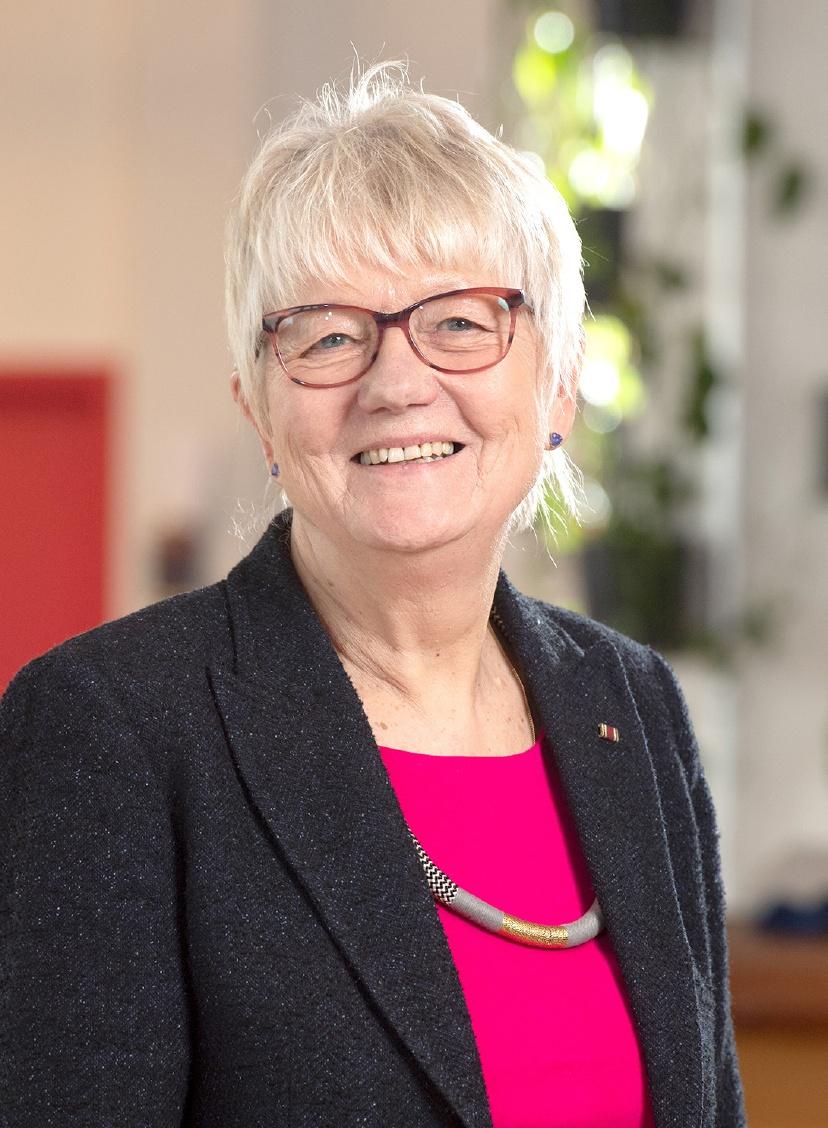
The G7 countries rank very differently in relation to health equity and performance. The high performers stand apart from the United States in providing universal coverage and removing cost barriers, investing in primary care systems to
llona Kickbusch is the founding director of the Global Health Centre at the Graduate Institute of International and Development Studies in Geneva. She is a member of the Global Preparedness Monitoring Board and the WHO Council on the Economics of Health for All. She is co-chair of the World Health Summit Council. She previously had a distinguished career with the World Health Organization and Yale University, and has published widely on global health governance and global health diplomacy. She directs the Digital Transformations for Health Lab. She and John Kirton are co-editors of, most recently, Health: A Political Choice –Advancing Indigenous Peoples’ Rights and Well-Being X-TWITTER @IlonaKickbusch ilonakickbusch.com
G7 members face a growing demographic gap. The world’s population exceeds 8 billion people, but two-thirds live where birth rates have fallen below the replacement level of 2.1 births per woman. These trends in mortality and fertility illustrate demographic transitions – from higher to lower – in different countries and contexts. More people are getting old than are being born, as in Japan where the life expectancy is 85 years and the fertility rate is 1.3 children per woman.
Implementing neurological, mental and social brain health at the global level needs to be based on ‘the least that yields the most’ – and G7 leaders can play their part by declaring it a top priority, coordinating policies and taking a One Health approach
By Vladimir Hachinski, Western University; Matilde Leonardi, Neurological Institute C Besta, Elena Moro, Grenoble Alpes University, and Paul Boon, Ghent University and Eindhoven University of TechnologyThis gap has profound implications. Increasing age means rising risks of stroke, heart disease and dementia. The fast-paced demographic shifts are only one aspect of the issue; another is changing lifestyle and other risk factors causing many neurological diseases, which are the leading cause of disability-adjusted life years and the second leading cause of death globally. Despite the high global burden of neurological conditions, access to prevention services is insufficient, especially in low- and middle-income countries.

Little is done until people become symptomatic. For example, two drugs slow progression to dementia, as do intensive lifestyle changes. Both have limitations: by the time people are symptomatic,
accumulated brain pathologies limit improvements; drugs are expensive and unscalable; and the number of symptomatic people increases as populations age.
We need to change our approach.
The World Health Organization’s Intersectoral Global Action Plan on epilepsy and other neurological disorders provides a global plan for improving brain health worldwide. It has five strategic objectives: to raise policy prioritisation and strengthen governance; provide effective, timely and responsive diagnosis, treatment and care; implement strategies for promotion and prevention; foster research and innovation and strengthen information systems; and strengthen the public health approach. Ten global targets with measurable indicators will track the achievements by 2031. To reach these targets, the plan outlines close collaboration between stakeholders in the health sector and beyond, and the need to support the participation and empowerment of people with neurological disorders, their carers and families. The World Federation of Neurology together with other regional societies have developed their own plans. Several countries are also launching brain health strategies (including Italy, Finland, Norway and Switzerland).
The European Academy of Neurology started the Brain Health Mission campaign to increase understanding and collaboration towards the final goal of the primary prevention of neurological disorders. It has established a leadership programme and forum with the European National Neurological Societies, as well as the Brain Health School Challenge and the Advocacy Training Programme. It also created a task force focused on the impact of climate and environmental changes on neurological disorders. EAN is also investigating the role of artificial intelligence in diagnosing and managing neurological disorders and is preparing new generations of medical students and neurologists for the next decade.
The burden of neurological disorders is compounded by stigma and discrimination, hampering life opportunities, increasing poverty risk and creating difficulties in accessing care. Many neurological disorders are preventable, and much progress is being made in treatments and research. To achieve maximum uptake, health
Vladimir Hachinski is a professor of neurology and a scientist at Western University in London, Canada. He has made major contributions to the understanding, diagnosis, treatment and prevention of stroke and dementia, most notably his concept of vascular cognitive impairment and the Hachinski ischemic score. He currently leads a multi-disciplinary team of experts in Western’s Community Integral Brain Health Initiative.

information and interventions for disease prevention and improved health care should be directed towards the affected populations and developed collaboratively with the concerned communities implementing interventions tailored to local circumstances.

Matilde Leonardi is the director of the Neurology, Public Health, Disability Unit and Coma Research Centre at the Foundation IRCCS Neurological Institute C Besta in Milan, where she also leads the Italian WHO-Collaborating Centre Research Branch. She is a board member and chair of the communication committee of the European Academy of Neurology.
Elena Moro is a professor of neurology at the Grenoble Alpes University and coordinator of the department of neurology, psychiatry, forensic medicine and neurological rehabilitation at the CHU of Grenoble. She is president-elect of the European Academy of Neurology.

Paul Boon is a senior full professor and director of neuroscience at Ghent University, where he is also chair of the Division of Head, Movement and Senses. He also teaches neuromodulation at Eindhoven University of Technology, and is the president of the European Academy of Neurology.

An abyss exists between what is being done and what needs to be done, and an abyss cannot be crossed in little steps. We need to be bold and adopt global, multi-level, pragmatic solutions to foster brain health throughout the life course, as advocated by the WHO. It defines brain health as “a state of brain functioning across cognitive, sensory, socio-emotional, behavioural and motor domains, allowing a person to realise their full potential over the life course, irrespective of the presence or absence of disorders”, which can be operationalised as “a state of optimal cerebral, mental, and social function in a safe, healthy, and supportive environment”. This definition is based on the WHO’s five determinants of brain health: physical health, healthy environment, safety and security, life-long learning and social connection, and access to quality services. Implementing brain health has to be simple enough that it can be followed by most people in most settings based on what is the least that yields the most: Activity and sleep, a Balanced diet and blood pressure control, and Connections that promote cerebral, mental and social function.
High-level brain health plans require grassroots initiatives in actionable units, small enough to have a sense of community capable of connecting information with motivation and implementation.
G7 leaders at the Apulia Summit can:
1. declare life course brain health (neurological, mental, social) as a top priority;
2. coordinate, integrate and catalyse brain and mental health policies; and
3. link global, regional and national brain health plans and energise them to implement a One Health approach with brain health at the centre of healthcare systems, policies and interventions. If only 10% of people change their mindset, changes follow quickly. We all need to change our own mindsets from tackling problems to preventing them.

As host of this year’s G7 summit, Italy will ensure that great attention is paid to migration, noting that the topic is closely linked to other areas such as climate change and food insecurity – and there are several ways in which the G7 can improve its performance in this area
G7 leaders have addressed migration with increasing frequency in recent years. Russia’s invasion of Ukraine in 2022 caused a significant rise in displacement and forced migration, prompting G7 leaders to increase their attention to this topic. Italy has included migration and refugees in the priorities for the Apulia Summit, and its focus on Ukraine underscores the crucial importance of a timely, effective and ambitious approach to tackle the related challenges.
From the first G7 summit in 1975 to the 2023 Hiroshima Summit, leaders produced 8,379 words on migration and refugees in their communiqués, averaging 171 words, or 2%, per summit. The highest total was at the 2016 Ise-Shima Summit with 2,581 words (20%), following the refugee crisis resulting from the Syrian civil war.
Attention to migration and refugees then gradually decreased, with the 2020 and 2021 summits producing no words on the subject. It picked up again following the full-scale war in Ukraine that started in February 2022. The 2022 Elmau and 2023
By Maria Zelenova, senior researcher, G7 Research GroupHiroshima summits dedicated 113 (1%) and 665 (2%) words, respectively.
G7 leaders have produced 75 commitments on migration and refugees since 1975. They have done so sporadically, with three at the 1979 Tokyo Summit, for 5% of the total. They made commitments at only seven of the 18 summits between 1980 and 1997: fewer than three per summit and ranging between 1% and 5% of the total.
At Birmingham in 1998, they made four commitments on migration and refugees, then one (1%) in 2002, before leaping to eight (3%) in 2004, but dropping back to the norm of between zero and three (1% or lower) between 2005 and 2014.
MARIA ZELENOVA
Maria Zelenova is a senior researcher with the G7 and G20 Research Groups. Based in Paris, she holds a BA in political science and history from the University of Toronto and an MA in international security from Sciences Po Paris.
Twitter @maria__zelenova www.g7.utoronto.ca

A relatively more consistent period of higher decision making on migration and refugees started in 2015 with seven (2%) commitments, followed by a new peak of 11 (3%) in 2016, sustained at eight (4%) in 2017 when Italy last hosted. A four-year dip followed, with just two (1%) made in 2018 and a complete absence from 2019 to 2021. This rebounded in 2022 with eight commitments (1%) and in 2023 with nine (1%).
Of these 75 commitments, 16 were assessed for compliance by the G7 Research Group, which found an average 77% compliance, on par with the average 77% across all subjects. The first assessed commitments were made at 1998 Birmingham, with 67% compliance. This rose to 84% for 2004 Sea Island. The highest compliance was achieved for 2014, with a near perfect 97%. High compliance
also came for 2015, with 88%. In the years that followed this declined with 54% for 2016, 79% for 2017, 57% for 2018 and 63% for 2022. By December 2023, compliance with one commitment on forced labour – an issue closely linked with the exploitation of vulnerable migrants and refugees – made at Hiroshima averaged 75%.
Compared to other subjects, only a limited number of commitments on migration and refugees have been assessed for compliance. This makes it difficult to identify definitive causes of compliance. Nonetheless, research suggests some ways to improve G7 performance on migration and refugees. Holding same-subject pre-summit ministerial meetings improves compliance with leaders’ commitments on that subject. G7 immigration ministers have never met, and are not scheduled to meet during Italy’s 2024 presidency, although Italy could add a post-summit meeting. The G7, moving forward, should add such pre-summit ministerial meetings, and ones that produce ambitious communiqués to increase global collaboration on migration and refugees. Second, commitments that refer to democracy and human rights have been
The G7, moving forward, should add such pre-summit ministerial meetings, and ones that produce ambitious communiqués to increase global collaboration on migration and refugees”
associated with higher compliance. The G7’s migration and refugee commitments deal directly with issues such as human trafficking and modern slavery, but only one of the 75 commitments has referred explicitly to human rights. It was made in 1995 (and has not yet been assessed for compliance). Yet this cross-cutting topic is linked with multiple sectors, including the
G7’s core mission of promoting democracy and individual liberty. Leaders should incorporate more explicit references to democracy and human rights in commitments on migration and refugees. Third, communiqué-recognised severe shock-activated vulnerability has also been associated with higher compliance. The two commitments that mentioned the Syrian refugee crisis achieved higher-than-average compliance at 91%. By contrast, the one assessed commitment on Ukrainian refugees secured only 63%. This lower score may be due to the high ambition of this specific commitment. As the war in Ukraine enters its third year, refugees continue to flee. G7 leaders should pass ambitious, timely and relevant commitments to achieve success and offer tangible assistance to those affected by the conflict, continuing to recognise those most vulnerable to its harms.
Italian prime minister Giorgia Meloni has emphasised that Italy’s 2024 presidency would ensure that great attention is paid to migration, noting that this topic is linked with challenges emerging from climate change and food insecurity. G7 leaders should work together to address these pressing challenges and create important and innovative solutions.
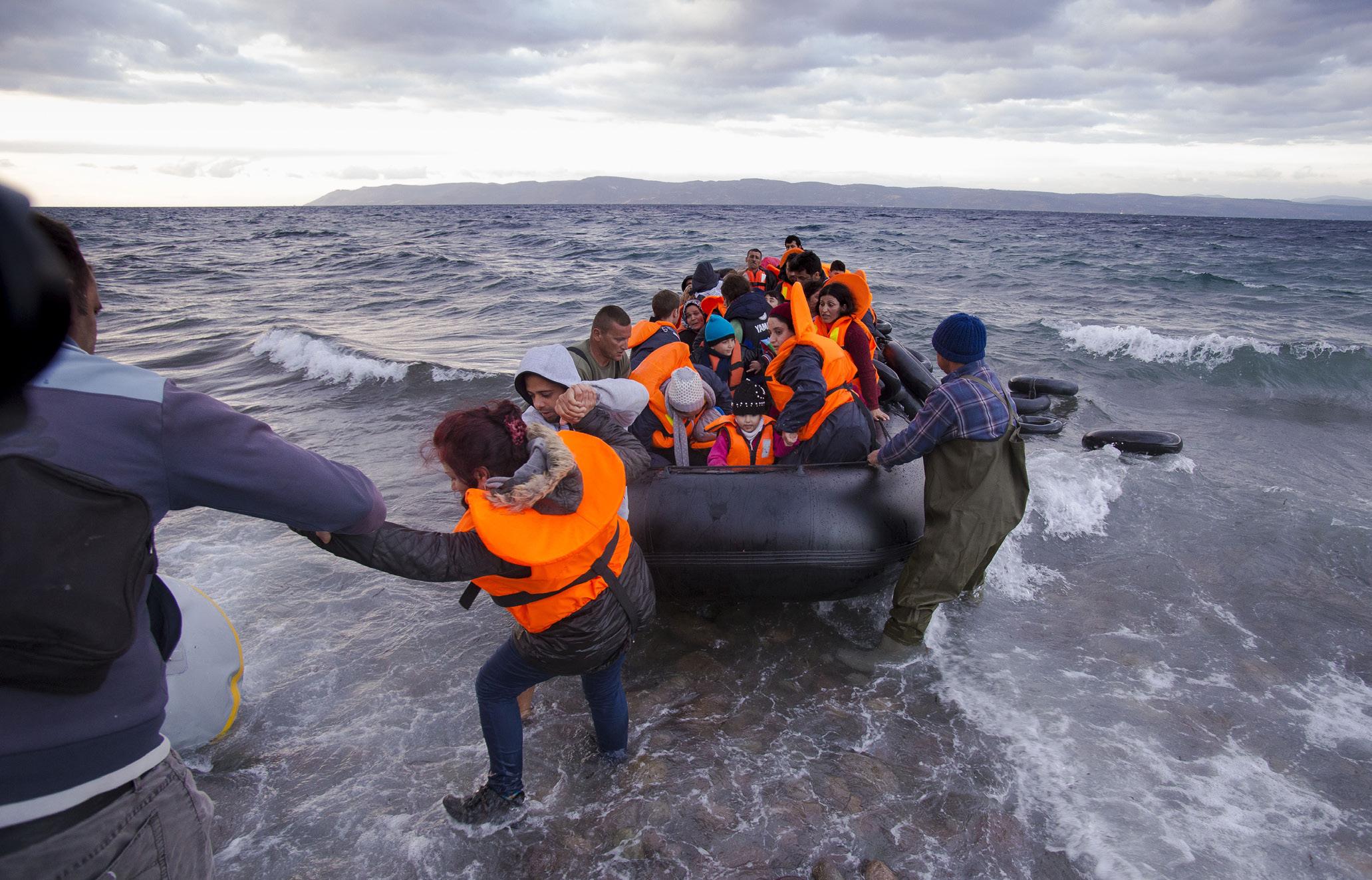
The institutions created after the Second World War to keep the peace are not functioning, and if divisions are not reversed, the number of refugees and displaced people will continue to rise
How much have the needs of refugees and displaced persons grown in recent years?
Our last estimate was 114 million refugees and displaced people. This dramatic figure has doubled recently because of conflicts, violence and human rights violations, combined with other factors.
The very frequent crises are resulting in refugee movements, across Africa, the Middle East, Asia, Latin America and Ukraine. Last
By Filippo Grandi, United Nations High Commissioner for Refugeesyear, my organisation – the United Nations High Commission for Refugees – declared more than 40 refugee emergencies. This is the greatest challenge, particularly in Africa, where responding to emergencies is often difficult, dangerous and costly.
We are also witnessing increasing trafficking and smuggling, preying on the misery of people who are in dire conditions and move along dangerous routes through deserts and across seas. Other people
travelling these routes may be moving for other reasons, such as economic ones. The result is arrivals are more complex to manage from every point of view: legal, logistical and social and, as a consequence, there is much political manipulation. It gets votes to say ‘these people are stealing jobs, threatening security and overturning values, so the only response is to shut all doors, build walls, push people back and enact strict legislation’. But none of these measures solves the complex problems of these flows.
How is UNHCR working to meet these needs?
Filippo Grandi has been the United Nations High Commissioner for Refugees since 2016. He served as commissioner general of the United Nations Relief and Works Agency for Palestine Refugees from 2010 to 2014, having been its deputy commissioner general since 2005. Previously, he served as deputy special representative of the UN secretary-general in Afghanistan, following a long career with non-governmental organisations and later with UNHCR in Africa, Asia, the Middle East and Geneva.
X-TWITTER @FilippoGrandi unhcr.org
We don’t give up. We are the custodians of the fundamental refugee protection principles and international legislation, so we have a duty to remind governments of their obligations regarding people fleeing from violence, persecution and conflict. I am often asked what refugee protection means. In one word, it’s negotiations – to allow people access to safe territory and services, so people can move if they need to and return home safely when they can and want. Protection is an important tool.
Increasingly, because refugee situations last many years, we also need to work with development organisations to ensure people are included in education programmes, health systems, job markets and so forth. Inclusion in national assistance is the best response to refugee situations – much better than creating parallel structures supported by humanitarian resources, which are unsustainable.
In collaboration with the International Organization for Migration, we are working on the complex movements across the Americas towards the United States. It is often too late when people arrive at the borders of rich countries. So we are promoting a route-based approach, looking at each segment along these routes – from the origin to countries along the route all the way to the destination – and providing particular support at all points through close work with different partners.
All this work around the world – in conflict zones, neighbouring countries and host countries – costs quite a lot of money. Crises have ballooned and resources remain contained. All the major humanitarian organisations are under pressure financially. I hope the G7 pays attention, because its preoccupations include security, international relations, the economy and health, but these crises generate vulnerability and people, including refugees, who are most affected by wars need support. Without support, instability grows even further. So humanitarian assistance is a tool of stability that leaders should consider very seriously.
What results have you been able to achieve in the face of these limited resources?
We save lives. We distribute food, medicine, tents and other basic items. Saving lives also means convincing
m refugees and displaced people +40 refugee emergencies declared last year
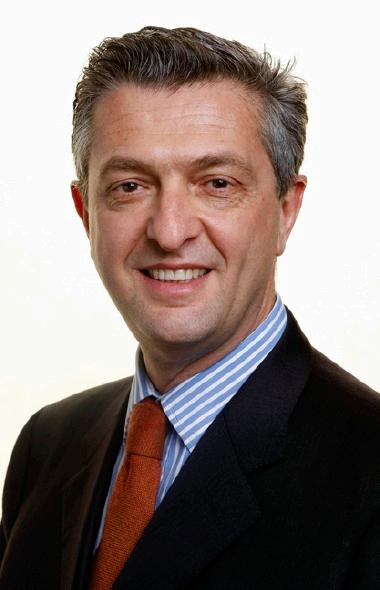
states to keep borders open and not push people back if they face persecution or even worse at home.
Our cooperation with development organisations has also been significant. The World Bank now has financial instruments for low- and middle-income countries that host large numbers of refugees. This enables support to continue steadily after the crisis phase is over. We cannot depend on humanitarian assistance for long, because it is not sustainable. These instruments provide more sustainability. G7 members are major stakeholders of these international financial institutions, so we need their support to remain focused on these aspects.
My most important message to the G7: please help the world restore a sense of trust in international peacemaking. The institutions created after the Second World War to keep the peace are not functioning. It is much more difficult in today’s multipolar world, where power is fragmented – with challenges that require maximum unity, including climate change, conflicts and pandemics, and forced migration and refugees. Unity needs the leadership of the major powers. We are going backwards in the pursuit of peace. If those divisions are not reversed, this figure of 114 million will increase.
So, invest more in peacemaking.
But, meanwhile, humanitarians need resources and unfortunately this is going backwards too. It is a contradiction. You don’t solve conflict because it is difficult; but at least help the people who are the victims of these failures. But humanitarian assistance is stagnating or even diminishing compared to needs. This is very dangerous. I understand there are many demands for expenditures, but if we spend in other areas and neglect humanitarian assistance, we will not have a better world. And a better world is what the G7 should be working towards.
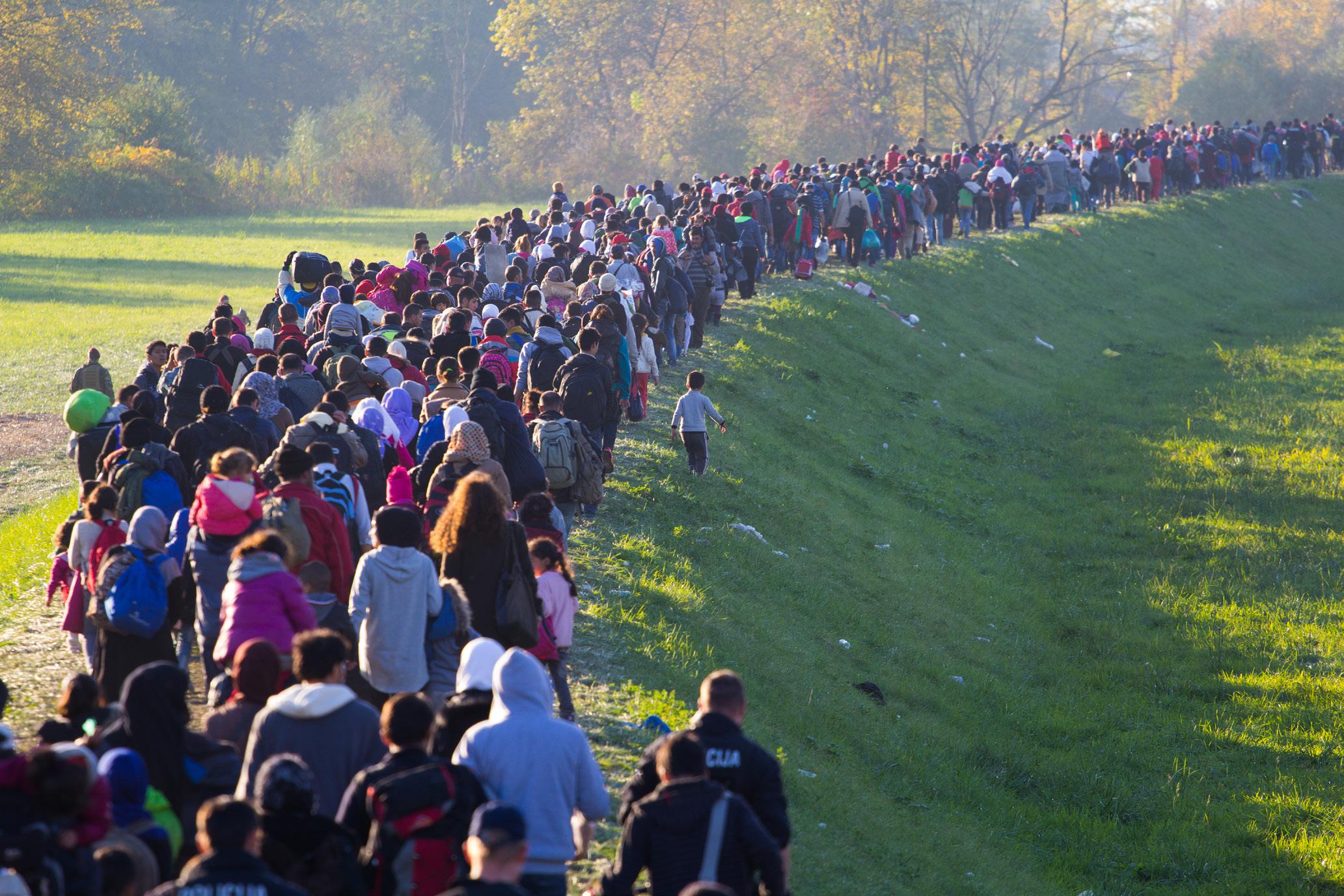
Migration is a central theme shaping the future of nations, but the discussion fails to encapsulate the scale of the migration landscape. At Apulia, leaders must seize the opportunity to pave the way and leverage migration for the greater good
We are at a significant crossroads in the narrative of human movement – a narrative unfolding across every continent, from the bustling streets of Europe to the vibrant communities of Africa, and the rapidly evolving societies of Asia and Latin America.
This year, migration is not just a backdrop; it is a central theme influencing election agendas and shaping the future of nations.
Unfortunately, the migration discussion that is prominent in those election debates focuses on narrow slices of the migration landscape: an overwhelmed host community at a border, people stuck at borders or, tragically, dying at sea.
No one minimises the loss of life, and we also cannot minimise the challenges at borders. Communities seeing a large influx of migrants over a short time face very real and difficult pressures. But when we focus on the border alone, we lose the wider perspective.
A focus on the bigger migration picture would reveal the complex reasons people move, and what these people give and contribute to the places they move to and the places they move from.
By Amy E Pope, director-general, International Organization for MigrationWhen we look at that bigger picture, we see the broad, rich story of migration – the human stories of aspiration, resilience, and migration’s role in societal advance and global prosperity.
That gives us the ability to understand what we truly gain when we build a more strategic global approach that harnesses the tremendous well of talent inherent in migration.
The International Organization for Migration is part of the United Nations, founded after World War Two to help people displaced by the war find homes.
IOM now has the third biggest footprint of any UN organisation, with more than 520 offices around the world and 175 member states. Our goal is to make migration safer, more orderly and more beneficial for all.
The successful migrant benefits the economy of her host country, she benefits the community she has left through remittances and she benefits herself, by reaching her full potential.
When the pandemic hit, migrants served on the front lines in many countries, continuing to work in health care, education, hospitality and agriculture, despite the health risks they faced.
The pandemic may have receded, but what has not receded is the world’s need for migrants – every country in the world needs nurses, for example – and the migrant’s need for a safe, regular pathway to the jobs that await them.
The world’s need is driven by demographic and economic changes, creating a global competition for talent.
Thirty of the world’s largest economies have labour shortages, and, according to the Boston Consulting Group, the cost of those unfilled jobs is more than $1.3 trillion a year.
Ageing populations will exacerbate these labour shortages. By 2050, people over the age of 65 will represent nearly 40% of the population in Japan and Korea. Many European countries are not far behind.
Foreign talent can help alleviate these challenges. It can also drive innovation, providing companies and countries that are willing to embrace future development with a substantial strategic advantage.
Smart, strategic investments in better migration pathways can help deliver this sustainable development.
These investments can also reduce the rising incidence of dangerous and irregular migration that has overwhelmed borders, enhancing the business model of the smuggler and the trafficker.
Unfortunately, one of the only well-known and available pathways for many migrants is asylum. But asylum systems are often overwhelmed by applications from people who are not fleeing persecution or war, but instead are seeking better economic opportunities.
A regular pathway into an actual job is a much better option. We can provide training before people reach their destination country, so that when they arrive, they can speak the language and find work. We can respond to the needs of individual industries such as in the IT sector or in health care, to provide the skills they desperately need.
We need to build more comprehensive approaches, connecting migration,
When we look at [the] bigger picture, we see the broad, rich story of migration – the human stories of aspiration, resilience, and migration’s role in societal advancement and global prosperity”

development assistance, livelihood opportunities and even urban planning in a much more dynamic and strategic manner. A deliberate and inclusive plan would also help fragile economies become stronger and protect women and other vulnerable communities.
The countries that best understand the migration landscape and how it can help their economies will be the ones best positioned to tackle the challenges of this decade and the ones that follow.
The path forward is not without its challenges. But working together, the world’s leading countries are well equipped to meet them and seize the opportunity that migration presents. So let’s collaborate across countries and sectors to craft policies that not only manage migration effectively but leverage it for the greater good around the world.
Amy E Pope began her five-year term as director general of the International Organization for Migration on 1 October 2023. Previously, she was the senior adviser on migration to US President Joe Biden and served as deputy homeland security adviser to President Barack Obama. She has promoted dialogue on global migration challenges and opportunities through her academic writing and work with Chatham House. She has also occupied positions at the US Department of Justice and US Senate and was a partner in the London-based law firm Schillings.
X-TWITTER @IOMchief iom.int
The world is facing a complex global security landscape and ever-mounting challenges, but INTERPOL’s initiatives to counter transnational organised crime groups serve as a beacon of multilateral cooperation
By Jürgen Stock, secretary-general, INTERPOLWhether it be street violence, sexual exploitation of children, forced labour or the synthetic drug epidemic, transnational organised crime has grown in scale and complexity worldwide, driven by the evolution of criminal activity, increased connections and technological advances. In an era of globalisation and increased geopolitical tensions, the geographical footprint of organised crime groups continually changes. Police investigations reveal a fragmented landscape, where criminal entities strategically collaborate with local groups and even individuals, forming

agile global networks made of various combinations of complementary criminal partnerships.
Organised crime is also driven by increasingly sophisticated economic and business models that leverage comparative advantage and cost-benefit analyses, and closely track profit margins. Crime-as-aservice has emerged as a lucrative model, with organised groups outsourcing illicit activities such as money laundering to specialised service providers.
In November 2023, the annual global meeting of law enforcement leaders at INTERPOL’s General Assembly adopted the Vienna Declaration, voicing the concern about the growth, scale and impact of organised crime on communities around the world.
Tackling organised crime and powerful global crime syndicates requires a strong, global counter coalition. In the face of the unprecedented proliferation of transregional and networked crime, INTERPOL is more determined than ever to face this challenge, by ensuring

Crime-as-a-service has emerged as a lucrative model, with organised groups outsourcing illicit activities such as money laundering to specialised service providers”
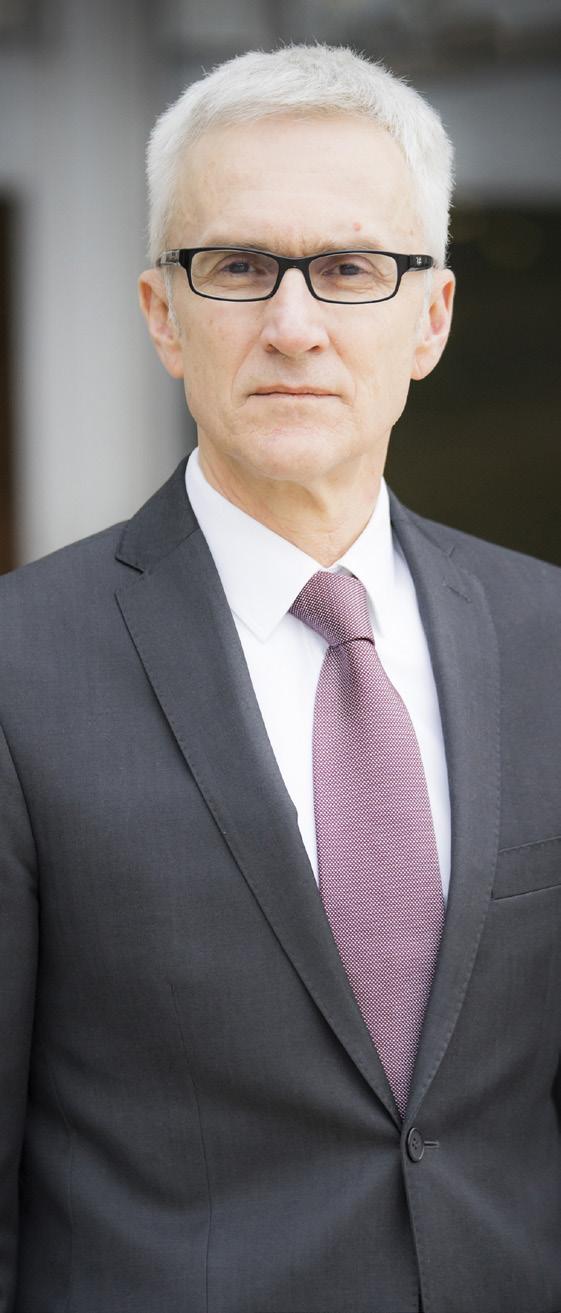
Jürgen Stock was appointed secretary-general of INTERPOL in 2014 and reappointed in 2019 to serve a second five-year term. Stock was vice-president of Germany’s Federal Criminal Police Office (BKA) from 2004 to 2014, before which he held several leadership positions within law enforcement development institutions.
X-TWITTER @INTERPOL_SG interpol.int
its global network of law enforcement partners from 196 member countries are better informed, equipped and empowered to detect and disrupt transnational organised crime groups that pose the highest threat to regional and global security.
Through secure communication channels, centralised databases, as well as operational and investigative assistance, INTERPOL provides essential resources to make communities safer worldwide. Its initiatives to counter the global threat of transnational organised crime groups serve as a beacon of multilateral cooperation –furnishing actionable intelligence to law enforcement agencies across the globe – at a time of widening geopolitical rifts and mounting pressures.
INTERPOL’s Cooperation Against ’Ndrangheta (Project I-CAN), supported by Italian authorities, represents an exemplary multilateral effort to provide intelligence about the illicit activities and location of fugitives of ’Ndrangheta, which INTERPOL identifies as a high-threat transnational organised crime group.
As a key actor within the global and integrated security architecture, INTERPOL’s efforts are well aligned with the objectives and endeavours of strategic multilateral forums, such as the G7. This alignment takes place within the framework of the seven INTERPOL Global Policing Goals, originally adopted by the INTERPOL General Assembly in 2017. Reviewed last year in consultation with all regional policing organisations, the updated goals reiterate the security-development nexus and INTERPOL’s support for the implementation of the United Nations Sustainable Development Goals.
Under Italy’s 2024 G7 presidency, INTERPOL continues to represent the voice of the global law enforcement community as it faces a complex global security landscape and ever-mounting challenges such as cybercrime, child sexual exploitation and abuse, synthetic drugs, terrorism and corruption.
As a global neutral platform, INTERPOL provides technical advice on the requirements for adequate global security policies. Such policies should ultimately promote greater law enforcement cooperation across the globe, improved information and intelligence sharing and analysis, and further investments in stronger and cutting-edge INTERPOL capabilities in tackling organised crime groups.
The persisting unrest in many areas of the world, the exploitation of social media and of the (dark) web and the possible use of artificial intelligence by criminal actors all play into the wider picture of how malicious threats relentlessly evolve.
Criminals make the best of digital tools to boost their proceeds and keep their illegal activities undetected; terrorists maximise the impact of their attacks through the web, by spreading fear and attracting new recruits.
Changes can be sudden and impactful.
The pandemic challenged us in many ways, including by needing to respond to an uncharted criminal landscape, where the use of internet and online applications leapt forward to an unexpected degree.
Criminals adapted quickly and the law enforcement community was forced to chase the change, adapting its modus operandi, guaranteeing business continuity while preserving its officers’ health, quickly pooling and concentrating resources where more were needed. The mission was accomplished.
Nevertheless, we need to remember the lessons we learnt, to ensure the sustainability of police work in the digital age and to concentrate on our ability to foresee changes.
Modern police work is based on processing large amounts of data; manual processing is not viable or actionable at scale. Law enforcement relies on tools to process large datasets and legislative frameworks that strike a fair balance between effective police work and the safeguard of fundamental rights. Among the applications that AI offers, biometric identification (including facial recognition) bears high potential for police work, from the prevention of terrorist attacks in public spaces to real-time investigations of crimes against minors. Facial recognition encompasses two distinct applications: real-time and post-event biometric identification, separately regulated under the AI Act adopted recently by the European Parliament. Real-time remote biometric identification is, in principle, prohibited, although permitted in specific exceptions.
Large-scale events, which draw vast numbers of attendees and present unique security challenges, often serve as critical testing grounds for the application of such
Artificial intelligence is increasingly being used for corrupt means, with criminals often ahead of the game when it comes to digital evolution – and it’s having a significant impact on crime levels and policing

The global nature of the internet enables criminals to operate across jurisdictions without physically crossing borders
technologies. In the context of the Paris 2024 Olympic and Paralympic Games, France passed a temporary provision for the real-time processing of images captured by smart cameras for the detection of suspicious events during the Olympics: this will be an important test of how AI could serve the public interest and enhance sustainable security in EU democracies.
It is imperative not only to keep abreast of the new threats, but also to look ahead at those that will come. We can thus see that old elements, paired with new technologies, have become strong criminal enablers. Disinformation, a very old habit, empowered with the multiplier capacity of social media and AI features can destabilise markets (opening them to insider trading and fraud), influence elections (poisoning the democratic process) and radicalise oppressed populations (paving the way for new recruits to fall into the dark pit of terrorist propaganda). Disinformation spread with the use of large language models can mislead investigations (evidence manipulation, justice process tampering), facilitate document fraud, and result in cyberattacks against information systems, online identities theft and child sexual exploitation.
The global nature of the internet enables criminals to operate across jurisdictions without physically crossing borders. Only one effective weapon can overcome this threat: cooperation. Collaboration allows agencies to pool intelligence, resources and best practices, enhancing their ability to respond to threats. Shared databases and communication platforms can streamline investigations. International task forces can tackle crimes that span multiple jurisdictions, combining expertise and jurisdictional reach to dismantle criminal networks. Sharing knowledge on emerging technologies, such as AI, and investigative techniques fosters a globally competent police force. As technology continues to evolve, so too must law enforcement strategies worldwide. By uniting in their efforts, law enforcement can overcome these challenges and develop tools and strategies that protect and serve communities in the digital age. International cooperation is not just beneficial; it is imperative for ensuring public safety in a connected world.
Old elements, paired with new technologies, have become strong criminal enablers. Disinformation, a very old habit, empowered with the multiplier capacity of social media and AI features can destabilise markets … influence elections … and radicalise oppressed populations”
One of Europol’s priorities is being at the forefront of research, as innovation is key in any future-looking scenario. AI is the new frontier and, to overcome the current challenges, law enforcement should invest in:
1. employing the array of tools AI has to offer to improve police work;
2. detecting the abuse of AI by those engaged in disinformation;
3. improving and recruiting so AI skills become part of police training landmarks – here, cooperation with the private sector and academia is essential.
Mastering new technologies is key to being on par with the threats we face. AI is a game changer; we need to embrace it responsibly, mindful that criminals have often been ahead of the game.
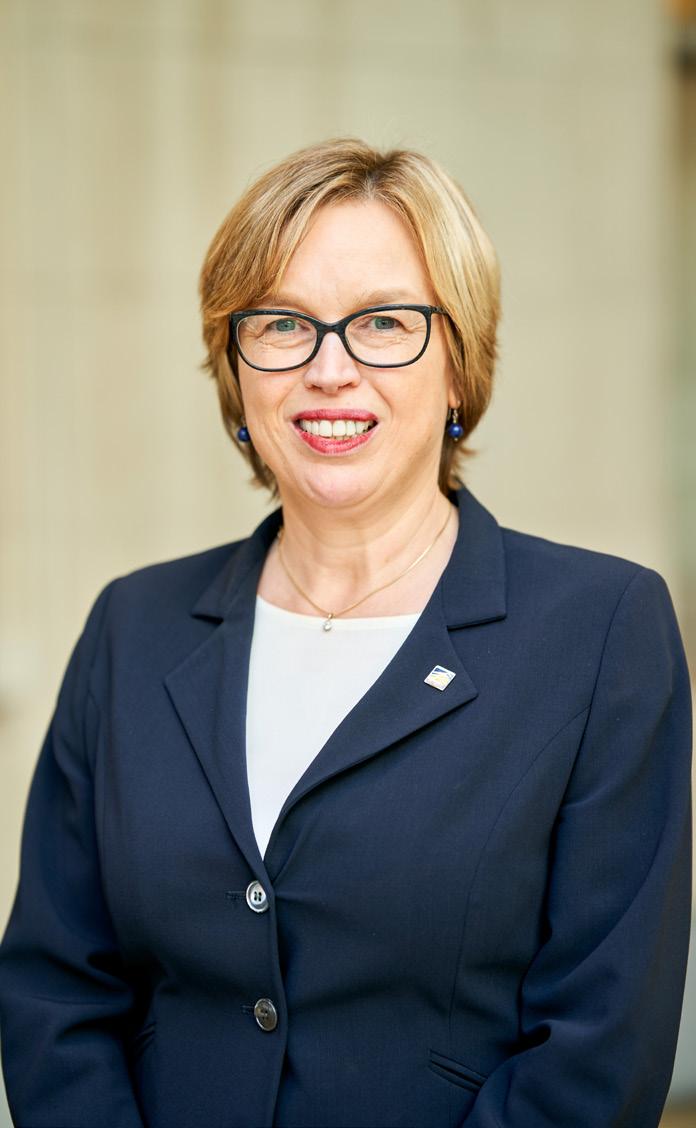
Catherine De Bolle served as general commissioner of the Belgian Federal Police from 2012 until she took up her post as Europol’s executive director in 2018. Prior to her appointment as Belgian police commissioner, she was Chief of Police in Ninove. In 2015, she received the title of public manager of the year. From November 2015 until November 2018, she was a member of the executive committee of Interpol. She studied law at Ghent University and then went on to graduate from the Royal Gendarmerie Academy in Belgium.
X-TWITTER @europol europol.europa.eu
For far too long, criminals have been able to take advantage of weak transparency and other legal arrangements to hide or launder their illegal profits, but the Financial Action Task Force has recently completed its work on tougher global beneficial ownership rules, making fundamental changes that will have an immense impact on cross-border crime
 By T Raja Kumar, president, Financial Action Task Force
By T Raja Kumar, president, Financial Action Task Force
The pace of technological advance in the financial sector creates new challenges to the integrity of the financial system and its vulnerability to exploitation by criminals. Advances in technology have created many benefits, but criminals, corrupt officials and terrorists are quick to exploit opportunities to move proceeds of crime across different jurisdictions to avoid law enforcement actions.
The Financial Action Task Force strengthened its standards on crypto assets four years ago, but implementation remains too slow. Virtual assets are inherently international and borderless, meaning a failure to regulate in one jurisdiction can have serious global implications. Ransomware incidents have jumped recently, and ransomware payments are almost exclusively demanded in virtual assets. Terrorist groups, including ISIL, al-Qaeda and their affiliates, as well as ethnically or racially motivated terrorist entities, are also increasingly using virtual assets to raise and move funds globally.
The FATF has adopted a roadmap to speed up the adoption and implementation of its standards and support countries with material virtual asset activities to do so. G7 members are key in leading by example and supporting other countries to put in place the adequate framework at the domestic level.
Cross-border payment is another current FATF focus. We all see the benefit of faster, cheaper and more inclusive payment systems. Financial inclusion ensures that people are served by the regulated financial system, with its accompanying controls, transparency and security, and reduces the space for the underground grey and black markets. Our ongoing work to revise Recommendation 16 seeks to promote sharing structured and enriched data in payment messages to facilitate automated checks and make payments, faster, cheaper, more inclusive and transparent, and also safer and more secure.
The FATF encourages responsible innovation that is fit for purpose and complies with applicable regulatory requirements, including anti-money laundering and the fight against terrorist financing, consumer protection, cybersecurity, and privacy protections. In this fast-evolving context, public-private partnerships are essential to engage with experts and stakeholders to leverage expertise to keep ahead of the curve and reduce the loopholes criminals can exploit.
At our plenary in February this year, we completed our work on tougher global beneficial ownership rules to decisively stop criminals from laundering their money through shell companies and other corporate structures, with the publication of guidance on transparency for legal arrangements.
This was an important achievement of the FATF. For too long criminals have been able to take advantage of a lack of transparency around trusts and other legal arrangements to hide or launder their criminal proceeds. Anonymous shell companies are also often used by corrupt officials, sanctions evaders, money launderers and tax evaders to hide their illicit profits. The lack of
The FATF has adopted a roadmap to speed up the adoption and implementation of its standards and support countries with material virtual asset activities to do so. G7 members are key in leading by example”
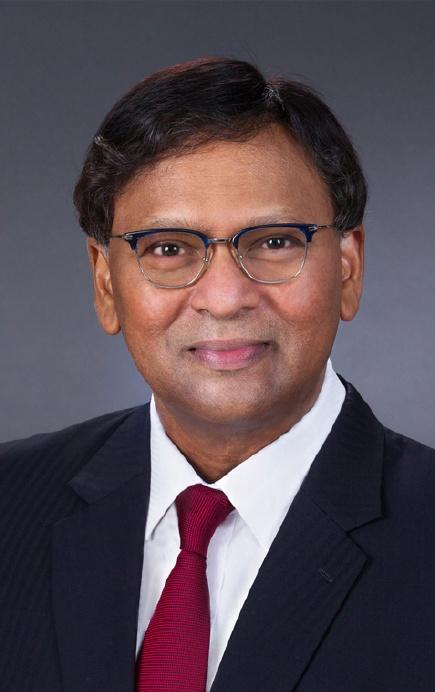
transparency across different jurisdictions also means law enforcement often cannot track down individuals behind companies suspected of financial crime or go after the proceeds of crime.
The new rules require all companies to collect beneficial ownership information and for countries to have a registry or another system that provides efficient access to this information. This will make it easier for investigators to know who really owns and controls a company, and more rapidly link criminals to their money. These changes are fundamental to global efforts to tackle cross-border crime, including corruption. I look forward to continuing G7 support in this critical area.
Under Singapore’s presidency, the FATF has also stepped up its focus on supporting national authorities to ramp up the seizure, confiscation and return of criminal property. Less than one percent of global illicit financial flows are seized or confiscated. This is partly because many countries take a tick-box approach, rather than prioritise tangible and impactful results. This means they remain as vessels and hubs for money laundering.
The G7 can lead in this area by promoting policies that prioritise asset recovery and ensuring law enforcement and other agencies have the capabilities and training necessary to ‘follow the money’ that fuels crime and terrorism.
The FATF Global Network, comprising more than 200 jurisdictions, is at the centre of this international effort to take decisive, coordinated and effective action against these threats to the safety and security of our societies.
There is clearly much work to do. Every dollar of criminal proceeds that is not seized can fuel more crime. Every dollar that is recovered can be returned to victims, including governments to be reinvested in our communities. This ought to be our common goal.
T Raja Kumar ends his two-year term as president of the Financial Action Task Force in June 2024. He currently serves as senior adviser (international) in Singapore’s Ministry of Home Affairs. He was deputy secretary (international) from 2015 to 2021 and chief executive of the Home Team Academy from 2014 to 2018. He also served as Singapore’s deputy commissioner of police (policy), director of the Police Intelligence Department, and senior deputy director of the Commercial Affairs Department. He was also the first chief executive of the Casino Regulatory Authority.
Twitter @FATFNews fatf-gafi.org

Transnational issues require international cooperation, and the G7 is well poised to work hand in hand with the Global South to fight economic crime, sanctions evasion and corruption
G7 leaders must continue to prioritise economic crime (including human trafficking and smuggling), sanctions evasion and corruption to preserve the rules-based international order. G7 leaders meet at Apulia amidst warfare, changes in political leadership, a rising number of fragile states and economic uncertainty – a setting ripe for exploitation by organised crime networks, corrupt actors and their enablers. Corruption costs $3.6 trillion per year. As much as 5% of global gross domestic product is subject to money laundering annually (between $2.2 trillion to $5.5 trillion in 2024). Given these transnational issues, G7 members must work together with the Global South to set the global agenda, provide leadership, and promote cooperation and collaboration including with the private sector, academia and civil society to fight economic crime, sanctions evasion and corruption.
More than 33% of the commitments made by G7 leaders at their Kyiv Summit on 24 February, following the death of Alexei Navalny, directly or indirectly referred to sanctions. Although G7 members have issued the most comprehensive sanctions against actors and industries in Russia, Belarus and third countries used to prop up Russia’s war economy and evade sanctions, pressure remains to provide additional financing to support Ukraine and cripple Russia’s war machine. Leaders may agree at Apulia on how to monetise the $300 billion in assets frozen under sanctions, but this must be done according to the G7’s founding principles of democracy and the rule of law. One innovative

approach recently introduced by the G7 is to use blockchain traceability measures to implement a diamond ban. This will require G7 members to support developing blockchain monitoring to identify sanctions breaches throughout the supply chain. G7 members also need to continue coordinating sanctions to curb the proliferation of nuclear weapons given rising military rhetoric and cooperation between Russia, Iran and North Korea, recent Chinese cyberattacks against government democratic institutions in G7 members, and governments responsible for human rights abuses and atrocities in fragile and conflict states. The G7 should use soft diplomacy to build trust with the Global South. It should tackle sanctions evasion by intensifying capacity building efforts in third countries, particularly Russian proxy states in Africa and Eurasia, and industries affected by sanctions, such as oil, metals and diamonds. The G7 should also consider extending the extraterritoriality of sanctions beyond the US dollar and US ‘persons’ to national currencies and ‘persons’ of other G7 countries and the European Union.
Italy’s G7 presidency is prioritising human trafficking and human smuggling, a $150 million business. Corruption drives conflict, which leads to more displaced and stateless people – 130.8 million in 2024 – generating a pool of humans ripe for exploitation by criminals. G7 leaders must adopt the ‘Rome Process’ as a multi-annual platform for collective action on human smuggling and hold steadfast to the pledge made at the 2023 Hiroshima Summit “to break the business model of organised criminal networks”. This should include working closely with the private sector, including the transport industry and banking, to share financial intelligence to bolster prevention and detection efforts.
DENISSE RUDICHDenisse Rudich is a global champion of financial crime prevention initiatives with two decades delivering financial crime prevention strategic solutions across banking, start-ups and the public sectors. She works at the intersection of global governance, financial crime, technology and conflict finance and has acted as a technical expert and advisor on various government and private sector initiatives on economic crime, corruption and sanctions. Denisse is an author, trainer, keynote speaker and panellist at industry events, and mentor to start-ups.
The G7 should also revisit tackling predicate crimes for money laundering and reaffirm the need to minimise criminals’ profits by strengthening anti-money laundering measures set by the Financial Action Task Force. This includes addressing the proceeds of drug trafficking, possibly via the Global Coalition to Address Synthetic Drug Threats, as fentanyl and amphetamines, synthetic drugs and precursor drugs remain huge income sources. This also includes environmental crimes, which contribute to climate change and generate up to $213 billion in profits annually through wildlife trafficking, illegal logging, waste dumping, and illegal, unreported and unregulated fishing. Special attention should be paid to promoting the United Nations Office on Drugs and Crime’s work on illegal mining and trafficking in metals and minerals: trafficking critical minerals, particularly in sub-Saharan Africa, affects supply chains, drives armed violence and harms local ecosystems. The G7 could explore extending the definition of environmental crime to include space debris, with an estimated 130 million pieces orbiting the Earth.
Predicate offences for money laundering include arms smuggling, the demand for which will likely rise for small arms and ammunition and also larger scale weapons as additional transnational conflict hotspots emerge. G7 leaders should call for closer exploration of illicit financial flows with fragile and conflict states alongside arms smuggling routes. They should task the FATF to explore applying anti-money laundering measures to atrocity financing and the financing of private military companies committing human rights abuses, with consideration given to making war crimes a predicate offence for money laundering.
Finally, they should call for closer study of the links between technology, corruption and money laundering. This includes exploring technology as a driver of money laundering both as a threat with the continuing rise of artificial intelligence and low-cost crime-as-a-service, computer-generated fraud, state-supported ransomware attacks, and exploitation of new technologies such as blockchain as the price of crypto assets skyrocket. There is an opportunity to identify illicit financial flows, deepen investigations and support asset seizure activities and to develop digital solutions that promote transparency, public access to data, trust in public institutions and citizens’ ability to hold governments to account to fight corruption.

The G7’s compliance with its climate commitments is on par with its average overall compliance, meaning there’s room for improvement, and measures from timelines to stronger support for international climate laws could have an impact
In June 2024, G7 leaders meet in Apulia to discuss exceptionally pressing global challenges. On their menu of crises to manage, climate change is sandwiched between security, artificial intelligence, partnership with Africa and much more. The planet’s climate system is of paramount importance in governing all these issues. Climate imbalance adds more unpredictability, uncertainty and severity to every Sustainable Development Goal, by reducing resilience and creating negative and irreversible domino effects.
As a group of like-minded democratic members, the G7 must strengthen its action, by mainstreaming climate change throughout all its ministerial meetings and putting full, urgent effort behind all three pillars of the United Nations Paris Agreement – mitigation, adaptation and finance.
Throughout its history, the G7 has governed climate change in its own right, while deferring to the UN Framework Convention on Climate Change and its Conferences of the Parties as the central global leader on the subject. The G7’s initial moves towards renewable energy were motivated by a desire for energy independence in the wake of the global oil crises of the 1970s, acknowledging climate co-benefits.
In the first phase, from 1979 to 2004, the G7 dedicated an average of just 2% of its communiqués to climate at each summit. In the second phase, from 2005 to 2023, it rose to 11%. It grew consistently in 2021 to 19%, in 2022 to 25% and in 2023 to 35% – the highest ever.
Since 1975, the G7 has made 484 climate commitments, or 7% of its total commitments. From 1979 to 2004, it averaged 5% per summit. From 2005 to 2023, it rose to 9%.
In the last three years, although higher, there was a declining trend. In 2021, climate commitments took 13%, in 2022 took 11% and in 2023 took 8%. However, by total number, these last three years had the most climate commitments made, with each summit since 2021 breaching 50, setting a record. The only other time the G7 made more than 50 climate commitments was in 2008.
Compliance with the 104 core and related climate commitments assessed by the G7 Research Group averages 77%. This is on par with the G7’s 77% average with all 704 assessed commitments across all subjects.
From 1979 to 2004, climate compliance averaged 72%.
From 2005 to 2022, it rose to 77% – a disproportionately small rise relative to the much larger rise in climate risk. However, from 2015 when the UN’s Paris Agreement was signed until 2022, compliance averaged 80%. By December 2023, climate compliance from the 2023 Hiroshima Summit had reached 91%.
With the climate crisis now at hand, how can the G7 strengthen its performance?
Data suggest that surrounding summit support from UN climate conferences and international climate law positively affect G7 climate compliance. Commitments with such references average 77%, the highest of any measured catalyst.
Brittaney Warren is director of compliance and climate change research for the G7 and G20 Research Groups, based at the University of Toronto, which sits on Treaty 13 and Williams Treaty lands and is home to many First Nations, Inuit and Métis. She is co-author of Reconfiguring the Global Governance of Climate Change, with John Kirton and Ella Kokotsis. She has published widely on climate change, including on the climate-health nexus and accountability measures to improve summit performance. She holds a master’s degree in environmental studies from York University. She has just published 21st Century Garden of Eden: A Climate Change Story & Adult Colouring Book, available at www.lulu.com X-TWITTER @brittaneywarren www.g7.utoronto.ca

Internal institutional support is also key. Summits with a pre-summit climate/environment ministerial meeting average 78%, which is 10% higher than those without.
Next are timelines: commitments with a one-year or multiyear timeline average 76% and 75% compliance, respectively. Commitments with a numerical target average 73%.
The lowest compliance is with climate finance commitments at 69%. This is followed by commitments referencing a specific country or region at 52%, or a regional organisation at 50%.
Thus, to improve its climate compliance, the G7 should strengthen its support for a successful UNFCCC process and for stronger international climate laws through the UNFCCC. To fully implement such agreements, namely the Paris Agreement, the G7 must fully comply with its standing climate finance commitments, and further commit to generate the trillions of dollars needed to stop the growth of global fossil fuel emissions. Each G7 member should commit to dedicate 2% of its gross domestic product to climate security, as it does on other defence measures through the North Atlantic Treaty Organization.
The G7 should create certainty for the private sector to unlock more money. But it must also hold fossil fuel corporations politically, socially and legally responsible for the harmful and destructive impacts of their coal, oil and gas products, starting by creating accountability for the spread of climate disinformation and ending government funding in the form of direct and indirect subsidies, which could fund the above recommended 2% climate security goal.
The G7 should always hold a pre-summit environment and climate ministerial meeting, and galvanise its finance, foreign, health and other ministers to mainstream climate change throughout their agendas.
There is also the question of whether the G7 should avoid singling out any one country or region, as this may be perceived as negative. Yet it is critical that the G7 supports least developed and low-income countries so they can build resilience and meet their climate targets. The G7 should reframe its countryand region-specific commitments in ways that account for its members’ historical emissions and show strong support for such initiatives as the UN-led Loss and Damage Fund.
Finally, the G7 should also make more commitments with specific targets and short-term timelines and accountability mechanisms, in order to meet its longer-term goals required to keep the global average temperature rise to the liveable level of 1.5°C.

In the years to come, we can expect more frequent and more intense extreme weather events due to climate change. The only hope for changing our current course is to seek win-win synergies between climate and sustainable development actions – and get everyone on board
By Celeste Saulo, secretary-general, World Meteorological OrganizationThe World Meteorological Organization has confirmed that 2023 was by far the warmest year on record. The eight months between July 2023 and February 2024 were the eight warmest months in a row, being a record in itself. Global sea surface temperatures are at a record high. Human-induced climate change is the main cause.
T he scientific community expects more frequent and more intense extreme events worldwide in the years to come. National meteorological and hydrological services and the WMO provide daily evidence of these trends. Urgent action is needed. Concrete steps go from mitigation, including accelerating the energy transition, to supporting adaptation in order to build resilience to climate change. The WMO is deeply involved in many of these actions.
THE RESULT OF OUR GROWING NEED FOR ENERGY
There is absolutely no way that humanity’s needs for energy, driven by demography and development, will stop growing in the foreseeable future, as CERN director-general Fabiola Gianotti recently emphasised. This situation must be the basis for any climate thinking.
1.5°C
annual
S chematically put, climate change is the result of our growing need for energy through the combustion of fossil fuels. The dire consequences of extreme weather events and the perturbation of biomes on the planet are increasingly visible.
Aware of all this, countries are developing their Nationally Determined Contributions to the Paris Agreement to transition away from fossil fuels, to cover the whole economy, to deliver finance on climate action and to ensure adaptation strategies are in place. Scientific knowledge should be the basis for these NDCs.
Moving away from dirty energy means embracing an entirely new paradigm.
T his move is costly, economically and politically. This is why we need to increase support for national meteorological and hydrological services to ensure the next generation of NDCs is based on science. This entails collecting better knowledge of the Earth’s system and its changes, delivering fit-for-purpose climate services to support decision making, and developing early warning systems to protect communities from unprecedented natural hazards.
PLANET-WIDE CHANGE IS NEEDED
M oving away from dirty energy entails huge investments in renewable energy, energy efficiency, energy storage and electrification. At the same time, it requires new tools to manage energy resources that depend highly on weather and climate and, as such, are also exposed to climate change impacts.
To attain emission objectives, a planetary shift of focus is needed. To produce renewable energy production globally, we need planetary investments, and a new paradigm that is based not on dirty energy, but on quality energy. A holistic approach, including diverse sectors from public to private and academia, and massive support to the developing
Celeste Saulo took office as secretary-general of the World Meteorological Organization on 1 January 2024. She previously served as director of Argentina’s National Meteorological Service since 2014 and was the first vice-president of the WMO.
She has been a member of the WMO World Weather Research Programme Scientific Steering Committee since 2011 and has served on various WMO panels related to her field of knowledge.
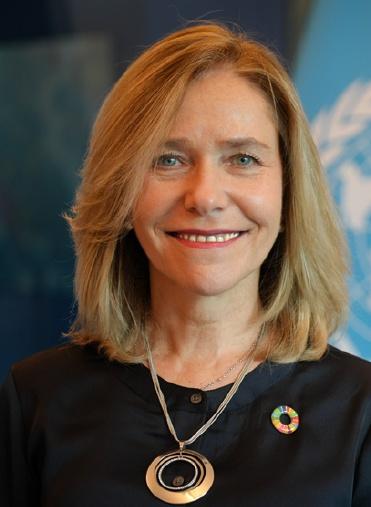
She is a professor in atmospheric sciences at the University of Buenos Aires and research scientist at Argentina’s National Council for Scientific and Technical Research.
X-TWITTER @wmo wmo.int

The cost of no action is several times higher than the cost of action: the total cost of inaction between 2025 and 2100 is estimated at $1,266 trillion”
world is a must to keep the 1.5C° ambition of a post-industrial temperature increase alive.
I n parallel, to support this mitigation effort, consequent investment needs to be allocated to climate adaptation, through the delivery of targeted climate services and early warnings to everyone everywhere, and through better measurement of climate and emissions data in all countries. National meteorological and hydrological services become critical actors in this pathway. The WMO is leading two major initiatives to improve their capabilities to effectively achieve this: the Early Warnings for All and the Global Greenhouse Gas Watch.
THE BENEFITS OF CLIMATE ADAPTATION AND MITIGATION
T he only way to change our current course is to seek win-win synergies between climate and sustainable development actions.
W hen placing a greater emphasis on development co-benefits, support for climate action measures can increase. Investments in adaptation measures, such as early warning systems, capacities and infrastructure of hydrometeorological services, enable societies to reduce exposure, build resilience and achieve just, inclusive and climate-resilient development. Early warnings systems provide an estimated ninefold return on investment. The use of hydrometeorological information in the energy sector can help optimise energy production and delivery. However, comparing tracked climate finance flows to estimated climate finance needs exposes a large financing gap. In an average scenario for a 1.5°C pathway, annual climate finance investments need to grow more than sixfold, reaching almost $9 trillion by 2030 and a further $10 trillion through to 2050. The list of potential benefits for mitigation and adaptation measures is long; their systematic documentation can challenge a perception of climate policies’ costliness and help attract much-needed investments. The cost of no action is several times higher than the cost of action: the total cost of inaction between 2025 and 2100 is estimated at $1,266 trillion.
A s concerns mount over respecting the 1.5°C target, it is essential to reevaluate the cost of reliance on non-renewable energy and to understand the necessity of investing in quality energy development. Questions linger over whether global policymakers are ready to embrace this new paradigm and make the necessary investments for a sustainable future. These are the questions that must be addressed by anyone taking climate action seriously.

What are the mission and vision of the Green Climate Fund?
The Green Climate Fund is a key multilateral finance mechanism under the Paris Agreement and the United Nations Framework Convention on Climate Change, designed to help developing countries implement climate investments that align with mitigation and adaptation objectives. We are unique among funds. GCF was established to empower a broad ecosystem encompassing multilateral development banks, bilateral agencies, the private sector and civil society organisations, with a mandate to significantly boost these investments. We offer the unique advantages of scale and flexibility in our resources, grants and other instruments.
The Green Climate Fund is designed to help countries implement sustainable climate investments, but the investment need is significant. At Apulia, G7 leaders can help in numerous ways, from bolstering support for developing countries in mitigation and adaptation efforts to bridging the gaps in funding
At the United Nations Climate Ambition Summit last September, I presented my ‘50by30’ vision. We are working towards transforming our organisation
to operate on a larger scale, more efficiently and with greater impact. We are keenly focused on supporting the most vulnerable countries and communities, and using our unique position to catalyse substantial private-sector investments in developing countries. We are diligently refining our processes to enhance efficiency, as developing countries depend on us for rapid and reliable access to funding and implementation, without compromising quality. Our unique position enables us to bring together this network of partners for significant impact, whether at the country, regional or global level.
How much money is needed?
Various estimates indicate the financial needs of developing countries. The High-Level Panel on Climate Finance recently identified a need for $2.4 trillion annually. Recent challenges, including
the Covid-19 pandemic and conflicts in Ukraine and the Middle East, have complicated the landscape for climate investments. These events have added fiscal pressures to the countries that provide funding through us and others. The macroeconomic situation has grown more complex, while the demand for support in developing countries has increased – they are grappling with economic shocks and many face unsustainable debt levels. Even in adaptation, we are significantly below the necessary funding levels, with estimates suggesting a need for $300 billion to $500 billion annually.
Last year, GCF completed its second replenishment cycle with $13 billion pledged, marking a 30% increase from the $10 billion in the previous cycle, although one significant country has not yet confirmed its pledge. We welcomed generous pledges and significant increases from countries such as the United States, Germany, the United Kingdom and France. Contributions also came from developing countries, which demonstrates the widespread support and collective ownership that GCF receives.
How is GCF deploying its funds?
We have committed $14 billion to over 250 projects in 129 countries. We are the only fund mandated to balance our investments across mitigation and adaptation efforts equally. For adaptation resources, we prioritise the least developed countries, small island developing states and Africa. Approximately 65% of our funding supports public sector projects, with 35% going to private sector initiatives. Our portfolio is diverse and ranges from energy projects to a wide array of adaptation sectors including agriculture. To date, we have invested close to $933 million in early warning systems – the largest such portfolio in the world –and we plan to expand these efforts in response to the UN secretary-general’s call for developing countries to be better prepared for climate disasters.
Do you find donors are still focused on the urgency of the crisis?
Donors demonstrated their commitment during our last replenishment, despite the challenging macroeconomic situation. However, the funds raised are still far from what is needed. As we approach this year’s UN climate conference in Azerbaijan, it is essential to define a new
Our unique position enables us to bring together this network of partners for significant impact, whether at the country, regional or global level”

Mafalda Duarte has been executive director of the Green Climate Fund since August 2023. Previously she was chief executive officer of the Climate Investment Funds, where she steered a multibillion-dollar portfolio of investments pushing the frontiers of clean energy, sustainable land management and resilience across more than 70 middle- and low-income countries. Originally from Portugal, she is a champion of social inclusion and equity who decided to focus on climate action after witnessing climate impacts in countries in Africa and learning about climate science.
Twitter @MafaldaDuarte and @theGCF greenclimate.fund
collective quantified goal to replace the $100 billion annually set in 2009. There are divergent views among developed and developing countries on how to frame this goal.
The current system for mobilising resources to support developing countries is inadequate. Only a few countries have met their commitment to provide 0.7% of gross national income for official development assistance. New progressive fiscal tools could provide a solution without adversely affecting the poorest nations. It is difficult to envision any other way to mobilise public resources at the necessary scale.
How can G7 leaders at Apulia best help?
G7 leaders should emphasise their commitments to support developing countries in their mitigation and adaptation efforts and to bridge the significant adaptation funding gaps. They should commit to aligning the investment architecture so that the Green Climate Fund, multilateral development banks and others work cohesively and collaboratively. They should also underscore their commitment to providing concessional finance through GCF. The key for the G7 is to be more ambitious in the quantity of climate finance, seek additional revenue sources to mobilise these funds, and enhance collective efforts around domestic resource mobilisation and private sector capital mobilisation using tools like GCF. G7 leaders should ensure that multilateral development banks – as a support system for developing countries – are well integrated and functioning effectively. They should signal their ongoing commitment to increasing concessional financing and making this critical funding available to meet the new collective quantified goal.
Biodiversity is critical for life on Earth, but it is declining faster than at any time in human history.
Now, the four goals of the Biodiversity Plan aim to protect and restore nature, before it is too late – and leadership from the G7 is essential
By David Cooper, acting executive secretary, CBD SecretariatWe all need biodiversity – the diversity of life on Earth – to survive and thrive. The diversity within species, between species and of ecosystems, supports nature’s contributions to people, including food, clean water, medicine and shelter. Yet biodiversity is declining faster than at any time in human history. The Kunming-Montreal Global Biodiversity Framework, or the Biodiversity Plan, was agreed among countries in 2022 to halt and reverse this loss by 2030, for the benefit of people and the planet.
The four goals of the Biodiversity Plan aim to protect and restore nature, to prosper with nature, to share benefits fairly, and to invest and collaborate for nature. They are backed by 23 action-oriented targets for 2030. Implementation requires a wholeof-government and whole-of-society approach, with the engagement

of Indigenous peoples and local communities, women and youth, while also protecting their rights.
As we move from agreement to action, the G7 must demonstrate leadership. Countries are currently working to translate this global ambition into national ambition and update or revise their National Biodiversity Strategies and Action Plans, setting out their policies and measures to implement the Biodiversity Plan. The plan will also contribute to efforts by countries to achieve the Sustainable Development Goals.
Countries are working together to facilitate resource mobilisation through the advisory committee that the Conference of the Parties has set up for that purpose. The new Global Biodiversity Framework Fund, under the Global Environment Facility, is uniquely dedicated to support the implementation of the Kunming-Montreal Global Biodiversity Framework, its goals and targets. The fund will provide a much-needed increase of support to the least developed countries and small island developing states while, at the same time, recognising the important
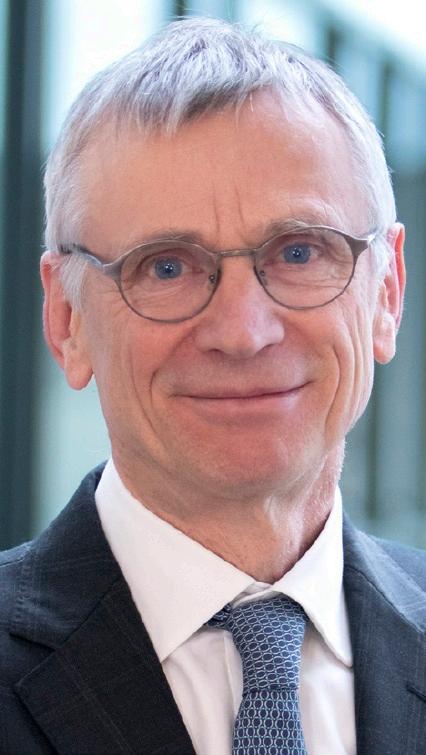
David Cooper is the acting executive secretary of the Secretariat of the Convention on Biological Diversity. He was previously deputy executive secretary in charge of leading the strategic and planning activities, as well as the intergovernmental processes and activities under the convention and its Cartagena and Nagoya Protocols. He has more than 30 years’ experience in environmental and agricultural science and policy, and international negotiations. As secretary of the 15th Conference of the Parties to the CBD, he was instrumental in facilitating the adoption of the Kunming-Montreal Global Biodiversity Framework.
X-TWITTER @hdavidcooper and @UNBiodiversity www.cbd.int
responsibility of countries with great biodiversity. It also provides the opportunity for enhanced involvement of multilateral development banks and development finance institutes, which will facilitate the mainstreaming of biodiversity necessary to implement the plan.
G7 members have a special responsibility to help ensure the success of this new fund by making contributions. They must take the lead in mobilising the financial resources needed to allow all countries to implement the plan. In particular, at the Apulia Summit G7 leaders must act to ensure that the commitments included in the plan – to mobilise at least $20 billion in international financial flows by 2025, and 30 billion by 2030 – are met.
Countries must also find common ground to further develop the multilateral mechanism for fairly and equitably sharing the benefits from using digital sequence information on genetic resources, including developing a global fund. This would not only support implementing the Biodiversity Convention and the Nagoya Protocol, but also facilitate the work under other international agreements on agriculture, health and biodiversity beyond national jurisdictions.
COP16 in October in Cali, Colombia, will be a critical moment for the Biodiversity Plan and the global community. Parties to the convention are expected to show their updated

NBSAPs, further develop the monitoring framework and advance resource mobilisation. COP16 is also due to finalise and operationalise the multilateral mechanism on the fair and equitable sharing of benefits from the use of digital sequence information on genetic resources.
DRIVING GLOBAL CHANGE
G7 leaders – some of the largest global economies – must be at the forefront of implementation, driving global change and making the transformative changes needed across economies and societies to ensure sustainable and equitable development. This includes reducing greenhouse gas emissions and limiting negative actions for biodiversity, while promoting sustainable agriculture, forestry and fisheries, as well as sustainable consumption and production patterns across all sectors. G7 members can demonstrate leadership by phasing out or reforming incentives that harm biodiversity and moving to align all public and private investments with the Biodiversity Plan.
The Biodiversity Plan is our best chance to halt and reverse the loss of biodiversity, creating a sustainable future for generations to come. If we all share the responsibility and act now, we will see results by 2030. Let us work together to build back biodiversity and create a sustainable future. We must all be part of the plan – the Biodiversity Plan for life on Earth.
The world is looking to the G7 to lead the charge.
The world is on the cusp of crossing critical thresholds in the global climate, with 1.5°C warming, and biodiversity loss, with fewer than 50% land surfaces biotically intact –interwoven with the first global pandemic in modern times, escalating nationalist conflicts, and the unknown promise and threats of artificial intelligence, among other factors. In 2021 the G7 science academies, citing the Intergovernmental Science-Policy Platform on Biodiversity and Ecosystem Services, called on “G7 nations to integrate the multiple values of biodiversity into decision-making, and to pursue cross-sectoral solutions that address the biodiversity, climate and other linked crises in a coordinated manner”.
Three ongoing assessments from IPBES – on nexus interlinkages and on transformative change (both due in December 2024), and on business reliance and impacts on biodiversity (due in December 2025) – respond to this call, and will advance guidance on concrete actions and pathways. But action must not wait. Foundations being laid today can be strengthened and expanded, to enable further solutions and seed transformation.
The Kunming-Montreal Global Biodiversity Framework, like the Sustainable Development Goals, expresses “stretch ambition” to inspire action at the scale needed. But countries face the dual challenges of investing in tangible, incremental steps in the right directions, while striving for transformative pathways to deliver the scale of impacts needed.
Three broad areas of action are needed to bridge the achievement gap for global targets: first, the necessity of actively conserving and sustaining natural systems as well as their benefits and importance to people; second, a precondition of reversing the drivers of decline, without which success will be compromised –perhaps catastrophically; and third, the imperative to
As the world teeters on the edge of breaching critical thresholds in the global climate, there are three clear areas of action required to bridge the achievement gap for international targets
achieve equity and fairness among all people, present and future. These correspond with the principles underpinning the sustainable development paradigm, offering a translation mechanism to support coherent and aligned action among countries and global society, and the potential transformation of commitments to the levels needed by 2030.
By David Obura, chair, Intergovernmental Science-Policy Platform on Biodiversity and Ecosystem ServicesWith a focus on benefits from nature to people, the sustainable development paradigm is about interactions among nature, economy and society, with benefits flowing up the stack and drivers flowing down the stack (see figure 1). Reframing those three actions according to this nature-economy-society heuristic can provide clear guidance for their implementation.
Conservation and restoration actions are essential to slow and minimise biodiversity loss, and to halt decline. But evidence shows that without broader changes those actions are insufficient to achieve the goal of improving the state of biodiversity globally. Required actions on economy and society are incorporated in the Global Biodiversity Framework, but political deadlock, siloed approaches and vested interests raise nearly insurmountable barriers to success.

David Obura chairs the Intergovernmental Science-Policy Platform on Biodiversity and Ecosystem Services. He is a member of the Earth Commission and founding director of CORDIO East Africa, a coral reef research and conservation organisation. With 30 years’ experience in Africa and tropical regions, he is developing a new focus on sustainability and equity, linking challenges and solutions from local to global scales, and working with teams to identify pathways to a safe, just world for present and future generations. His work was featured in the cover story of the New York Times Magazine on 29 October 2023.
X-TWITTER @dobura and @IPBES ipbes.net and cordioea.net
The direct drivers of nature’s decline are delivered through economies, and are generally increasing. The IPBES Global Assessment showed that habitat conversion, overexploitation, pollution and invasive alien species are increasing. Climate change, the fifth and increasingly dominant driver, is itself driven by the thirst for energy to fuel economic growth, through the use of fossil fuels. The dominant economic and financial systems reward minimising or discounting costs of inputs from nature – and outputs back to it – to maximise the conversion of natural assets into financial assets. Wealth grows faster than the global population, and inequalities in its distribution are increasing, among and within countries (see figures 2 and 3). Current market systems strongly disincentivise investment that halts and reverses growth. Changing these factors requires action by the dominant economic countries and private actors, by multilateral organisations such as the World Trade Organization, and by sectoral entities such as those in food, water and energy.
The values and behaviour that underpin the institutions and decisions in society determine what is incentivised in the links among nature, economy and society. The dominant value system maximises material flow and profit, and the fungibility of the final repository of wealth – financial assets – incentivises the accumulation and concentration of that wealth. By accommodating a plurality of values, and understanding we must not exceed (and in some cases must return within) certain planetary boundaries, actors can rebalance the flows among nature, economy and society, and thus achieve greater equity.
As the leading economies globally, G7 members control the levers that will enable the necessary economic and societal actions (see table 1). The time is now to leverage all trade, economic and political resources necessary to enable achievement of the SDGs, the Paris Agreement and the Global Biodiversity Framework by 2030.
Figure 1. Flows among nature, economy and society
3. G7 compared to low-income country economies, 2000 and 2020
Table 1. Actions needed to complement and enable success
∙ R educe demand and excess extraction
∙ internalise costs to minimise impacts
∙ circularise flows to eliminate or minimise end products and byproducts
SOCIETY
∙ P raise minimum wealth and well-being for every person
∙ reduce overconsumption and overaccumulation of wealth
∙ improve and achieve equity for current and for future generations

Can the Apulia Summit deliver on its energy plans? Historically, the G7 has performed well on its commitments in this area, but further work is essential for actionable outcomes that urgently mitigate both the energy and climate crises
How can the G7 manage and mitigate the complex, interconnected energy challenges at the forefront of the leaders’ agenda when they meet in Apulia in June? Italy’s prime minister and G7 host Georgia Meloni has said that Italy’s geographic location enables it to become a “natural energy supply hub for Europe” through its Mattei Plan, which builds on Italy’s strategic partnerships with Africa and its Mediterranean neighbours. But can the Apulia Summit deliver?
Due to the first oil shock in the 1970s, energy appeared in the communiqué at the leaders’ first meeting in Rambouillet in 1975.
Since then, G7 leaders have dedicated an average of 10% of their communiqués to energy. Between 1975 and 1989 all but two summits – Bonn 1985 and Toronto 1988 – addressed energy.
From 1990 to 2004, the highest proportion on energy was 9% at London in 1991, and the lowest was 0.4% at Kananaskis in 2002. Between 2005 and 2014 came increases, with energy averaging 15% per summit. They peaked at L’Aquila in 2009 with 38% and sunk to 3% at Gleneagles in 2005. From 2015 to 2021, G7 summits produced fewer energy conclusions, peaking at Elmau in 2015 with 13%, falling off the agenda at the G7’s first virtual summit in March 2020, and staying low at 4% at Cornwall in 2021.
Energy spiked to 22% at Elmau in 2022, following Russia’s invasion of Ukraine. It stayed at 22% at the 2023 Hiroshima Summit given the ongoing conflict.
A total of 604 energy commitments have been generated at all summits from 1975 to 2023, surpassed only by the number of commitments on development.
From 1975 to 1983, 113 energy commitments were made. They peaked during the second oil shock of 1979: the summit at Tokyo made 43 energy commitments, representing 78% of the total.
The period from 1984 to 1996 had no energy commitments, apart from London in 1991 with only three (5%).
An increase came between 1997 and 2005, with 57 commitments generated at Gleneagles in 2005 (26%). That record peak was surpassed the following year when Russia hosted its first and only G8 summit, which produced a new high of 78 energy commitments (for 24% of the total).
By Ella Kokotsis, director of accountability, G7 Research GroupSince then, the number of commitments on energy has varied: up to 41 (12%) in Heiligendamm in 2007, but none at Lough Erne in 2013, Biarritz in 2019 and the virtual summit in 2020. Cornwall in 2021 generated 14 (31%) and Elmau in 2022 made 49 (5%). Hiroshima in 2023 set a new all-time high of 85 (8%) commitments on energy.
Of all these commitments, seven have been made on eliminating inefficient fossil fuel subsidies, starting at Camp David in 2012.
Members’ compliance with their energy commitments averaged 84%, surpassing
the 77% average across all subjects, as assessed by the G7 Research Group. Compliance was high for commitments made at Genoa in 2001 with 100%; then 89% for Sea Island in 2004 and St Petersburg in 2006; then 87% for Heiligendamm in 2007 and Hokkaido-Toyako in 2008; back up to 100% for Charlevoix in 2018; and then 94% for Cornwall in 2021 and Elmau in 2022. By December 2023, the Hiroshima Summit had already achieved 100% compliance. Low compliance came for commitments made at Evian in 2003 with 61% and Camp David in 2012 with 68%. Overall, energy compliance was led by the European Union at 95%, followed by the United States at 93%, the United Kingdom at 91%, Germany at 88% and Canada at 86%. Below the 84% average came France at 82%, Japan at 79% and Italy at 68%.
The highest compliance of 100% came on commitments that referenced G7 energy ministerial meetings or created G7 official-level energy bodies. High compliance also came on commitments
Ella Kokotsis, PhD, is director of accountability of the G7 and G20 Research Groups. She has attended most G7 summits since 1994, has written broadly on various aspects of summitry and global governance, has directed the research and publication of numerous analytical documents, and has spoken extensively at summit-related conferences world-wide. She is co-author, with John Kirton and Brittaney Warren, of Reconfiguring the Global Governance of Climate Change and, with John Kirton, of The Global Governance of Climate Change: G7, G20 and UN Leadership X-TWITTER @g7rg www.g7.utoronto.ca
that referred to public-private sector partnerships (95%), linked to regulatory frameworks (89%), and defined timetables for actionable outcomes (88%). Energy commitments that used highly binding language had 86%, and those with low binding language had 81%. The three commitments made since 2016 that explicitly referenced the climate, greenhouse gas emissions or
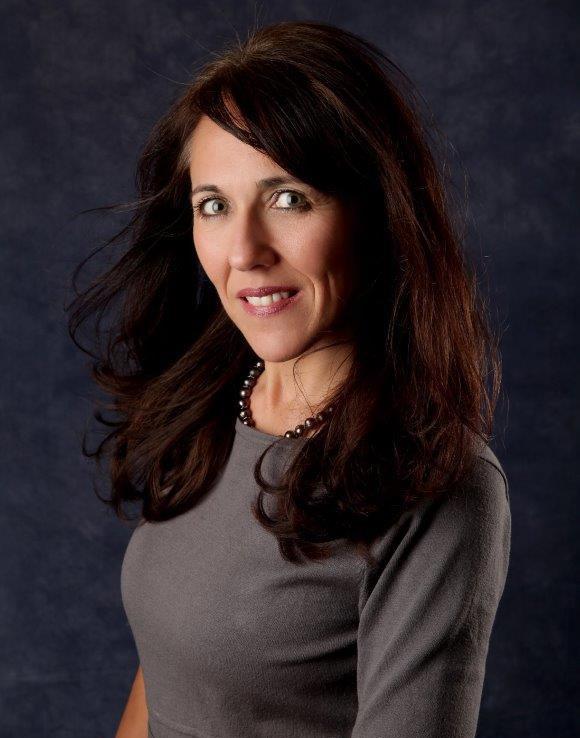
decarbonisation had 86% compliance. Commitments referencing non-G7 agencies had 78%.
At Apulia, G7 leaders can improve compliance by engaging their energy ministers to agree on highly binding commitments with defined timetables for actionable outcomes that will mitigate both the immediate energy crisis and the climate crisis now.
The Accelerated Partnership for Renewables in Africa sends a clear message to the world: Africa is committed to playing a pivotal role in the global energy transition – and the G7’s involvement could be transformative
The global trajectory of the energy landscape is undoubtedly heading towards a renewables-based energy system. With the historic decision to triple renewable power by 2030 at the 28th Conference of the Parties to the United Nations Framework Convention on Climate Change in Dubai in December 2023, this imminent shift is now accelerating at an unprecedented pace.
By targeting a five-fold increase in Africa’s renewable energy capacity by 2030, the Nairobi Declaration – adopted at the inaugural Africa Climate Summit last year – sent a clear signal to the world: Africa is committed to assume a pivotal role in the global transition to renewable energy.
This vision for Africa is firmly rooted in the vast human and natural resources of the world’s youngest continent. It also presents a pathway for African countries to pursue economic development and environmental sustainability in tandem, without compromise.
Yet, as the renewable energy sector accelerates its rapid growth, Africa is still being left behind. In fact, only 2% of global investments in renewable energy in the past two decades were made on the continent.
With Italy’s G7 presidency clearly underscoring that African development is a priority for discussions at the Apulia Summit, a pivotal opportunity arises for the Global North to support Africa’s clean energy agenda, which sits at the nexus of addressing the continent’s pressing social, economic and environmental challenges.
The Accelerated Partnership for Renewables in Africa, launched by President William Samoei
Ruto of Kenya ahead of COP28, aims to bring this ambitious vision to life.
As an international alliance led by African countries, APRA offers a unique collaborative platform tailored to African needs and capabilities. It also bridges the cooperation gap between the Global North and South, a critical priority for tripling renewable energy capacity by 2030, according to the International Renewable Energy Agency.
By Francesco La Camera, director-general, IRENAThe partnership promotes a holistic approach that mobilises action and commitments from public and private entities and coordinates international efforts for meaningful, systemic change on the continent. At present, Kenya, Ethiopia, Ghana, Namibia, Rwanda, Sierra Leone and Zimbabwe are APRA members, with Germany, Denmark, the United Arab Emirates and the United States supporting the partnership and IRENA fulfilling the secretariat role.
Plans are under way for APRA to broaden its reach, with its membership expected to expand in the coming months and years, to engage more countries with high ambition on renewable energy and green industrialisation in Africa.
The G7’s role in this pivotal moment can be transformative. By joining APRA and endorsing its visionary approach, all the G7 members can amplify the impact of this partnership and promote its alignment with G7 priorities. This partnership can also offer a regular dialogue mechanism between G7 and APRA members to exchange ideas and expand cooperation.

Francesco La Camera assumed the role of director-general of IRENA in 2019. He formerly served as director-general of sustainable development in Italy’s Ministry of Environment, Land and Sea. As the national coordinator for the circular economy, he led the Italian delegation at several Conferences of the Parties to the United Nations Framework Convention on Climate Change. He served as co-chair of the Africa Centre for Climate and Sustainable Development and co-chaired the Financial Platform for Climate and Sustainable Development.
X-TWITTER @flacamera irena.org
% of global investments in renewable energy in the past two decades were made in Africa

APRA offers a unique collaborative platform tailored to African needs and capabilities. It also bridges the cooperation gap between the Global North and South, a critical priority for tripling renewable energy capacity by 2030”
Countries in Sub-Saharan Africa face some of the highest costs of finance in the world, demonstrating the need for further international collaboration, including the engagement of multilateral development banks and an increased role for public finance. Through APRA, G7 members can help create an investment-friendly environment in Africa, bolstering confidence among private companies and financial institutions looking to collaborate with APRA countries.
APRA also leverages African resources in support of global supply chain diversification efforts in ways that align with African interests. This means
an approach that goes beyond resource extraction, focusing instead on promoting manufacturing within the continent to spur economic growth and create jobs, aligning with Africa’s developmental objectives.
As the energy transition accelerates globally, the G7’s partnership with APRA presents a pivotal opportunity to ensure that Africa is not sidelined. By leveraging Africa’s vast potential to benefit from and contribute to the global energy transition, G7 members have a unique opportunity to reimagine international cooperation through a pragmatic lens rooted in mutualism and fairness.

For some time now, Italy has been promoting technological neutrality in Europe, and it is inspiring Italy’s presidency of the G7, with commitments to double energy efficiency
By Francesco Corvaro, Italy’s special envoy on climate changeThe 28th Conference of the Parties to the United Nations Framework Convention on Climate Change in Dubai marked a new step along the path of combating climate change, which many have identified as the historic text in the Outcome of the First Global Stocktake: “Transitioning away from fossil fuels in energy systems, in a just, orderly and equitable manner, accelerating action in this critical decade, so as to achieve net zero by 2050 in keeping with the science”. From my point of view, there is an equally fundamental turning point right after that in the very next paragraph: “Accelerating zero- and low-emission technologies, including, inter alia, renewables, nuclear, abatement and removal technologies such as carbon capture and utilization and storage, particularly in hard-to-abate sectors, and low-carbon hydrogen production”. This statement represents the best expression of the
concept of technological neutrality that Italy has been promoting in Europe for some time now. This principle establishes the need to exploit all the technologies that allow for energy production without emitting greenhouse gases to achieve the goals of the Paris Agreement – and it is inspiring Italy’s presidency of the G7. This commitment includes tripling the installation of renewable energy plants by overcoming bureaucratic and legislative obstacles, and thus doubling energy efficiency. It also reopens a debate that until recently was taboo in both national and international public opinion regarding new nuclear technologies: small nuclear reactors and nuclear fusion.
At the same time, in a pragmatic manner, the Italian presidency reaffirms the need to support this path by maintaining the use of natural gas in those hard-to-abate applications, while promoting research and development of carbon capture technologies such as the Callisto project in Ravenna. The ministerial meeting of environment and energy ministers in Turin in April addressed these critical issues, which will also be summarised in the final statement issued by the G7 leaders in Apulia.
In other words, Italy – satisfied with the recognition of the principle of technological neutrality, which it
Italy is reopening the debate on new nuclear technologies, which was until recently taboo in both national and international public opinion

has always supported – proposes a pragmatic and non-ideological approach, within the G7 framework, as the only possibility for achieving a sustainable future starting from an equally sustainable present, from an environmental, economic and social point of view, as the only way not to leave anyone behind.
Moreover, the particular attention given by the Italian presidency to these issues has been recently underlined by the International Energy Agency, which noted that Italy has put COP28 energy outcomes at the core of its climate, energy and environment ministerial.
Italy’s Mattei Plan for Africa is also evolving in this direction, having identified six main pillars: education and vocational training, water, energy, health, agriculture and infrastructure. These are all themes that, in the last COP in Dubai, represent internationally recognised key factors that require simultaneous action in order to achieve the ambitious goal of limiting global warming to a 1.5°C increase.
The distinguishing feature of the Mattei Plan is its methodology, inspired by a global and non-predatory approach that responds to the needs of Africa. It recognises the centrality of
Given the vastness of the African continent – larger than the United States, Europe and China combined – the Mattei Plan divides Africa into quadrants along north-south and west-east axes”
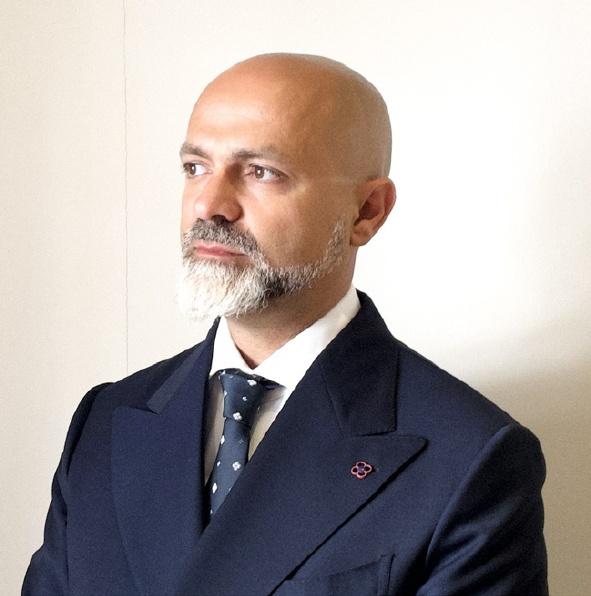
Francesco Corvaro was appointed Italy’s Special Envoy for Climate Change in August 2023. With more than 20 years’ experience in thermodynamics, renewable energy, net-zero and sustainability, he is a professor at the Università Politecnica delle Marche and adjunct professor at the Catholic University of America. He is responsible for initiating and maintaining several international projects with academia and industry, including Architect of the Capitol and the Naval Research Laboratory (in Washington DC), as well as with Arup Group, Tiber International Group, the University of Tennessee, Maryland University and Georgetown University.
shared sustainable socioeconomic development and responsibilities for stability and security as the foundation of lasting mutually beneficial relationships between Africa and Europe. The Mattei method can be summarised as “listen, respect, build together”.
Given the vastness of the African continent – larger than the United States, Europe and China combined – the Mattei Plan divides Africa into quadrants along north-south and west-east axes. In the first phase, the initiative focuses on pilot projects in Kenya, Ethiopia, Mozambique, Congo and Côte d’Ivoire for the sub-Saharan quadrant, and Egypt, Tunisia, Morocco and Algeria for the North African quadrant. In a second phase, the plan, in concentric circles, will extend to other countries on the continent, following an incremental logic. All this is done with the awareness that no long-term results can be achieved without the participation of all national actors and key international partners in implementing the Mattei Plan. This is the trigger for a virtuous circle that creates and spreads wealth and development in Africa through mutually beneficial cooperation with Europe.

The G7 has near-unparalleled influence in global digitalisation governance, and the Apulia Summit marks a renewed opportunity to demonstrate its commitment to spreading the benefits of digital technologies to everyone
By Hiromitsu Higashi, senior researcher, G7 Research GroupIn recent years, the rapid growth of digital technologies has presented a mix of unprecedented opportunities and challenges. Generative artificial intelligence systems built on advanced language models have revolutionised our understanding of machine language processing, and reshaped the discourse on disinformation and intellectual property rights. As the global internet becomes faster and more accessible, concerns over internet fragmentation are growing, with national governments seeking to impose greater control over this boundary-defying technology. Surveillance cameras are widely deployed for various smart city initiatives, simultaneously prompting a re-evaluation of privacy and individual rights. The governance of the evolving digital landscape is deeply intertwined with the G7’s core mission of promoting democracy and human rights and requires immediate and coordinated action by the G7 leaders when they meet in Apulia.
From 1975 to 2023, the G7 produced 16,967 words on digitalisation, not including information and communications technology, in its communiqués, averaging 346 words (or 2% of the total) per summit. The topic was addressed in only three of the 38 summits until 2012. Between 2013 and 2023, the G7 dedicated on average 1,502 words (11%) to digitalisation per summit. At Hiroshima in 2023, the leaders produced 4,387 words (15%), the highest ever in absolute terms.
The G7 has produced 229 collective, future-oriented and politically binding commitments on digitalisation and ICT. This puts digitalisation in 13th place, slightly behind macroeconomic policy (with 328 commitments) and before democracy (with 153 commitments). Of these digitalisation commitments, most – 163 – have been made since 2013, averaging 15 per summit. The G7 produced 37 digitalisation commitments in 2023, the highest ever.
The G7 Research Group has assessed 17 of the 229 digitalisation commitments for compliance by G7 members, and found it averaged 85%. This is significantly above the G7’s overall average of 77%. However, compliance on digitalisation has averaged 79% since 2013. Therefore, available data indicate a somewhat negative relationship

between delivery on commitments and the number of commitments made.
The governance of digitalisation is complicated: the application of digital technologies cuts across many sectors and industries, from finance and green energy to health and national security. The challenge also comes from the speed of innovation, which continues to outpace policy and regulatory responses from G7 policymakers. Based on available data, however, the G7 can consider two ways to improve performance in governing the digital sphere.
First, G7 leaders can refer to relevant institutional bodies in writing their commitments, to catalyse compliance. In the past, G7 compliance with digitalisation commitments was particularly high when the commitments referred to an institutional body such as the Digital Opportunities Taskforce (100%), the Global Partnership for Artificial Intelligence (94%) and the Genoa Plan of Action (88%).
Second, G7 leaders can take advantage of the strong momentum on AI governance
Hiromitsu Higashi is a stakeholder engagement regional analyst at the Internet Corporation for Assigned Names and Numbers (ICANN) based in Singapore. He holds an MA in international relations from the Johns Hopkins School of Advanced International Studies in Washington DC. He has been a member of the G7 Research Group since 2019. His research focuses on internet governance. All opinions are strictly his own.
X-TWITTER @g7_rg www.g7.utoronto.ca
Available data indicate a somewhat negative relationship between delivery on commitments and the number of commitments made”
through ambitious, focused deliberations and decision making on AI. The two assessed AI-related commitments have high compliance scores of 100% and 94%, respectively. The topic has also seen rapid development of global governance since 2023. In October 2023, G7 leaders issued a statement on the Hiroshima AI Process as well as guiding principles and a code of conduct for organisations developing AI systems. In November, the United Kingdom hosted the first AI Safety Summit to facilitate international collaboration on AI risk management; in December, the G7 digital ministers released the Hiroshima AI Process Comprehensive Policy Framework , which included intra-G7 project-based collaboration and represented the first successful international framework comprising guiding principles and a code of conduct to address the impact of advanced AI systems. In the same month, the GPAI Summit was held in India, a G20 member, as a multi-stakeholder initiative to bridge the gap between theory and practice on AI. These institutional developments have laid a solid foundation supported by shared values for the G7 to coordinate policy and engagement efforts to expand global buy-ins to its unified vision for building safe, trustworthy and human-centric AI.
The G7 is defined by having the world’s most advanced technological capacities as well as a shared mission to promote democracy and individual liberty. This unique combination equips it with near-unparalleled influence in global digitalisation governance –and the Apulia Summit represents yet another opportunity for the leaders to demonstrate their commitment to spreading the benefits of digital technologies to all of humanity.

Acting boldly on universal connectivity and sustainable digital transformation can unlock the power of digital to achieve the Sustainable Development Goals, and they are top priorities for the International Telecommunication Union
What is your vision as secretarygeneral of the International Telecommunication Union?
I was elected secretary-general of the International Telecommunication Union, the United Nations agency for digital technologies, on a platform that called for the ITU to be at the forefront of global efforts to meet connectivity needs and expand digital opportunities for people everywhere. Our members gave us a clear mandate to act boldly on universal connectivity and sustainable digital transformation. These two strategic goals are at the top of my priorities. They are catalysts for progress and can unlock the power of digital to achieve the Sustainable Development Goals.
What are the major needs and challenges confronting the ITU?
In a world where digital is moving at warp speed, I see three major challenges. The first, and perhaps defining one, is to align digital inclusion with the pace of digital
transformation. World-wide, 2.6 billion people are still offline – not to mention all those on the wrong side of the digital divide because 3G is their only way to connect to the internet or they don’t feel safe online, don’t have the skills to use the latest tools or cannot afford them. The second is to strike the right balance between the benefits and risks of digital and emerging technologies, to foster responsible development, deployment and use of these technologies without stifling innovation. The third challenge is to ensure that the radio-frequency spectrum and associated satellite orbit resources are shared equitably and sustainably for all humanity. These finite resources are the building blocks of advanced global communications, on Earth
and in space. As the global digital economy continues to expand, they are increasingly in demand.
How is the ITU working to meet these needs and challenges?
This moment was made for ITU. Our work – on emerging technologies, network and digital infrastructure, policy and regulation, statistics, digital applications and inclusion, cybersecurity, capacity development, digital literacy and skills, e-waste and emergency telecommunications – addresses sustainable development in all its dimensions: economic, social and environmental. Consensus building is essential to everything we do. Whether we manage the radio-frequency spectrum and satellite orbit resources, develop international standards or support global digital development, all voices are heard and heeded. We see this in our AI for Good platform, the largest UN system-led multi-stakeholder platform for artificial intelligence. As the historic resolution on AI recently adopted by the UN General Assembly recognises, this approach is necessary in developing frameworks for safe, secure and trustworthy AI systems. Today’s challenges are too big for any player to face alone. This is what drives our efforts in key UN processes such as the World Summit on the Information Society, the ITU Partner2Connect Digital Coalition and the ITU-UNICEF initiative to connect every school to the internet.
What results has it achieved?
The ultimate measure of success is progress in advancing our two strategic goals of universal connectivity and sustainable digital transformation. The past few months have seen important strides on both fronts. The ITU World Radiocommunication Conference 2023 reached key decisions ranging from international mobile telecommunications to space research and Earth exploration. It has put the world on a solid path towards a more connected, sustainable, equitable and inclusive digital future for all. The recent UN System White Paper on AI governance, led by ITU and UNESCO, is key to understanding the relationship among AI, the digital divide and sustainable development opportunities. It has identified technical standards among the instruments providing a solid foundation for international AI governance. These standards – a core function of ITU – are a prerequisite for effectively implementing guardrails. They also help level the playing field for countries in the Global South, which are at the heart of P2C, the High-Impact Initiative on Digital Public Infrastructure, the Early Warnings for All initiative, and all ITU’s other initiatives that make the SDGs real in the lives of people everywhere.
What challenges remain?
With only a fraction of the SDG targets on track to be achieved by 2030, one urgent task is realising the potential of digital and emerging technologies for sustainable development across all the SDGs. This means closing the growing gap between the digital ‘haves’ and ‘have-nots’. While 89% of people in high-income countries are covered by 5G, the service
is nearly absent in low-income countries. The same is true for AI: a handful of developed countries with sufficient computing power and resources is leading AI research and development globally. And there’s the persistent digital gender gap: only 30% of women in least developed countries have internet access. This holds back the entire global digital economy. It also reminds us that in our interconnected world, what affects one of us has an impact on us all. At this critical moment – with the 20-year review of the World Summit on the Information Society, the Global Digital Compact and the UN Summit of the Future – we need to integrate voices of developing countries, women and girls, youth and civil society into our action plans to ensure they have a say in shaping the digital future.
How can G7 leaders best help?
2.6bn people are still offline
We are at a moment of opportunity. G7 members play an important role in building and improving digital infrastructure wherever it is needed most. This is also a moment of responsibility. Today’s digital experience must be affordable, safe, relevant and sustainable. In short, it must be meaningful. In March, G7 industry, technology and digital ministers showed leadership and vision by addressing all the core components, from standards to satellites. These priorities are also ITU’s priorities. We are already at work tackling issues such as space sustainability, as at least 40% of the SDGs rely on Earth observation and global navigation satellite systems. As I told the G7 ministers in Verona, ITU looks forward to strengthening our collaboration with the G7 in all these areas. Today, digital is the agenda. It is the single greatest force redefining development as we know it.
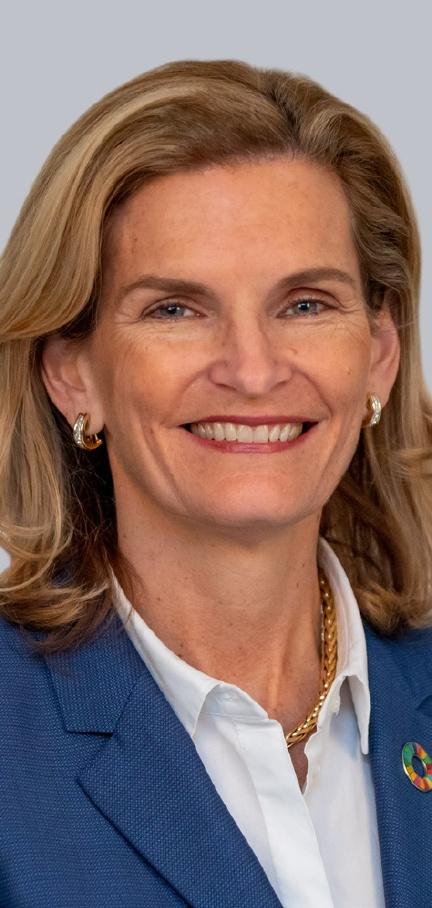
Doreen Bogdan-Martin took office as secretary-general of the International Telecommunication Union on 1 January 2023. She was director of ITU’s Telecommunication Development Bureau from 2018 to 2022, and previously served as executive director of the ITU-UNESCO Broadband Commission for Sustainable Development for more than a decade. She also led ITU’s Strategic Planning and Membership Department and the ITU Telecommunication Development Bureau’s Regulatory and Market Environment Division and Regulatory Reform Unit. Before joining ITU in 1994, she worked in the National Telecommunication and Information Administration of the US Department of Commerce.
Twitter @ITUSecGen itu.int

Rapid digitalisation, propelled by advances in artificial intelligence, has reshaped the global economy and society –but it has also brought a host of challenges that the G7 is well poised to help address
Today, the internet connects more than 5.3 billion people and is a shared resource on which society depends. It was created on the premise that free and broad access to information supports the greater good. The complexity and scale of the internet, and its ever-increasing number of users, demand that it be governed transparently and through a globally inclusive process. Recent rapid digitalisation, propelled by advances in artificial intelligence, has reshaped the global economy and society. While offering benefits such as enhanced connectivity, improved business efficiency and greater access to information, this transformation has also brought a host of challenges, including cybersecurity threats, privacy concerns and the widening of the digital divide. These developments necessitate a robust, globally representative governance framework.
One example of its complexity and its role in network coordination is the Domain Name System, which
By Sally Costerton, interim president and chief executive officer, ICANNenables people to navigate the internet. Each device on the internet uses an internet protocol address, which is difficult to remember because it is a long series of numbers, or numbers and letters. These ‘unique identifiers’ are aligned with the protocol parameters that ensure networks can communicate with each other. The DNS helps users navigate the internet by translating the numbers into memorable names.
The Internet Corporation for Assigned Names and Numbers, a non-profit, public benefit organisation, is specifically responsible for overseeing the global DNS infrastructure. It ensures the stable and secure operation of the internet’s unique identifiers systems and coordinates the allocation and assignment of names in the root zone of the DNS through its Internet Assigned Numbers Authority functions.
ICANN is accountable to stakeholders worldwide and works with technical partners in the internet ecosystem

to evolve and enforce the rules that ensure one secure, stable, interoperable internet. ICANN operates using a multi-stakeholder model, one of the most representative forms of policymaking. Through this approach, ICANN fosters collaboration among governments, the private sector, civil society, academia and the technical community, ensuring diverse perspectives are considered in the development of internet-related policies. ICANN’s Governmental Advisory Committee, with 182 members and 38 intergovernmental organisations as observers, is the voice of governments and IGOs within ICANN’s processes.
The challenges to internet governance are varied and significant, with implications that could negatively affect the future development and inclusivity of the internet. ICANN has made significant strides in adapting the DNS to the demands of a changing digital landscape. It has expanded the number of top-level domains to include words in non-Latin scripts – increasing accessibility and inclusivity worldwide. ICANN also is actively working to enhance DNS security against increasing cyber threats and ensuring that technical internet governance policies respond to the needs of a global user base. However, challenges remain. Conflating applications or content with the technical infrastructure of the internet is one of the main challenges the technical
5.3bn
people connected by the internet
community faces today. This confusion could exacerbate potential future fragmentation of the technical internet infrastructure, a concern that was raised in the G7 declaration in March 2024. Such misapprehensions and related discussions about the governance of the internet and its content could well dominate the 20-year review of the World Summit on the Information Society (WSIS+20) taking place in 2025. This would detract from critical issues of advancing global internet development and expanding digital transformation.
The technical infrastructure of the internet is functioning well and should not be confused with content and communications issues. This distinction underscores the need to preserve the values that have made the Internet an innovation engine. Achieving this goal necessitates constant commitment, collaboration and trust.

WSIS+20 presents a crucial opportunity to reaffirm the commitment to a multi-stakeholder approach. This approach is vital for ensuring inclusive and effective governance of global internet infrastructure and avoiding the pitfalls of conflating technical elements with content governance.
As the G7 leaders convene, they have a critical role in reaffirming their support for the work of organisations like ICANN. Our shared goal must be to reduce barriers to participation, not to raise fences.
Ultimately, navigating the evolving digital landscape requires concerted efforts and collaboration on a global scale. By prioritising security, stability and inclusivity, policymakers and stakeholders pave the way for a digital ecosystem that benefits everyone.
Sally Costeron is the interim president and CEO of the Internet Corporation for Assigned Names and Numbers, and has served as senior advisor to the president and senior vice president for Global Stakeholder Engagement since 2012. Prior to joining ICANN, she was CEO of Europe, Middle East and Africa for Hill & Knowlton. Throughout her career, Sally has worked with diverse international companies and senior leaders to maximise their resources and build strong relationships with their stakeholders. She is an experienced board director, including roles as board chair.
Twitter @ICANN icann.org
The G7 Apulia Summit marks an opportunity to drive further progress on regulating the development and use of artificial intelligence – a fast-evolving landscape that is teetering between national sovereignty and international cooperation
The 50th annual G7 summit in Italy represents a crucial juncture in the global dialogue on artificial intelligence and global governance. Between the summit in Apulia in June 2024 and its predecessor in Hiroshima in June 2023, many initiatives have aimed at shaping the trajectory of AI development. These include the Summit on Responsible AI in the Military Domain, convened by the Netherlands, and the AI Safety Summit at Bletchley Park, hosted by the United Kingdom. There is also the G7’s very own Hiroshima AI Process, with a policy framework that comprises guiding principles and an international code of conduct, among other things.
THE SHIFTING AI GOVERNANCE LANDSCAPE
Such recent endeavours to regulate the development and use of AI have made good progress in putting into place the foundational building blocks, such as
ECOSYSTEM, NOT EXPLOSIVES
Perhaps the best way to think about AI in relation with the nuclear weapons challenge is that AI is more akin to an ecosystem consisting of different species (that is, applications) that interact in complex ways to shape the environment (in other words, society), rather than an explosive weapon that needs to be governed by principles of containment and non-proliferation.
By Kenddrick Chan, LSE IDEAS, and Chris Alden, professor of international relations, LSE
guiding principles and joint declarations of intent. The UK’s AI Safety Summit in late 2023 was relatively remarkable given that it was attended by states that are leading the AI field. The summit culminated in the Bletchley Declaration, which acknowledged AI’s inherent risks, called for international cooperation to address them, and reiterated the need for safe, human-centric and responsible development and use of AI. Similar sentiments are echoed elsewhere, as demonstrated by the United Nations General Assembly’s adoption of Resolution 78/241 in December 2023, which revolved around the states’ concerns regarding the application of AI in the military domain.
At the regional level, the landscape of AI regulation is also evolving. AI regulation policy is being worked on at the African Union, and the EU Parliament has adopted the AI Act. However, various challenges lie ahead. Competing national interests mean that states will likely prioritise national security and tech leadership over collaborative safety standards, especially in AI technologies that have dual-use capabilities. This preference may lead to a ‘wall of national sovereignty’ and, if states retreat behind this wall, the resulting regulatory divergence –characterised by conflicting regulations and standards – poses a major barrier to international AI cooperation. The lack of legally binding enforcement mechanisms also limits the impact of international initiatives as their practical effectiveness often hinges on enforcement measures to ensure compliance.
The progress made over the past year is a cause for optimism. At Apulia, G7 leaders should continue building upon the progress made, with two focus areas.
The first is for G7 leaders to collectively commit to operationalising the Hiroshima AI Principles. This could

Kenddrick Chan is the head of the Digital International Relations project at LSE IDEAS, the foreign policy think tank of the London School of Economics and Political Science. He was also a 2022–2023 Fellow at the Portulans Institute.
X-TWITTER @kenddrick
Chris Alden is a professor of international relations at the London School of Economics and Political Science and the director of LSE IDEAS. He was a co-chair of the G20’s Think20 Task Force on Reformed Multilateralism for India’s G20 presidency.
X-TWITTER @lseideas lse.ac.uk/IDEAS


Recognising AI as a global challenge necessitates a broader inclusion beyond the group’s members. It is crucial that G7 leaders mitigate any perception that their initiatives are insular”
include a commitment to provide substantive support for the Hiroshima AI Process. Tangible efforts in this regard could include the establishment of mechanisms for enhanced information sharing and incident reporting, as outlined in Principles 2 and 4. Offering training support to organisations to foster the development of relevant AI policies, as suggested in Principle 5, is another example. Moreover, G7 leaders should seek to identify and leverage synergies between the Hiroshima AI Process and other frameworks – particularly for European G7 members, where alignment with the EU’s AI Act could offer mutual reinforcement.
Second, recognising AI as a global challenge necessitates a broader inclusion beyond the group’s members. It is crucial that G7 leaders mitigate any perception that their initiatives are insular. To this end, engaging with developing states in a gradualist manner is vital, echoing successful precedents with the development agenda, which culminated in the Monterrey Consensus and the Heiligendamm Process in the 2000s. Given AI’s rapid development, building mutual trust among states at each stage will further solidify the foundation for more sustainable international regulatory regimes.
At the Apulia Summit, the G7 has the potential to build upon a foundation of collaboration and inclusive engagement to drive further progress on global AI governance. By focusing on operationalising the Hiroshima AI Principles and ensuring sufficient outreach to others, G7 leaders can pave the way for a safer and more equitable future.
Global rules are urgently needed to ensure global artificial intelligence governance is anchored in international law, and studied – and implemented – through a truly global lens
How much have recently introduced digital technologies improved productivity?
No clear answer applies universally. The Organisation for Economic Co-operation and Development, for example, speaks of a ‘productivity paradox’ that shows that over the past decades, during which we saw widespread digitalisation, there was also the ‘protracted slowdown of aggregate productivity growth, contrary to all expectations’. Additionally, digitalisation is leading to the concentration of access to resources such as capital, data, microchips and computing power. This makes competition from smaller companies challenging, as it is in the space of artificial intelligence. The growth of large tech companies often does not translate into job creation but rather into capital concentration. All in all, it amounts to a broad concentration of power over digital technologies in the hands of private companies, which hurts the public interest and the agency of democratic governments.
How much impact will AI have?
According to the International Monetary Fund’s ‘Gen-AI: Artificial Intelligence and the Future of Work’, AI will have significant impacts on jobs worldwide. Some of the anticipated effects are surprising: the most developed economies are also set to experience the most job losses. The IMF foresees that 40% of jobs in

the world will be affected by AI. Those will not all be lost, but even a small percentage of lost jobs will have significant economic, social and political implications. Governments should prepare now.
What rules are needed to ensure that AI delivers the greatest benefits and the least harm?
The world over, researchers, policymakers and executives are listing a wide variety of risks and harms from the use of AI. Some focus on risks they consider existential and to be anticipated with more powerful AI in the future, while others point to the known risks and harms affecting democracy, equal treatment and fraud today. There is a lively debate about what counts as the most urgent, but little debate about the fact that there is risk associated with the use of AI. Governments should ensure they develop criteria and guardrails through regulation, but also use investments and government spending wisely to shape AI markets.
On the international level we see a lot of activity. The European Union’s AI Act has been adopted as the first comprehensive and legally binding

The growth of large tech companies often does not translate into job creation but rather into capital concentration”
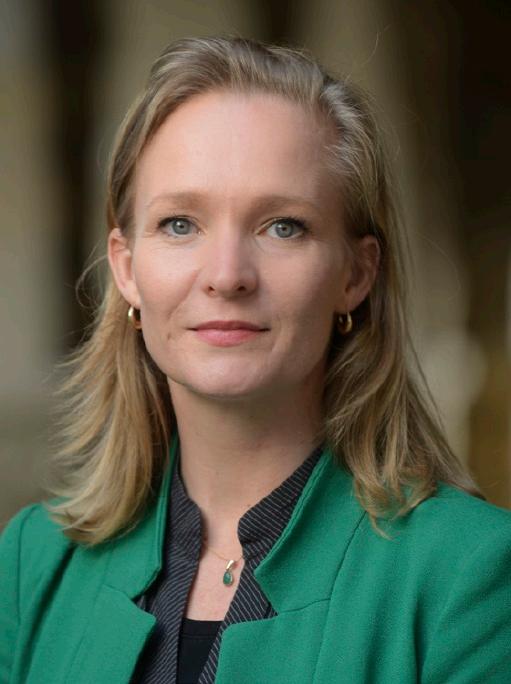
Marietje Schaake is international policy director at Stanford University Cyber Policy Center and international policy fellow at Stanford’s Institute for Human-Centered Artificial Intelligence. Between 2009 and 2019, she served as a member of the European Parliament for the Dutch liberal democratic party, where she focused on trade, foreign affairs and technology policies. She writes a monthly column for the Financial Times and serves on the AI Advisory Body of the United Nations. She is also an advisory board member of the Mercator Institute for China Studies, the European Council on Foreign Relations, the Observer Research Foundation and AccessNow.
X-TWITTER @MarietjeSchaake
of jobs globally will be affected by artificial intelligence 40%
law on AI in the democratic world. The United Nations has invited an advisory body to look at the global governance of AI, and there are initiatives at the G7 with the Hiroshima AI Process, as well as at the OECD. While it is understandable to try to collaborate across borders, the need for domestic regulation, especially in the United States, should not be overlooked. With its high concentration of AI companies, the US would set the tone for the world if it actually adopted AI laws. It’s not only about adopting new regulations for AI, though; it’s also about enforcing existing principles and laws in new contexts. We don’t need AI to understand that non-discrimination, antitrust rules and national security are important protections that governments must uphold and enforce.
The work I am involved with as a member of the UN AI Advisory Board focuses on ensuring global AI governance is anchored in international law, based on universal human rights and inclusive with a global outlook. To make that a reality, global rules are urgently needed. Too often people in the Global South or in developing economies are left out of the analysis and policy debates about AI. The UN is in a unique position to ensure it looks at AI governance needs through a truly global lens. Hopefully, the least we can achieve is to develop a bottom line of rights protecting AI governance that countries will use as a minimum threshold, although some countries may decide to adopt more ambitious rules.
G7 members have taken a strong step by adopting the Hiroshima AI Process with the code of conduct on AI as well as several ministerial declarations. For the articulated principles in these statements to become more meaningful, they should be operationalised. I hope the Apulia Summit will dedicate time to this important next phase of the G7’s AI leadership.

G7 compliance on its macroeconomic commitments has been strong in recent years, but there is room for improvement – especially in deliberation and decision making – and the leaders can use low-cost accountability measures to achieve higher compliance
By Alissa Wang, senior researcher, G7 Research Group
Macroeconomics is a core issue for the G7, which coordinates global policy among seven of the world’s most advanced large economies and the European Union. However, despite strong compliance with macroeconomic policy commitments, G7 policy deliberation and decision making have been gradually declining since the start in 1975. At the 2024 Apulia Summit, G7 leaders should maintain momentum in delivering on their macroeconomic commitments, while increasing their macroeconomic policy deliberations and the number of politically binding decisions that they make on this subject.
Since 1975, G7 leaders have devoted 29,846 words, for an average of 12%, to macroeconomic policy in their communiqués. However, this has generally declined over time. In 1975 they devoted 52% of the communiqué to this subject –
Alissa Wang is a senior researcher with the G7 and G20 Research Groups, based at the University of Toronto. She is pursuing a combined JD/PhD in political science with a focus on international relations and political theory. www.g7.utoronto.ca
the all-time peak. It declined gradually until 1981 and spiked to 48% in 1982, but declined in 1983 and 1984. It spiked again to 33% in 1985, followed by a long decline until 1992. The next spike came in 1993 to 21%, and another in 1998 to 18%. Then came a long decline followed by a spike in 2020 to 30%. Deliberation then dropped to 6% in 2021, 2022 and 2023.
Thus, from 1975 to 1982, on average G7 leaders dedicated 32% of their communiqués to macroeconomics. From 1983 to 1993, this dropped to 15%. From 1994 to 2019, it dropped further to 5%. From 2020 to 2023, it rose to a medium level of 12%.
Between 1975 and 2023, G7 leaders made 328 public, collective, precise, future-oriented, politically binding commitments on macroeconomic policy, as identified by the G7 Research Group. They account for 5% of the 7,223 total commitments. Compared to other subjects, macroeconomic policy ranks 12th among 35 subjects, after development, energy, health, climate change, environment, trade, terrorism, regional security, nonproliferation, and crime and corruption.
Decision making on macroeconomic policy passed through two phases. From 1975 to 1987, summits averaged a high 21% of commitments on macroeconomics. From 1987 to 2022, this dropped to a low 5%. However, within this second phase, there were two peaks in performance –the 1993 Tokyo Summit with 17% of its commitments on macroeconomics, and the 2020 virtual summit on the Covid-19 crisis in 2020, which dedicated 32% of its commitments to macroeconomics.
However, this then dropped sharply: at the 2021 Cornwall Summit to only 4%, at the 2022 Elmau Summit to 3% and at the 2023 Hiroshima Summit to only 2%.
G7 members have complied with the 25 macroeconomic policy commitments assessed by the G7 Research Group at a high level of 85% – above the G7’s all-time 77% average across all subjects.
Over the years, G7 compliance has been relatively stable at this high level. The first two summits with assessed commitments, made in 1996 and 1999, averaged compliance of 100% each. Subsequently only three dips came. For commitments made in 2003 and 2004, compliance averaged 63% and 61%, respectively. It peaked again for 2008 with 100% and stayed high at 95% for 2011. It lowered to 63% for 2016. Then it increased to 82% for 2017 and again to 100% for 2018.
For the 2020 virtual summit, during the Covid-19 crisis, compliance was 75%.
Average compliance since increased to 82% for 2021 and to 100% for 2022. By December 2023, macroeconomic compliance for the 2023 Hiroshima Summit was 100%.
Among G7 members, the highest compliance has come from the United
From 1975 to 1982, on average G7 leaders dedicated 32% of their communiqués to macroeconomics”
The inclusion of a reference to the private sector correlates with higher compliance. The one assessed commitment with such a reference averaged 100%, much higher than the overall 85% compliance on macroeconomics. Commitments that link to jobs or employment average 86%, slightly higher for those without such linkages. Commitments with links to education performed particularly well, averaging 94%, compared to 84% for those without.
States, Canada and France, each at 89%. During the G8 years from 1998 to 2013, Russia led with 95%. Then came the European Union at 87%, the United Kingdom and Germany at 85%, Japan at 81%, and Italy at 73%.
CAUSES AND CORRECTIONS
To improve compliance with their macroeconomic commitments, G7 leaders can use low-cost accountability measures that have coincided with higher compliance.
The number of companion commitments on related subjects does not appear to improve compliance significantly. However, a higher number of companion commitments on macroeconomics is correlated with a higher rate of compliance with the assessed commitments. For summits with more than 10 commitments on macroeconomics, their average compliance was 89%, compared to 75% for summits with fewer than 10 macroeconomics commitments.
Overall, G7 leaders should continue to build on the momentum of the recent high performance in compliance and reverse their long-term trend of declining performance in deliberation and decision-making on macroeconomic policy.
To meet the major structural challenges facing our world, we need closer cooperation – and the Organisation for Economic Co-operation and Development is working with its members and partner countries to achieve the shared goals of prosperity, stability and peace via specific proposals
In recent years, the world has had to navigate the impacts of major economic shocks: a one-in-100-year pandemic, a major war in Europe, the evolving conflicts in the Middle East and new forms of protectionism. All of this at a time when the world continues to face major structural challenges that require more effective policy responses: climate change, sustainable development, the digital transformation and artificial intelligence, as well as population ageing.
Although the task may look daunting, closer cooperation across a range of key public policy areas will help bring us closer to our shared goals of prosperity, stability and peace. Through continued policy analysis, dialogue and reform and on the strong foundation of our commitment to effective multilateralism, the Organisation for Economic Co-operation and Development is working with our members and partner countries to help achieve those objectives.
Specifically, to secure strong, sustainable, resilient and inclusive growth the OECD proposes that:
1. We need to remain vigilant in durably tackling inflation. There will be scope to lower nominal policy interest rates this year and next year as inflation declines. Still, the policy stance should remain restrictive in most major economies for some time to come.
By Mathias Cormann, secretarygeneral, Organisation for Economic Co-operation and Development2. We need to find the best ways to secure more robust productivity growth. Lowering barriers in product markets – that is, lowering barriers to entry, expansion and the exit of firms – is key to ensuring greater levels of competition, business dynamism, productivity and growth.
3. We need to reinvigorate global trade with well-functioning global markets and resilient supply chains and a rules-based trading system in good working order. Globalisation, open markets, and freer global trade and investment flows have been key in increasing incomes and living standards around the world, helping to lift hundreds of millions of people out of poverty. More open trade and more investment means stronger growth, more jobs, higher incomes and lower costs for consumers. This helps put downward pressure on inflation. Our work together needs to focus on boosting supply chain resilience, the social and

Mathias Cormann was appointed secretary-general of the Organisation for Economic Co-operation and Development in 2021. Previously, he served as Australia’s finance minister, leader of the government in the Australian Senate and federal senator representing the State of Western Australia. He also worked as chief of staff and senior adviser to various state and federal ministers in Australia and for the premier of Western Australia. Born in Belgium, he graduated in law at the Flemish Catholic University of Louvain (Leuven), following studies at the University of Namur and the University of East Anglia.
Twitter @MathiasCormann and @oecd oecd.org
environmental sustainability of trade, and the effectiveness of our rules-based system with the World Trade Organization at its core.
4. We need to land our two-pillar reform agenda designed to make our international tax arrangements fairer and work better in a digitalised, globalised world economy. The global minimum tax under Pillar Two is now a reality having come into effect as of January. This is a major success. Based on currently announced plans around the world, we expect about 60% of all in-scope multinational enterprises to be covered by the global minimum tax in 2024, rising to over 90% by 2025. Our updated revenue estimates show that the minimum tax will increase global corporate tax revenues by between 6.5% and 8.1%, providing a much-needed boost to government finances. Over the coming weeks we hope to be able to sign the multilateral convention to give effect to the reallocation of taxing rights under Pillar One as well.
5. We need to accelerate progress in tackling climate change, by making sure that appropriately ambitious efforts in individual jurisdictions are integrated into globally effective climate action on a path to net zero emissions. This will help countries to achieve the triple energy supply challenge of security, affordability and sustainability. In this context, we must also continue our work to ensure policy coherence, including by pursuing reforms to environmentally harmful subsidies and by repurposing support to nature positive solutions.
6. We need to strengthen the effectiveness of development assistance in response to pressures on developing countries’ growth, stability and debt sustainability. The OECD is advancing several initiatives, including, in line with the focus of Italy’s G7 presidency, strengthening partnerships with Africa. We are developing an Africa Virtual Investment Platform in partnership with the African Union Commission to help increase both the quantity and the quality of investment in Africa.

7. And, while responding to the immediate economic challenges, we must also lay the groundwork for longer term growth. We need to ensure we can seize the benefits and opportunities associated with the digital transformation of our economies, including artificial intelligence, while better managing the risks and disruptions associated with them. The OECD is supporting discussions on AI at the G7 through our work to advance the outcomes from the Hiroshima AI Process under Japan’s 2023 G7 presidency, including by developing monitoring mechanisms to support the application of the Hiroshima AI Process Code of Conduct.
We need to strengthen the effectiveness of development assistance in response to pressures on developing countries’ growth, stability and debt sustainability”
8. Finally, we need to improve our response to the economic, social and fiscal impacts of population ageing. We need to ensure we draw on all of our available human resources – by boosting workforce participation by women and young people, by fully integrating migrant workers into our labour markets and, as we live longer and healthier lives, by working longer. Closing gender gaps in workforce participation and paid working hours could boost gross domestic product across OECD countries by about 9.2% on average by 2060. Reforms will need to continue to be pursued to ensure pension systems are sustainable over the long run.
Across all these areas the OECD is working with policymakers around the world to help tackle the challenges facing our economies and societies. Supporting this work is at the core of our mission at the OECD – to support member and partner countries from around the world to deliver better policies for better lives.
As the G7 summit convenes, the global community faces geopolitical shifts, socioeconomic inequalities and an escalating climate crisis. The urgency is clear, as underscored by the G7 trade ministers in February 2024, and calls for concerted action. As the international voice of customs administrations, the World Customs Organization is at the forefront of navigating today’s challenges to border security and trade facilitation.
Trust is a major challenge facing the global trading community, but the World Customs Organization is committed to fostering confidence in customs, ensuring its members and the societies and economies they serve can rely on trade as a means to achieve resilience and prosperity
By Ian Saunders, secretary-general, World Customs OrganizationAs I begin my tenure at the WCO, I see that one major challenge facing the global trading community today is trust. In this context, there are three aspects:
• Trust that customs will ensure global supply chains will function no matter what they are confronted with;
• Trust that the digital infrastructure on which customs relies will work effectively without detrimental effects to privacy; and
• Trust that customs can adapt to the new economy in light of e-commerce expansion.
The WCO has long worked to create and preserve a trusted trade and security environment. The creation of the SAFE Framework of Standards to Secure and Facilitate Global Trade in 2005 reflected
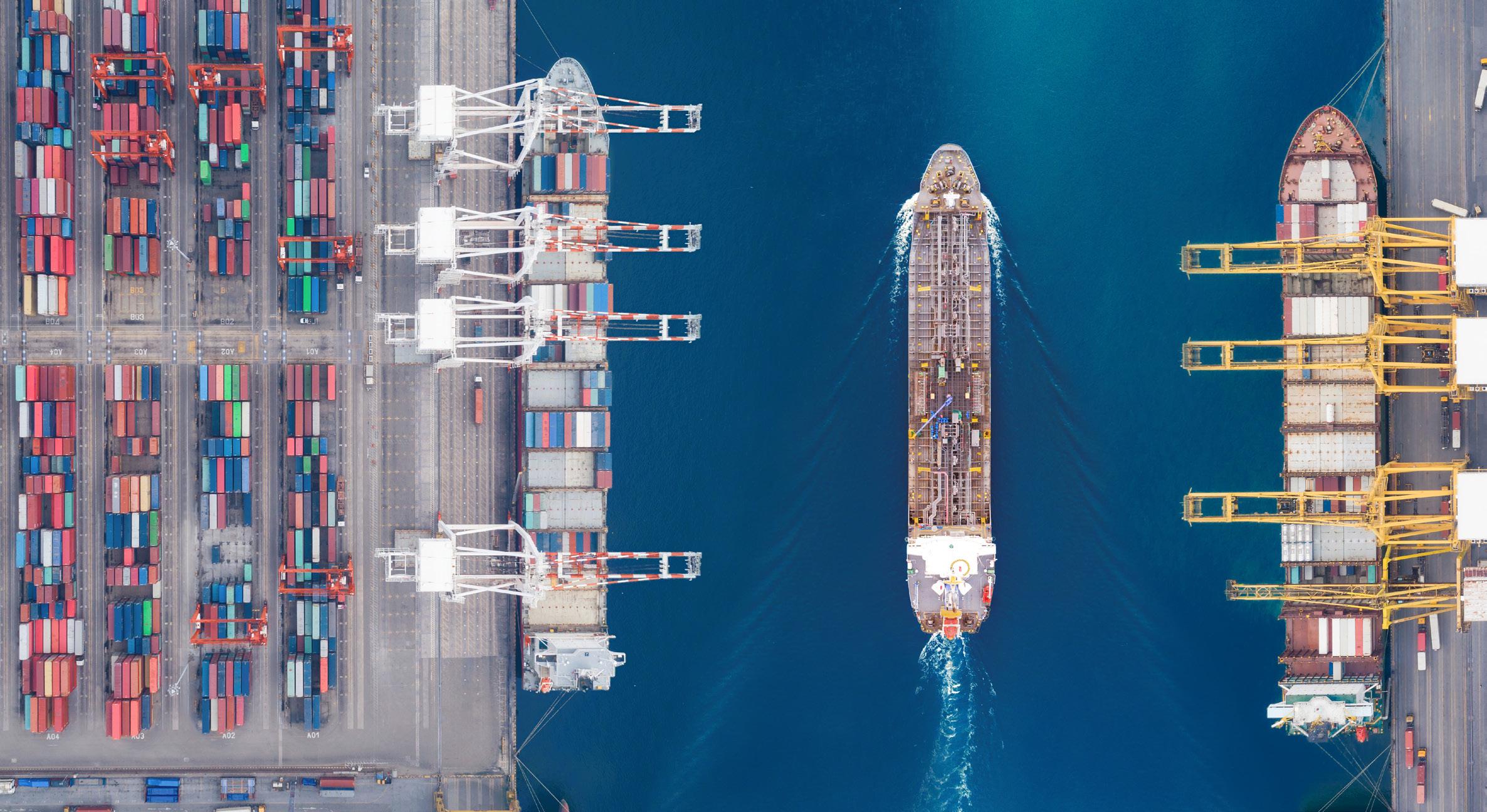
our recognition that trustworthy global economic and security relationships are built on stable supply chains. However, with time come new threats and the need for the WCO to continue its evolution to assist the organisation’s 186 members in keeping that stability.
Previously, the WCO focused on natural disasters and terrorism as the two primary threats to global supply chains. Informed by the Covid-19 pandemic, the WCO is expanding its focus to overall supply chain resiliency, working to ensure that cross-border trade is able to withstand multiple stresses. The WCO developed the ‘WCO Guidelines on Disaster Management and Supply Chain Continuity’. The guidelines assist members with the challenges created by natural disasters and pandemics and two other threats to supply chain continuity: conflict and climate change. These threats require non-traditional responses to disaster recovery and response, and the WCO stands ready to meet the challenge.
Another concern is managing the integration of technology into customs processes while recognising potential impacts on privacy and security. Solutions include a common data exchange language,
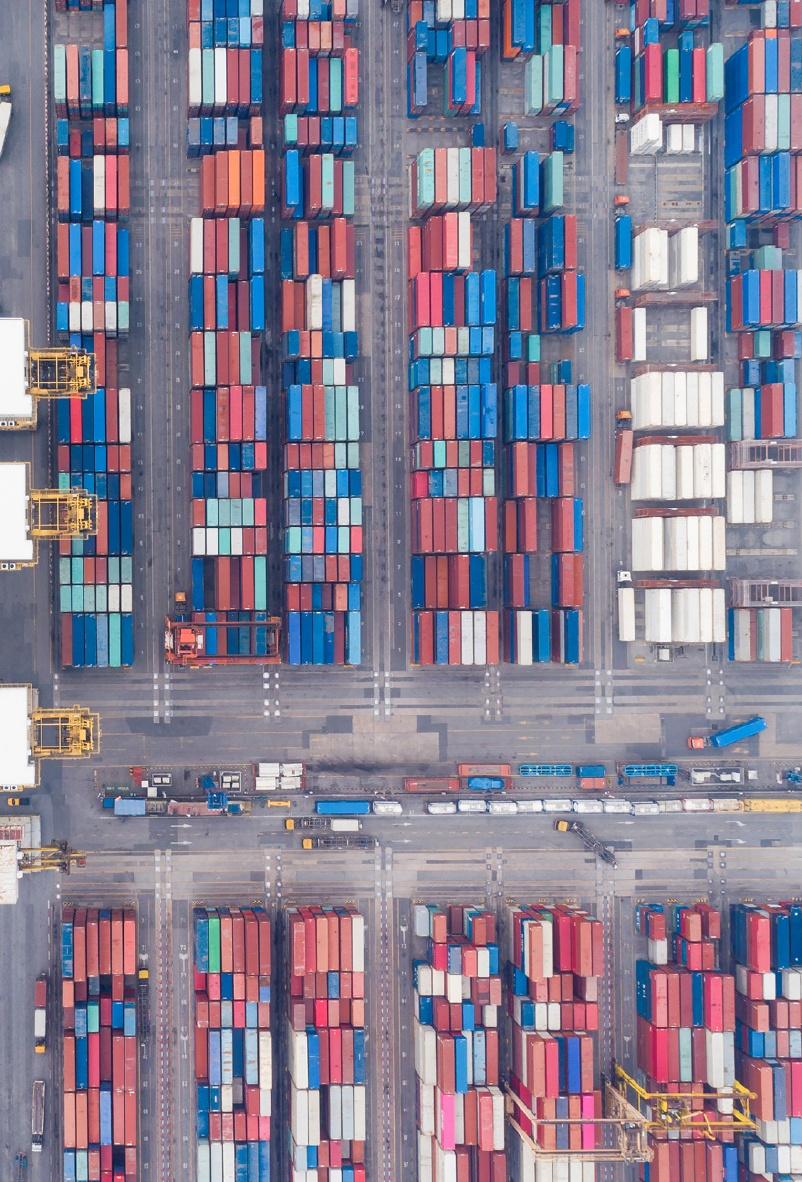
Ian Saunders took office as secretary-general of the World Customs Organization on 1 January 2024. He previously worked as deputy assistant secretary for the Western Hemisphere at the US Department of Commerce and spent most of his career with US Customs and Border Protection, where he held several senior positions including assistant commissioner for international affairs, deputy assistant commissioner for international affairs and acting deputy executive assistant commissioner for operations support, as well as director of international policy and programmes and director of international training and assistance.
X-TWITTER @WCO_OMD wcoomd.org
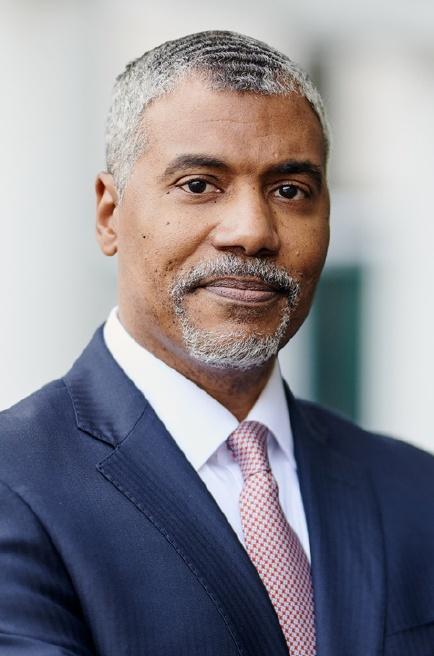
addressing the privacy of data shared between customs administrations and protecting the integrity of the enabling digital infrastructure. The WCO is responding to these issues robustly.
In June 2023, the WCO released its latest version of its data model, born from the G7 data initiative of years past. The WCO Data Model has served as the universal language for cross-border data exchange for 20 years. Not only did the WCO expand the library of data; it has also increased access to the model through
Informed by the Covid-19 pandemic, the WCO is expanding its focus to overall supply chain resiliency, working to ensure that cross-border trade is able to withstand multiple stresses”
creation of the WCO Data Model App, which we provide free to members.
With respect to privacy and security, the WCO takes the long view. Also in June, the WCO Council emphasised the importance of sharing transaction-level data between customs administrations within established privacy and security guidelines. The WCO is raising awareness of data protection measures, including the incorporation of access controls, multi-factor authentication, encryption, routine system updates and vigilant network monitoring. Ensuring members understand the importance of such measures enables their systems and procedures to incorporate better protections for customs data domestically and when exchanged.
Finally, in order to grapple with the explosion of e-commerce, the WCO worked closely with its members and stakeholders to develop the WCO E-commerce Package. The package focuses on managing the financial and security risks of high-volume, low-value small shipments. Facilitating legitimate trade, ensuring fair and efficient revenue collection, and combatting criminal exploitation are all taken into account in the package. It also undergoes periodic reviews so that lessons learned and changes in the environment can be used to refine approaches.
The WCO is committed to building trust in customs so that its members and the societies and economies they serve can rely on trade as a means to achieve resilience and prosperity. Through dialogue, cooperation and action, we are committed to working towards a future in which the customs community helps address the pressing issues of our time. Through diligence and with support, the WCO will continue to position customs as an enabler of economic growth as conditions change and the need for trust remains.
In these times of compounding changes and crises, we are moving towards the brink of what the world can handle. What we need is to redefine the arrangement between government and citizens, and between different groups of the population – and the G7 is well positioned to do just that


We live in times marked by compounding crises and upheavals – geopolitical, environmental, demographic, employment and technological. Each crisis reveals long-standing weaknesses in our prevailing systems and policies. Beneath these fault lines lie structural inequalities that with each disruption push millions of people even further behind. The uncertainty that each crisis provokes deters businesses from investing, prevents economies from creating sufficient jobs, and leaves many workers and their families unsure how to afford the most basic necessities.
The seriousness of the situation is shown by the fact that the number of working poor rose by some 9.4 million workers in 2023 to stand at nearly 20% of the world’s workforce. Income inequality has worsened and major disparities persist between high- and low-income countries. The unemployment rate persisted at 4.5% in 2023 in high-income countries and rose to 5.7% in low-income countries. In 2023, 27.5% of young people in low-income countries (compared to 10.1% in high-income countries) were not in education, employment or training – more than before the pandemic. And labour productivity growth has been on a continuous downward trend: annual productivity growth rates dropped from 2.2% between 2000 and 2014 to 1.5% between 2015 and 2022.
UNEVEN RECOVERY
This uneven recovery from the Covid-19 pandemic and these persistent divides exacerbate vulnerabilities and obstruct paths to social justice. The expectations, norms and collective institutions that stitched together our societies appear to be unravelling. Torn between the imperatives of equity and cost containment, social protection policies cannot keep everyone afloat. Disaffection and loss of trust in national governance are rising. And increasing polarisation within societies is undermining solidarity.
We are moving towards the brink of what our world can handle. In the words of the 1944 Philadelphia Declaration of the International Labour Organization, “poverty anywhere remains a threat to prosperity everywhere”.
Yet today’s compounding crises and transitions also present important opportunities for improved cooperation and social dialogue on prevailing policies and institutional arrangements. These policies and arrangements include the conditions that create
Gilbert Houngbo became director-general of the International Labour Organization in 2022. He was president of the International Fund for Agricultural Development from 2017 to 2022. He previously served as deputy director-general of the ILO where he led field operations in more than 100 countries. From 2008 to 2012, he was prime minister of the Republic of Togo. He has also held numerous leadership positions at the United Nations Development Programme.
X-TWITTER @GHoungbo ilo.org

of the world’s workforce are working poor
% unemployment rate in low-income countries in 2023
opportunities for employment and productive activity. And they concern arrangements for the provision and financing of public services – in education, health and care to name a few – and the respective responsibilities there.
We need ways to reinforce the policies and institutions that make societies inclusive, to direct investment to where the economic and social returns are greatest, and to deliver essential public goods and social protection. And we need ways to restore trust in public institutions through social dialogue, effective and inclusive governance and shared prosperity.
5.7%
In this context, what the world needs is a renewed social contract.
Although it varies across countries and over time, a social contract is essentially an implicit arrangement that defines the relationship between the government and citizens, and among different groups of the population. It reflects a common understanding about how society is organised, the norms and rules that govern how collective institutions operate and resources are distributed, the individual and collective responsibilities in that regard, and the policies that are formulated to achieve social justice.
A social contract for today must enable countries and the global community to find the strength of purpose to tackle the accumulation of grave threats to sustainable and peaceful development and social cohesion that I have described. Such new arrangements need to extend and enhance effective commitments for action. A shared understanding of what could constitute the foundations for a global and, therefore, new social contract will help the international community to construct a strong consensus built on universal values, common concerns and integrated policy approaches.
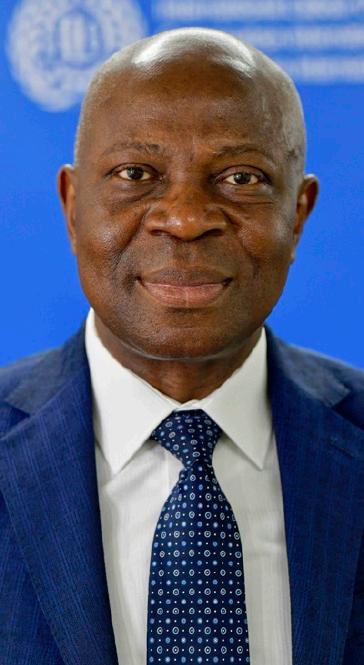
At their summit in Apulia, G7 leaders have the opportunity to significantly influence global economic and employment strategies, including in key and growing areas such as the care economy, skills strategies and the labour market impacts of artificial intelligence. Their commitment to equitable support can catalyse the efforts of countries working towards sustainable and inclusive growth. It can help build the way towards achieving a globally shared perception of the building blocks of a global social contract – including, among other things, the role of the newly forged Global Coalition for Social Justice.
Later this year in New York, governments will meet at the Summit of the Future with the intention to adopt a Pact for the Future. And next year, they will meet at the second World Summit for Social Development – which could become the forum where a renewed social contract can be thoroughly debated and ultimately adopted. In addressing the post-pandemic challenges and promoting inclusive and sustainable structural transitions, we need a global social contract.
A collective and urgent effort is essential. The collaboration of international organisations, national governments and global leaders, all working together through multilateral initiatives such as the G7, can pave the way for a sustainable, just and inclusive future.
Despite consistent attention to gender equality in G7 communiqués since 2001 and many ambitious commitments from G7 leaders, gender inequality persists. Existing disparities are exacerbated by escalating crises such as climate change and conflict, including in Gaza where at least 9,000 women have been killed since October and almost one million women and girls have been displaced from their homes. When the G7 leaders convene in Apulia, the urgency to address these issues is more pronounced than ever. The G7 must act decisively to end the violence in Gaza and mitigate the impacts of ongoing conflicts on women and girls worldwide.
G7 leaders first addressed gender equality in 1990, but did not do so consistently until 2001. Their attention steadily increased from 2013 until 2019. It was entirely absent in 2020 but reappeared at all G7 summits since. Communiqués averaged 863 words on gender equality at each summit, for 6% of the total words from 1975 to 2023.
The most attention came in 2017 and 2018. The 2017 Taormina communiqué contained
Gender inequality persists, and existing disparities are being exacerbated. Only decisive action can mitigate the impacts of global events on women and girls around the world, and the G7 must improve upon its below-average performance in this area
3,888 words (45%) and this increased in 2018 at Charlevoix to 5,086 words (45%), which was the most extensively mainstreamed amount. The 2023 Hiroshima communiqué contained 4,291 words (14%). In 2016 the G7 began releasing standalone documents on gender equality, and issued two in 2018 and three in 2019. They included statements on improving education for women and girls in developing countries and on ending gender-based violence in a digital context, and the Biarritz Partnership on Gender Equality. This practice stopped in 2020.
From 1975 to 2023, the G7 made 428 public, collective, precise, future-oriented, politically binding commitments on gender equality, accounting for almost 6% of the total identified by the G7 Research Group. Most were made between 2015 and 2018. Earlier, most related gender to other subjects at their core, including addressing HIV/ AIDS, improving maternal and child health, and improving educational outcomes for girls in Africa. Gender equality itself became the focus in 2015, with 34 (9%) commitments, 48 (14%) in 2016 and 71 in 2017 (39%). In 2018, at Charlevoix, the G7 made a record 82 (26%) commitments on gender equality. In 2019 this dropped significantly to 17 (24%) and then to zero in 2020. There were 30 (7%) made in 2021 at Cornwall, 32 (6%) in 2022 at Elmau and 53 (8%) in 2023 at Hiroshima.
G7 members averaged 72% compliance with these gender commitments, based on 49 assessments by the G7 Research Group –slightly below the 77% average across all subjects. By December 2023 compliance with the one gender commitment made at Hiroshima in 2023 was 81%.
The gender commitments with the highest compliance focused on health, including improving maternal, newborn and child health outcomes and promoting access to education for girls, and commitments that invoked legal action or the protection of human rights. Commitments with the lowest compliance focused on supporting refugee and internally displaced women and girls affected by conflict and disaster, and commitments on gender-based violence.
The highest compliance came on commitments made in 2021 and 2002 with 100% each, in 2013 with 95%, in 2018 with 93%, in 1996 with 92%, in 2022 with 88% and in 2014 with 86%. The lowest
JULIA KULIKJulia Kulik is director of strategic initiatives and public engagement for the G7 Research Group as well as for the G20 and BRICS Research Groups and the Global Health Diplomacy Program, all based at the University of Toronto. She has written on G7, G20 and BRICS performance, particularly on the issues of gender equality and regional security. Kulik leads the groups’ work on gender, women’s health, higher education and summit performance.
X-TWITTER @juliafkulik www.g7.utoronto.ca

Commitments with the lowest compliance focused on supporting refugee and internally displaced women and girls affected by conflict and disaster, and commitments on gender-based violence”
compliance came with commitments made in 2011 with 45% and in 2016 with 47%.
The highest complying G7 member is Canada at 87%, followed by the United Kingdom at 85% and the European Union at 78%. In the middle are Germany at 86%, the United States at 75% and France at 69%, followed by Japan at 64% and Italy at 50%.
The highest complying summits, averaging 90%, had a high degree of internal G7
institutional support: they coincided with two ministerial meetings on gender equality and the creation of two of the five gender-related official and multi-stakeholder bodies, including the Gender Equality Advisory Council. The lowest complying summits, averaging 62%, came on commitments made in years when only one such ministerial meeting took place.
The highest complying summits also dedicated a larger percentage of their communiqués – on average 16% – to gender equality. This compares to the 12% average for the lowest complying summits.
Core gender commitments average 70% compliance. Gender-related commitments average 75%; those with the highest compliance link gender equality to health, specifically to maternal and newborn health, AIDS, and reproductive health. Commitments with the lowest compliance lack specificity but commit to support gender equality and women’s empowerment broadly.
The presence of compliance catalysts, such as text on how to implement a commitment, generally improves compliance. Gender commitments with embedded catalysts average 75% compliance, while commitments with none average 70%. The catalysts that coincide with the highest compliance refer to an implementation target, a G7 body, invoke legal instruments or mobilise a certain financial amount.
Women and girls bear the brunt of climate impacts, but are rarely engaged in or lead any of the solutions. To improve the balance, UN Women is joining the voices of women around the world to demand radical action on climate – and the G7 can lead the way
As the G7 leaders come together in Italy this year, the challenges facing the global community could scarcely be more daunting. The world is wracked by unprecedented levels of crisis and conflict that demand global, collaborative solutions just when our multilateral institutions are under pressure as never before. Although it is difficult, cooperation is imperative, especially in the area of climate change. The world looks to the G7 for bold leadership, as the planet’s survival hangs in the balance.
UN Women has joined activists from every corner of the world to demand radical action, converging on the call for feminist climate justice. Women and girls bear the brunt of climate impacts. However, women and girls are rarely engaged in or lead any of the solutions put forward. Women’s unequal access to economic resources means that when weather patterns change, and disrupt infrastructure and public services, they are less able to adapt their livelihoods, recover and rebuild. The worst case scenario in UN Women’s latest research has climate change globally pushing up to 158 million more women and girls into poverty, and 236 million more women and girls into food insecurity by 2050. Tension over the distribution of natural resources is a growing source of conflict, one that also affects women and girls the most.
What does feminist climate justice mean in practice, and how can the G7 lead the way?
Central to the response is the reorientation of our economies away from extraction and pollution and towards sustainability, regeneration and care. As countries transition to low-emission economies, women must not be left behind. Women’s progress in accessing decent jobs has stalled in recent decades, so as new jobs are created in green sectors such as renewable energy, women should be first in line for these new jobs, along with training and reskilling as needed for uptake. Governments must also invest in the care economy, a quintessentially green sector. This would relieve women’s burdens of unpaid care work and provide millions of new jobs in health, education and care.
Climate change is already having devastating impacts for many countries in the Global South, especially for the most marginalised women and girls. That is why we need to ramp up climate finance, to support adaptation and resilience building in the face of extreme weather. In 2009, governments agreed to provide $100 billion for countries most vulnerable to climate change. This target has still not been achieved. Most of the finance provided has been through loans that are making countries’ debt problems worse with a fractional amount of
Men occupy almost
of parliamentary seats and only 15% of environment ministers are women
more women and girls will be pushed into poverty by climate change by 2050
158m 236m
more will be pushed into food security by 2050 75%

climate finance reaching women in the Global South.
At this year’s 29th Conference of the Parties to the United Nations Framework Convention on Climate Change in Azerbaijan, governments will negotiate a new goal on climate finance. G7 leaders could play a pivotal role in committing to ambitious targets for climate finance, including for the new Loss and Damage Fund, and to ensuring that finance goes to the countries and women on the frontline of the crisis.
Feminist climate justice demands the representation of diverse women’s voices in environmental decision making, whether in social movements, environmental ministries or climate negotiations. Research shows that from the local level up, where women are represented in decision making, policies on climate change and the environment are stronger. Yet men
occupy almost 75% of parliamentary seats, and only 15% of environment ministers are women. And women often face violent pushback as they defend human rights and ecosystems at the forefront of environmental activism.
Next year, governments will be asked to submit their new nationally determined contributions, outlining the actions they will take to address climate change under the Paris Agreement. This provides a major opportunity to include women’s expertise, especially through the voices of rural, Indigenous and young women, so that the resulting climate action matches their demands and the urgency of the moment.
The climate crisis requires all hands on deck. The G7 has a special responsibility to demonstrate leadership. I ask that it seize this opportunity to advance feminist climate justice, to put women and girls at the heart of climate action and to safeguard a sustainable and equal future for us all and for the next generations.
Feminist climate justice demands the representation of diverse women’s voices in environmental decision making, whether in social movements, environmental ministries or climate negotiations”
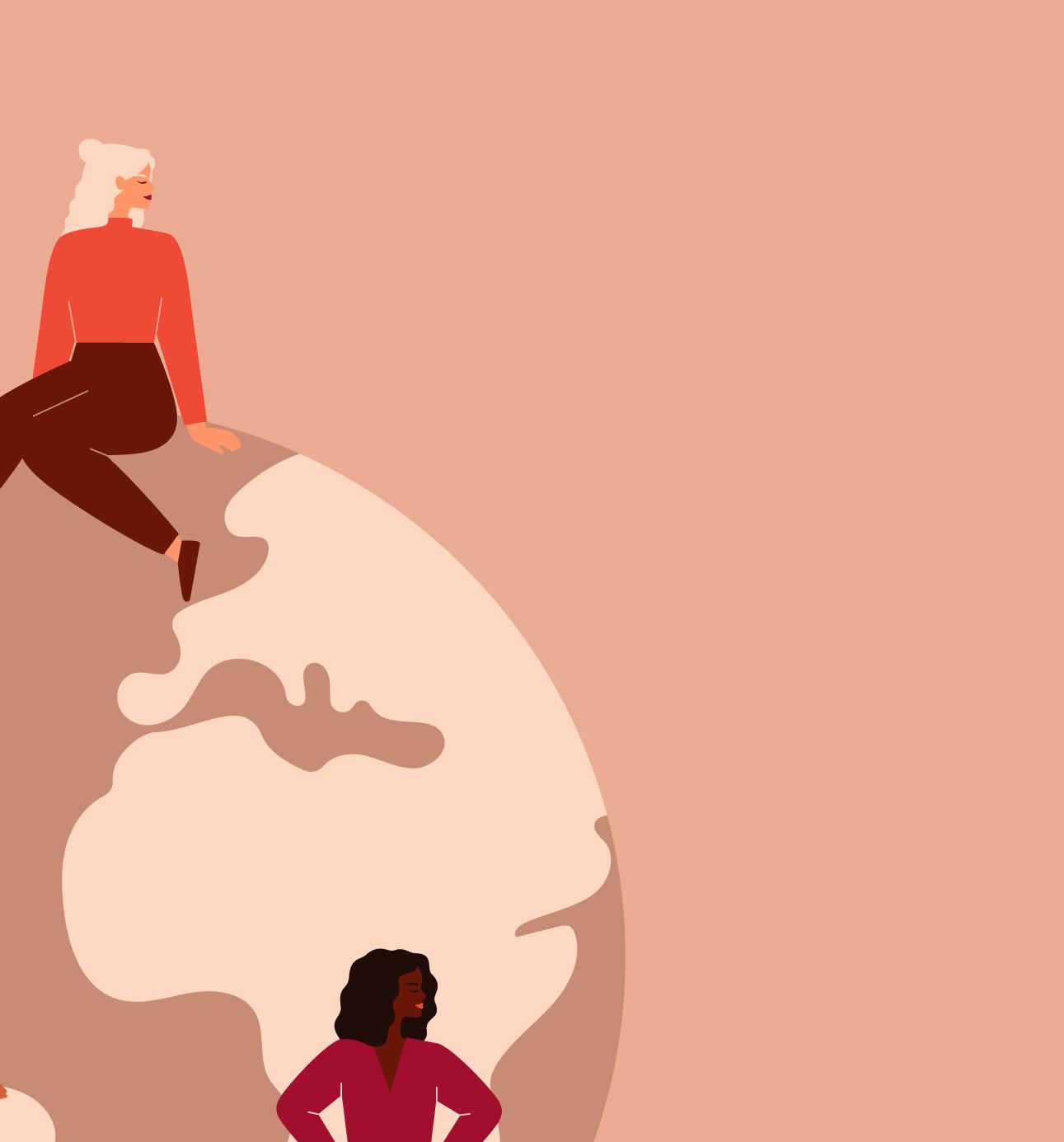
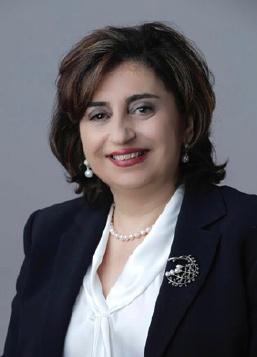
Sima Bahous became UN Women’s executive director and UN under-secretarygeneral in 2021. She most recently served as Jordan’s permanent representative to the United Nations in New York. Previously, she served as assistant administrator and director of the Regional Bureau for Arab States at the United Nations Development Programme and assistant secretary-general and head of the Social Development Sector at the League of Arab States. She has also served in ministerial posts in Jordan and was director of communication for the Royal Hashemite Court.
X-TWITTER @unwomenchief unwomen.org


Investing in tourism should be seen as an opportunity rather than a challenge – and investment in transforming the sector has the potential to deliver significant economic and social dividends
The 2024 Apulia Summit comes as world leaders, including those of the G7 members, face mounting and varied challenges: wars, including conflict in Europe, geopolitical tensions, the climate emergency, and increased inequalities both between and within countries.
At the same time, this vital meeting of the world’s biggest economies – held at the start of the peak season in one of the world’s most popular destinations –comes as the tourism sector consolidates its recovery from the biggest crisis in its history. Without a doubt, tourism is a leading pillar of growth and opportunity. And nowhere is this more apparent than in the G7 economies themselves. In 2023, G7 countries welcomed 338 million international tourist arrivals, an increase of 25% compared to 2022, and 92% of pre-pandemic levels. With one in four of all international tourists visiting these seven
ByG7 country destinations, tourism generated around $490 billion in receipts, again about 96% of pre-pandemic levels.
The challenge we face, however, is to make this return to strength count. That is, to deliver on the unique potential of tourism to deliver sustainable and inclusive growth and opportunity. Certainly, we have a blueprint to follow in the 17 Sustainable Development Goals. They are a clear roadmap for peace and prosperity for people and planet. But, as United Nations secretary-general António Guterres reminds us, “halfway to 2030, that promise is in peril”, with the impact of the Covid-19 pandemic having stalled three decades of steady progress. I remain confident, however, that we can get back on track.
increase in tourist arrivals to G7 countries in 2023 compared to the previous year 25% of all international tourists visit the seven G7 destinations 1 in 4

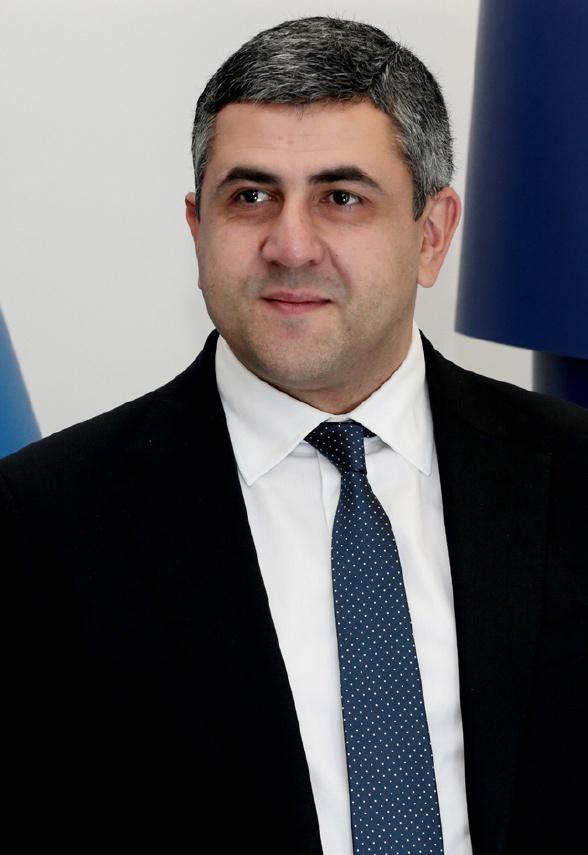
Against the backdrop of heightened insecurity, tourism stands out for its ability to foster understanding among and between peoples”
UN Tourism recognises and is addressing the key challenges standing in the way of ensuring tourism does indeed deliver on its potential. First, we must prioritise education and jobs. We need young people everywhere to see tourism as a valued career path. That means ensuring tourism jobs are decent jobs and giving workers of all backgrounds the skills and knowledge they need to thrive in the sector rather than seeing it as a stepping stone to other things. Last year, we launched our Education Toolkit, a landmark initiative designed to help governments everywhere make tourism a subject in their high schools. Several of our member states have already started to make use of the resource, and its use in the G7 economies would be hugely welcome. At the same time, we are getting ready to welcome the first students into our first bachelor’s degree course in Sustainable Tourism Management, offered in partnership with the Lucerne University of Applied Sciences and Arts. We are supporting tourism workers through every stage of their careers in our sector, from high school to university and then through ongoing professional training, and we urge governments and businesses everywhere to join us.
Alongside this focus on education and jobs, we also urgently need to grow investment in tourism. Our colleagues
at the United Nations Conference on Trade and Development report that foreign direct investment into all sectors, tourism included, reached approximately $1.7 trillion in 2023, a steady 3% increase despite challenging economic circumstances. By increasing the volume going into tourism-related projects, and more significantly directing investments where they will make the biggest difference, we can accelerate our work in transforming the sector and making it both more sustainable and more resilient. At UN Tourism, we serve as the bridge between investors and destinations, including those in Africa, the Americas, and Asia and the Pacific, where for too long a lack of investment has prevented plans from being transformed into reality.
For G7 economies, as well as for countries everywhere, investing in tourism, including in its people, should be seen as an opportunity rather than a challenge. The sector is a proven pillar of employment and growth, and an investment in tourism has the potential to deliver significant economic as well as social dividends. Moreover, against the backdrop of heightened insecurity, tourism stands out for its ability to foster understanding among and between peoples. As we look ahead to World Tourism Day 2024 on 27 September, this year to be celebrated on the theme of ‘Tourism and Peace’, we ask all leaders to join us in embracing and amplifying this message of hope.
Zurab Pololikashvili has been secretary-general of UN Tourism since 2018. He was previously Georgia’s ambassador to Spain, Andorra, Algeria and Morocco and its permanent representative to the United Nations World Tourism Organization up to 2017. He has also served as Georgia’s minister of economic development and deputy foreign minister, among other posts, and has a background in the private sector in the financial and business sectors.
X-TWITTER @pololikashvili unwto.org

Under Italy’s presidency, G7 leaders will address a range of challenges, including climate change, the too many wars and conflicts plaguing our world, and artificial intelligence. These and the many other global challenges on the G7 agenda are too complex for any one country or organisation to solve on its own. Humankind will only find global solutions if we come together, united by a shared vision and common principles and rules.
The Olympic Games can contribute to making this vision a reality – because the Olympic Games is the only event that brings the entire world together in peaceful competition. Olympic athletes send the powerful message that it is indeed possible to compete fiercely against each other and at the same time live peacefully together under one roof.
Guided by the Olympic Agenda reforms, the Olympic Games are serving to advance the Sustainable Development Goals by promoting peace, greater solidarity within and among societies, and partnering to make the world a better place through sport
By Thomas Bach, president, International Olympics CommitteeThe Olympic Games can only make this contribution to a more peaceful world through a fundamental commitment to universality and solidarity. This is why the International Olympics Committee supports all the athletes from all 206 National Olympic Committees and the athletes from the IOC Refugee Olympic Team. Solidarity for us means that in the Olympic Games there is no ‘global south’ or ‘global north’. At the Olympic Games, we are all equal.
But promoting peace is also about improving the lives of people. Here, sport can make a difference: sport is a low-cost, high-impact tool to support all countries to build a more peaceful, more equal and sustainable world for everyone.
The public can take part in events, such as the ‘Marathon Pour Tous’, when 40,000 people will run the same route just hours before the Olympic athletes”
The IOC is strengthening this important enabling role of sport and contributing to the United Nations Sustainable Development Goals. Guided by our Olympic Agenda reforms, we are strengthening collaboration with partners from G7 members and beyond, to advance the SDGs through sport in areas such as peace, health, education, gender equality, climate action and many more. The IOC is also embracing the potential of AI to strengthen the Olympic values of universality and solidarity across the world of sport.
When the Olympic and Paralympic Games Paris 2024 open in just a few weeks’ time, it will showcase a new era of Olympic Games: younger, more inclusive, more urban, more sustainable. These will be the very first Olympic Games inspired by the Olympic Agenda from start to finish.
The slogan ‘Games Wide Open’ is about creating inclusive Olympic Games in all aspects. Spectators will have the opportunity to become participants.
Thomas Bach was elected president of the International Olympics Committee in 2013 and re-elected in 2021. A lawyer by profession, he won a gold medal in fencing at the 1976 Montreal Olympics and was named founding president of the German Olympic Sports Confederation in 2006. He was an athletes’ representative at the 1981 Baden-Baden Olympic Congress and a founding member of the IOC’s Athletes’ Commission. He was appointed to the IOC Executive Board in 1996 and served as an IOC vice-president for over 10 years.
X-TWITTER @iocmedia olympics.com
female, 50% male: for the first time in history, there will be full gender parity at the Olympic Games
renewable energy to be used at the Paris 2024 Olympic Games
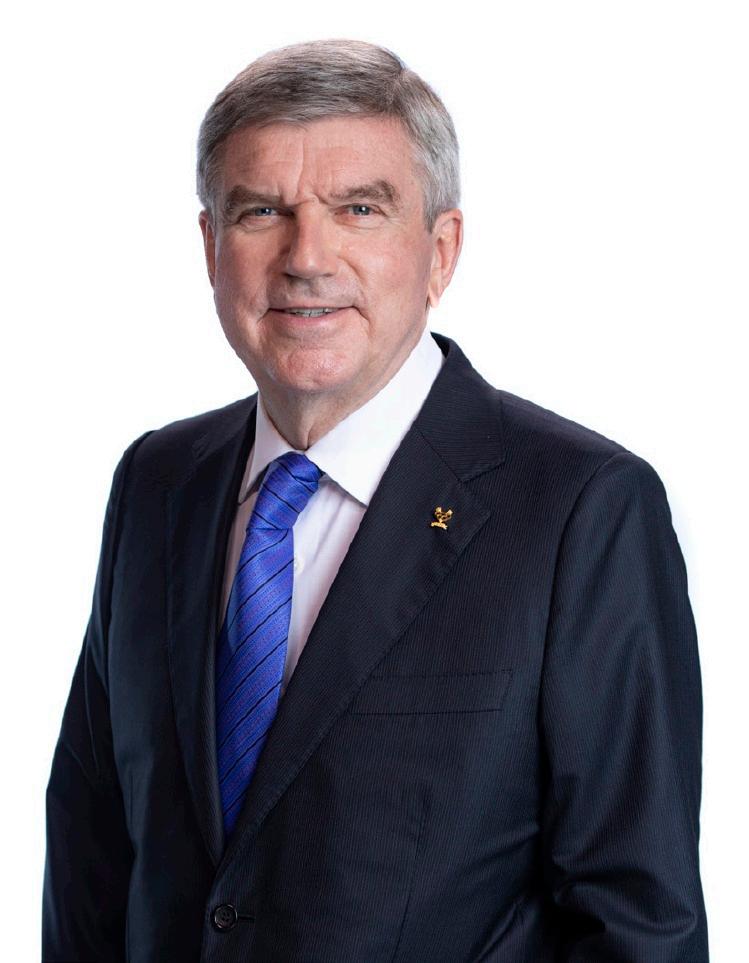
Iconic monuments will be transformed into competition venues, bringing urban sports such as sport climbing, skateboarding or breaking into the heart of the city. The public can take part in events, such as the ‘Marathon Pour Tous’, when 40,000 people will run the same route just hours before the Olympic athletes. Already in 2020, Paris 2024 launched an ambitious programme introducing 30 minutes of daily exercise in primary schools throughout France and is on track to reach 4.2 million children.
Another significant milestone: full gender parity at the Olympic Games for the first time in history. The IOC has allocated exactly 50% of the quota places to female athletes and exactly 50% to male athletes.
When it comes to sustainability, Paris 2024 aims to cut emissions by 50% compared to previous Olympic Games. To achieve this, the games will rely on 100% renewable energy and use 95% existing or temporary venues. With these and other measures, Paris is on track to achieve this ambitious goal six years ahead of the global 2030 target set by the Paris Agreement on Climate Change.
These are just a few examples that illustrate how Paris 2024 will showcase the contribution of sport to building a better world. Two years later, it will be Italy’s turn to showcase our new approach to sustainable winter sport. The Olympic and Paralympic Winter Games Milano Cortina 2026 will pulsate with Italy’s passion for sport and highlight its unique culture and heritage.
We can only make this vision a reality by coming together – by embracing the Olympic motto: Faster, Higher, Stronger –Together. In this Olympic spirit, I extend the hand of the IOC to the G7 leaders to join forces in partnership to make the world a better and more peaceful place through sport.

Artificial intelligence tools with predictive capabilities have the potential to amplify the influence of the G7, more effectively positioning the group to strategically address global challenges
For five decades, the G7 has functioned as a global platform advocating the liberal and democratic values upheld by its members. During this time, its annual summit has produced more than 6,000 commitments to address various challenges, including development, climate change, health and financial regulation. Despite these efforts, historical records show that only 62% of these commitments have been completely fulfilled in the year after they were made. For the G7 to achieve its goals, it is crucial that members adhere to the commitments they make.
The G7 Research Group has collected data on commitment outcomes that make it possible to produce, using artificial intelligence, data-driven estimates of the probability that each G7 member will fulfil commitments made at the summits. The G7 Compliance Simulator is a random forest-based machine learning model that uses historical G7 commitment and compliance performance, details
By Jessica Rapson, senior researcher, G7 Research Groupabout G7 ministerial meetings, economic conditions, the focus of summit commitments, the host country of the summit and specific attributes of the commitments themselves to make reasonably accurate predictions (with 88% accuracy) about how likely G7 members are to meet the commitments made at the summits. It is freely available online. These predictions can enable summit attention to focus on highly important commitments that are at risk of not being fully or adequately met.
In the lead-up to and during G7 summits, leaders often grapple with intricate decisions within tight timeframes. Predictive AI offers real-time decision support by continually analysing the evolving dynamics of discussions and commitments. By forecasting the likelihood of commitment fulfillment for each member, these institutions can optimise resource allocation for maximal impact on global goals. Leveraging the G7 Compliance Simulator enables summit organisers to promptly identify commitments most at risk of non-fulfillment and members with higher likelihoods of non-compliance. This facilitates real-time adjustments
Gender
Trade
Crime and corruption
Democracy
Development
Food and agriculture
Human rights
Nuclear safety
Regional security
UN reform
Education
Terrorism
Climate change
Conflict prevention
Financial regulation
Infrastructure
Labour and employment
Macroeconomics
Migration and refugees
Health
Environment
Nonproliferation
Energy
Social policy
ICT and digitalisation
International cooperation

Jessica Rapson is a senior researcher at the G7 and G20 Research Groups and a Master of Statistical Science candidate at the University of Oxford. She is also a graduate of University of Toronto’s Munk School of Global Affairs and Public Policy. Her work focuses on building statistical models for use in policy analysis and algorithmic governance.
X-TWITTER @g7_rg www.g7.utoronto.ca
during gatherings, allowing leaders to allocate additional discussion and efforts to strategise ways to meet these commitments.
Italy
Japan
France
Canada
Germany
United States
United Kingdom
European Union
Probability of meeting commitments (%)
50%–60%
60%–70%
70%–80%
80%–90%
Table 1 shows the G7 Compliance Simulator’s predictions of outcomes for the Apulia Summit by subject. These predictions are based only on scheduled ministerial meetings and subjects for the commitments, as the specific content of the summit commitments is not available until after the summit itself. On the eve of the summit, commitments on gender are predicted to have the worst outcomes, and commitments on trade, crime and corruption, democracy, development, food and agriculture, human rights, nuclear safety, regional security and reform of the United Nations are predicted to have subpar performance. Similarly, Table 2 shows the G7 Compliance Simulator’s general predictions of outcomes for the Apulia Summit by member. Italy and Japan are predicted to be the least likely to meet their commitments. These predictions are not intended to cast a negative judgement on members deemed
at risk of not fulfilling their commitments. Rather, these assessments rely on historical trends observed in adhering to commitments made at G7 summits. In fact, highlighting members with historically lower compliance rates as at risk might even serve as a catalyst for directing resources to support their improvement.
AI tools with predictive capabilities, like the G7 Compliance Simulator, have the potential to amplify the influence of the G7. By promptly identifying high-risk commitments through real-time prediction of outcomes during summits, these tools enable targeted resource allocation to areas with lower predicted success probabilities. With the integration of predictive AI, G7 summits can be more effectively positioned to address global challenges strategically. Note: The compliance simulator can be accessed at g7-utoronto.ca/shinyapps. io/compliance-tool/. Full data and code are available at github.com/rapsoj/ g7-compliance
The interim compliance score from the 2023 Hiroshima Summit promises a high final compliance score, and the G7 can boost this further with a focus on issues such as health, gender, and labour and employment
G7 leaders last met for their regular summit in May 2023 in Hiroshima, where they made 653 commitments on a variety of issues responding to the most pressing challenges facing the international community. That included strengthening international cooperation within the G7 and with external partners, as diplomatic relations faced the joint challenges of war, economic uncertainty and environmental degradation. As the G7 leaders gather again in Apulia, they will build on this past work.
At Hiroshima, there was a focus on regional security. G7 leaders recognised the need to protect countries’ sovereignty in light of the war against Ukraine, as well as the combined socio-political challenges affecting the global economy due to the ramifications of Russia’s invasion. As such, 10% of Hiroshima’s commitments were on regional security. Leaders also made commitments on energy production
By Samraggi Hazra and Ambra Bisagni, co-chairs, summit studies, G7 Research Group(13% of total commitments) and food security (12%), following the global crisis that emerged from weakened supply chains due to the war.
Another emphasis at Hiroshima was the triple planetary crisis of biodiversity loss, climate change and pollution. Of all the commitments, 8% were on climate change and 7% on the environment. Moreover, with the summit located at the site of the world’s worst nuclear devastation, leaders paid particular attention to the need for
nuclear non-proliferation and nuclear safety, with 4% of commitments.
The G7 Research Group selected 20 priority commitments from the 653 made at the summit to monitor for compliance. This selection was based on the proportion of commitments by subject made at Hiroshima. Two commitments were selected for each subject with the most commitments: energy, regional security, food and agriculture, and climate change. One was selected for

each of the remaining key subjects of nuclear non-proliferation, environment, health, human rights, education, gender equality, labour and employment, digital economy, macroeconomics, crime and corruption, development, and trade.
These 20 commitments were monitored for compliant actions taken beginning the day the Hiroshima Summit ended, on 21 May 2023, until 3 December 2023, halfway to the G7 Apulia Summit, to produce the interim compliance report. Monitoring has continued in order to produce the final report, to be published closer to the Apulia Summit, and cover the full period between the two summits.
By 3 December, average compliance was 91%. Compared to previous years, this was up 6% from the interim score of 85% for both the 2022 Elmau and the 2021 Cornwall summits. The 2023 interim score is also higher than the 90% final compliance score achieved for both Elmau and Cornwall.
By subject, G7 members achieved full compliance (100%) on eight commitments: on emissions reductions policy, official development assistance, education, clean energy technologies and hydrogen markets, food safety and sustainable production, macroeconomics, and non-proliferation. They were followed closely by five commitments each averaging 94%: on the digital economy, environmental conservation, healthy and safe diets, life expectancy and population decline, and sanctions against Russia and its allies.
Towards the middle, four commitments each averaged 81%: domestic climate mitigation measures, gender equality in the labour market, security assistance for Ukraine and resilient global supply chains. Three commitments each received the lowest interim score of 75%: fighting the proliferation of synthetic drugs, combatting forced labour and creating jobs.
By member, the United States received the highest score of 98%, followed by France at 95%. Canada, Germany, the United Kingdom and the European Union followed closely at 93% each. This year’s host, Italy, as well as last year’s host, Japan, both had a score of 83%.
PROSPECTS
Italy’s presidency has identified, as a key pillar for the Apulia Summit, the need to provide development assistance for developing countries for environmental protection, with a particular focus on Africa. This indicates a general trend towards
Italy’s presidency has identified, as a key pillar for the Apulia Summit, the need to provide development assistance for developing countries for environmental protection, with a particular focus on Africa”
Samraggi Hazra is co-chair of summit studies for the G7 Research Group for Italy’s 2024 G7 presidency. She recently completed her bachelor of arts with honours at the University of Toronto, and will be returning to pursue a Juris Doctor degree. She has worked with the Global Governance Program since 2021, as compliance analyst, compliance director and research assistant for both the G7 and G20 Research Groups. She was co-chair of summit studies for the G20 Research Group for India’s 2023 presidency. Samraggi’s research interests lie in international law, transnational business and security and health regulation.
AMBRA BISAGNI
Ambra Bisagni is co-chair of summit studies for the G7 Research Group for Italy’s 2024 G7 presidency. She began working with the G7 Research Group in 2021, serving as a compliance analyst and lead analyst. She is pursuing an honours bachelor of arts with a double major in political science and environmental studies at the University of Toronto. Her research interests include geopolitics, international security, environmental policy and crisis management. X-TWITTER @g7_rg
increased action on development and social issues, also indicated by the full compliance with Hiroshima’s commitments on official development assistance, educational access, and food safety and production. It is thus likely that compliance will increase for the environmental and climate change commitments, as well as those on safe and healthy diets and improved life expectancy.
As was the case for Japan’s 2023 presidency, Italy has also emphasised digital safety as important. The commitment on the digital ecosystem with trust, which already has a high compliance score, will likely also


increase as concerns related to authoritarian breaches of confidential data rise.
Hiroshima’s interim score – much higher than for previous summits – promises a final compliance score that is also higher than in the past. In the final months before the Apulia Summit, the G7 should adhere to the social commitments made last year, as members have already complied more with commitments related to the economy and security. Focusing on commitments on other issues, such as health, gender, and labour and employment, will result in higher final compliance.
The G7 has proven that, despite sharp divides at various points in time, relentless diplomatic work makes a difference – and Italy is determined to go further with its ambitious agenda
Seven years ago, Italy’s G7 Taormina Summit revealed sharp divides across the Atlantic, but also managed to contain them. Donald Trump had been US president for just four months and had already defined the North Atlantic Treaty Organization as “obsolete” (although he had second thoughts a few months later). He also stated that unilateral trade tariffs were legitimate under the ‘America First’ doctrine and called climate change “a hoax”. However, Taormina showed how relentless diplomatic work can make a difference. On international trade, the G7 committed “to keep our markets open and to fight protectionism, while standing firm against all unfair trade practices”. Even the rift on climate change, which threatened to leave the summit without a final declaration for the first time, was resolved through a convoluted statement with the US declaring it was “in the process of reviewing its policies on climate change”, and the other members reaffirming “their strong commitment to swiftly implement the Paris Agreement”. Somehow unity appeared preserved.
This year’s Apulia Summit needs to tell a completely different story – but still one where diplomacy is key. This new world is different for several reasons that go well beyond the presence of a different US president. It will be the 50th annual summit since the first in 1975, and it takes place 10 years after the leaders’ decision to cancel the G8 Sochi Summit due to Russia’s illegal annexation of Crimea. But recent years have been so momentous that the world is barely recognisable – so much so that, although Italy’s G20 Rome Summit in 2021 could still proclaim the
By Antonio Villafranca, director of research, and Matteo Villa, senior research fellow, Italian Institute for International Political Studies
universalistic slogan of “People, Planet, Prosperity”, those days already seem long gone.
Russia’s full-scale invasion of Ukraine in February 2022 has brought security back to centre stage for the G7, and Italy’s ‘European’ G7 (after the ‘Asian’ G7 in Hiroshima last year, and before the ‘North American’ one in Canada in 2025) must face the war that continues to stumble on, where the Kremlin seems to have regained the initiative. Moreover, by mid-June, the Israel-Hamas conflict will have been raging for over eight months, with growing risks of regional escalation in the Middle East. Despite the need to tackle many other issues, and find the lowest common denominator for further actions to be taken in the context of Brazil’s G20 summit in November (and other international gatherings), security will inevitably feature prominently.
Thus, at Apulia G7 leaders will make a show of unity. But beneath the surface, divisions and splits between allies will simmer, albeit a far cry from the Trump era. US president Joe Biden’s decision to support domestic production through the Inflation Reduction Act and the CHIPS and Science Act are still received unfavourably by the European allies. As the US electoral season draws nearer, concessions by the White House appear highly unlikely. So, this unity will probably materialise in the form of an implicit condemnation of unfair trade practices by another country – namely, China.
Italy is shaping the G7 agenda by taking note of the rise of the Global South. Among the government’s priorities, the relationship with developing countries and emerging economies are “central”, as Prime Minister Giorgia Meloni has frequently stated. This is why the Italian presidency has invited (among others) India, Brazil and South Africa: three BRICS countries, and also some of the world’s biggest non-G7 democracies. It remains to be seen, however, whether this will lead to better coordination among the G7, the BRICS and the G20, or whether tensions between the Global North and the Global South – and within the two blocs – will hinder dialogue and progress.
At Apulia G7 leaders will make a show of unity. But beneath the surface, divisions and splits between allies will simmer”

Antonio Villafranca is director of research and co-head of the Europe and Global Governance Centre at the Italian Institute for International Political Studies. He teaches international relations at Bocconi University, where he was also lecturer of European Economic Policies from 2016 to 2018. At ISPI he has coordinated several research projects funded by Italian institutions and by the EU Commission and Parliament. He also served as ISPI Coordinator of Think20 Italy in 2021 and is currently coordinating ISPI’s Think7. He publishes extensively on global and European governance and on EU policies.
Matteo Villa is a senior research fellow at ISPI and co-heads the ISPI Data Lab, monitoring geopolitical and geo-economic trends. He is a co-chair of the T20 Task Force on Global Health and Covid-19, as well as a member of the T20 Task Force on Migration. Formerly, at ISPI, he oversaw the Energy Watch, edited ISPI/Treccani’s Atlante Geopolitico and managed RAstaNEWS, an FP7 EU-wide macroeconomic project. He specialises in global health governance, international migration governance, statistical modelling, European politics and energy issues.
X-TWITTER @ispionline ispionline.it


Finally, Italy is trying to lead in bridging the divide between the West and ‘the rest’, particularly with African countries. Its goal is to include Italy’s Mattei Plan fully in the G7 agenda. The plan was launched in January with a view to enhancing development in Africa in a holistic, structural manner. Italy hopes that all leaders will redouble their efforts towards the continent, avoiding the scenario in which Africa becomes the West’s ‘missing continent’, thus leaving further room for non-Western actors. The Italian government is also eyeing improved partnerships with origin and transit countries in Africa as a means to fight irregular migration, which neared record highs last year. Indeed, the focus on “mutual beneficial partnerships, away from paternalistic or predatory logics”, as Italy describes its Mattei Plan, should be in the G7’s DNA. For decades now, the G7 has explicitly set ambitious targets for development cooperation, periodically lessened the debt burden of poor countries by calling for renegotiations, and pooled (limited) financial resources to tackle climate adaptation and diseases that are endemic in the African continent, such as malaria. Italy’s decision to invite the African Union to the summit and six African countries (including South Africa) is a clear signal of the willingness to seriously engage the continent. As the summit approaches, it is clear that this ambitious agenda will only serve as a footprint for further action down the road. But refocusing the G7 away from the concerns of a ‘leading West’, capitalising on what the Japanese presidency did in 2023 and striving to go further should be welcomed by all.

You may have never met her. But she has always been a part of life. For she is an ancient oasis that has nurtured humanity for well over seven thousand years. Within her incomparable landscape, masterfully carved by time and tool, lies a heart overflowing with generosity.
She brought agriculture to life in desert lands. Bore witness to the dawn of literature. Inspired new artforms to blossom. And welcomed traders from far reaching empires, for millennia. A place where travellers have forever coalesced and convalesced, resting to return to life’s journey renewed.

And now, she is set to revitalise us even more, forever more. Lifting cultures, embracing communities and restoring environments.
And with every stroke of an archaeologist’s brush, she reveals more secrets about human existence. Her precious arts and crafts, once lost in time, are being reborn. The spectacularly modern helps us see the wonderfully old in a new light.
She is… AlUla. Always, and in all ways, revitalising.




